- All Destinations
- Bustling Cities
- Beautiful Towns
- Charming Villages
- Culinary Experiences
- Historical Monuments
- Zoos, Parks and Aquariums
- Image Gallery
- Comparative Analyses
- Hiking Time Calculator
- Travel Information
- Frequently Asked Questions
- Affiliate Disclaimer
- Favorite Resources
- Privacy Policy

Zurich vs. Geneva: Which City is Better to Visit?
- January 2, 2023 April 10, 2024
Last Updated on April 10, 2024 by Admin
When it comes to planning a European trip and preferring to see cities rather than hiking the Alps, these two options – Zurich and Geneva – are among the most talked-about. My recommendation would always be to visit the Swiss Alps, as they are without a doubt the crown jewel of Switzerland. However, not everyone is eager or intends to visit those mountains.

In terms of population, Zurich and Geneva are Switzerland’s two biggest cities. These two cities are both well-known around the world. They are among Switzerland’s liveliest, busiest cities, full of restaurants, hotels, and tourists from around the world. However, if you were to decide which city to visit in Switzerland, which would you choose? Would you pick the German-speaking city of Zurich? Or the French-speaking city of Geneva?
In this article, we will examine Zurich and Geneva in order to determine which city you should visit during your visit to Switzerland. So, without further ado, let’s jump right in. Is it better to visit Zurich or Geneva, Switzerland?
Overview: Zurich vs. Geneva
The key differences between Zurich and Geneva are as follows:
Cities: Zurich vs. Geneva
Zurich city – switzerland’s financial hub.

Zurich is Switzerland’s largest city and primary financial center. It has plenty of quiet, green spaces amidst historical monuments, a charming old town, a lake, and a river. Zurich offers a lot to visitors, including museums , trips to the mountains , gardens, a zoo, shopping, and more.
Zurich is located in north-central Switzerland. It is also the country’s hub for rail, road, and air traffic. Its main railway station is the busiest and largest in the country. If you are coming from abroad, you are likely to go through Zurich instead of Geneva.
Geneva City – An International City

Zurich’s counterpart on the French side of Switzerland is Geneva . On the shores of Lake Geneva , it is the second-most populous country in Switzerland and the most populous in the French-speaking part of the country.
A global city, Geneva is home to numerous international organizations such as the United Nations and the Red Cross. The city is also a major financial center , ranking fifth in Europe after London, Zurich, Frankfurt, and Luxembourg.
I think visiting either place will be a good experience as both have plenty of hotels, restaurants, museums, and things to do. Zurich will have a fast, efficient, and business-like feel due to its importance as a financial center. On the other hand, Geneva will be similar but with a more international flavor. Zurich is more of a Swiss-German city, while Geneva is a world city.
Zurich is better to visit compared to Geneva for families with children (to visit Zurich Zoo or Technorama for example). The city is also ideal for young, active adults looking for adventure. If you intend to visit Graubünden or the Bernese Oberland later, Zurich will also be a more convenient option logistically.
Geneva will be a better choice compared to Zurich for visitors and couples looking to relax . It boasts a lovely, relaxing setting on Lake Geneva , close to Vevey and Montreux , as well as spectacular views of the Swiss Alps. The Lavaux Wine Terraces, for example, is also a good place to visit while in Geneva. Moreover, if you plan to visit the Valais region afterward, Geneva will be a better choice.
My opinion: I find Geneva and the region around Lake Geneva to be more beautiful than Zurich and its surroundings. In the surrounding area of Zurich, you tend to find mainly residential homes and apartments used by people working there. In contrast, Geneva and its surrounding area have a lot more touristy places to visit, such as Montreux , Lausanne , and Vevey . Furthermore, I also find the Lake Geneva region has better views of the Alps compared to Lake Zurich. For a similar view, you will need to travel around an hour or two from Zurich to either Lucerne or Glarus . Zurich does, however, tend to be the most convenient city to stay in since it is home to the country’s largest airport . The city of Zurich is also very cosmopolitan and offers many restaurants and hotels.
Advantages of Zurich
- Ideal for families with young children. You can visit the Zurich Zoo or Technorama .
- Ideal for young adults who are into adventure, shopping, and nightlife. You can head to Interlaken for more active pursuits later.
- Ideal for those who will proceed to Graubünden ( Engadine region , Flims Laax Falera, Arosa Lenzerheide, Davos).
- Ideal for those who will proceed to the Jungfrau Region ( Wengen , Mürren , Grindelwald ).
Advantages of Geneva
- Ideal for couples looking to relax. Montreux is a well-known spa resort and the Lavaux Vineyards are always pleasant to visit.
- Ideal for those who will proceed to Valais later (Zermatt, Saas-Fee, Crans-Montana, Grimentz-Zinal).
- Ideal for those who prefer a more International City.
Things to do: Zurich vs. Geneva
Things to do in zurich.

While there are many things to do and places to visit in Zurich , we have provided some of the highlights of this city below:
- Visit the Grossmünster and Fraumünster Churches – two beautiful churches located right in the middle of Zurich. These are both easily accessible on foot from the train station. The churches have been witness to Zurich’s reformation period from the Middle Ages onwards.
- Cruise the Limmat River or Lake Zurich – In case you want to reminisce about times past, there are paddle steamers that cruise Lake Zurich. Alternatively, you can take a short cruise on the Limmat River to go from one side of the city to the other.
- Take the Polybahn up to the Polyterasse – To get good views of the city of Zurich, simply take the Polybahn up to the Polyterasse near the University of Zurich and ETH. Alternatively, if you prefer a higher view, you can take the train up to Uetliberg . Upon reaching the top, you will see a panoramic view of Greater Zurich. Both are very easy to get to and can be accomplished in a few hours even if you don’t have much time.
- Explore the museums – Zurich has many museums, some of which are free to visit . However, I believe that the Landesmuseum is one of the best museums in the city. It is a castle-like museum located directly in front of the Zurich train station. Several permanent exhibits provide insight into Swiss culture. They also have changing collections. Another interesting museum is the WOW museum , in which you can see illusions. If you want to check out the science museum, head over to Technorama . While it’s not too close to the city center, it’s still worth a visit.
- Shopping – We have to mention shopping. Check out the Bahnhofstrasse which is the main street in Zurich. Here you can find watch shops, clothes, chocolates, and more.
Find out what else there is to do in Zurich on GetYourGuide.com .
Things to do in Geneva

While there are many things to do and places to visit in Geneva , we have provided some of the highlights of this city below:
- Visit St. Pierre Cathedral – built from 1160 to 1252, this beautiful cathedral was built and used by John Calvin, one of the leaders of the Protestant Reformation. It is regarded as one of Geneva’s most important landmarks.
- Get to know Geneva’s Old Town – Geneva’s Old Town is its historic center. Not only will you find Saint Peter’s Cathedral, but also the Bastion Park, the Reformation Wall, the Place du Bourg-de-Four, The Treille Promenade, and more.
- It is indeed possible to stroll along Lake Geneva or cruise on it – the largest lake in Switzerland is indeed a place where you can swim in summer, cruise on the boat, or simply stroll nearby. Visit one of Geneva’s landmarks – the water jet called Jet d’Eau . Bains des Pâquis is also nearby.
- Explore the museums – Like Zurich, Geneva also has its fair share of museums. Maison Tavel stands out as an example of medieval civil architecture. There is also the Ariana Museum , which has ancient artifacts, glass, and ceramics. Alternatively, if you are interested in learning more about watches, there is a Patek Philippe Museum . For those who want to explore a bit further, or for those with young children, there is the Aquatis Aquarium-Vivarium in Lausanne.
- Enjoy a walk in one of the parks – The two parks worth mentioning are Parc de la Grange and Parc des Eaux-Vives . These parks have well-tended flower beds, and it’s always a pleasure to walk through them. Come see the flowers when they are blooming.
- Discover the United Nations Building – The Palace of Nations is definitely worth a visit if you want to discover one of the most important diplomatic centers in the world. Tours are available upon request. The nearby Ariana Park is also worth a visit.
Find out what else there is to do in Geneva on GetYourGuide.com .
Hotels: Zurich vs. Geneva
With Zurich and Geneva being two of the biggest cities in the country, you’ll find hotels for every budget. These are the hotels we recommend.

Hotels in Zurich
- Storchen Zürich – Lifestyle Boutique Hotel (5-star) – Located in the heart of Zurich, this boutique hotel even has a boat stop in front of its doors. The hotel is within walking distance of the city’s most popular attractions, including Grossmünster Church, Fraumünster Church, Limmat River, and Lake Zurich. In the summer, enjoy breathtaking views of the Limmat River and Grossmünster Church from the picturesque terrace. The hotel’s classic and modern rooms and suites offer unique views of the picturesque Old Town.
- Dolder Grand Hotel (5-star) – This fantastic hotel is located on the Zürichberg hill overlooking Zurich. Located next to a Cog Railway Station, Dolder Grand has 2 outstanding restaurants, an exclusive spa, fitness facilities, and superior service.
- B2 Hotel Zurich (4-star) – One of the cool things about this hotel is its public thermal bath and spa, which features different swimming pools, a wellness area, and a steam bath, right in the heart of Zurich. In addition to that, it’s located in an old brewery.
- Hotel Schweizerhof Zurich (4-star) – A short walk from Zurich’s main train station, this hotel is a great choice for people who want something stylish and convenient. Schweizerhof Zurich has noise-proof rooms, a great location, and free access to Holmes Place Fitness & Spa next door.
- citizenM Zurich (4-star) – Located in a great location with a fantastic lounge offering free Wi-Fi, this hotel is a fantastic value for money. This modern hotel in the center of Zurich offers friendly service and the quality you would expect from a CitizenM hotel.
- Motel One Zurich (3-star) – I’d highly recommend Motel One to anyone looking for something more inexpensive. Having stayed at Motel One Basel, I am 100% sure that the Motel One hotel in Zurich is just as nice, clean, and affordable. Plus, it’s incredibly close to the train station, Grossmünster, and the heart of the city.
Hotels in Geneva
- Four Seasons Hotel des Bergues Geneva (5-star) – Set in a historic building from 1834, Four Seasons is one of the best hotels in Geneva. You can’t go wrong with this hotel with its elegant interiors, fine dining restaurant, indoor infinity pool, spa, business services, and multi-lingual concierge.
- Beau-Rivage Genève (5-star) – With its panoramic views of the lake and Mont Blanc, this elegant 5-star hotel is right on Lake Geneva. Cornavin Train Station is just a five-minute walk away. This hotel has a highly-rated French restaurant called Le Chat Botté. There is a 24-hour front desk, fitness center, concierge service, a business center, and more.
- Hotel Bristol (4-star superior) – Between Geneva’s train station and the lake, this 4-star superior hotel Hotel Bristol makes a great choice for tourists. This hotel has a wonderful spa area with saunas, a hot tub, and a hammam. Besides that, it’s got a great restaurant called Côté Square.
- citizenM Geneva (4-star) – citizenM Geneva is close to some main attractions, including St. Pierre Cathedral , Jet d’Eau , the Flower Clock, and Geneva Town Hall. The hotel has air-conditioned rooms, a restaurant, and a bar, too.
- Hotel Bernina Geneva (3-star) – Located opposite Geneva’s train station, the Hotel Bernina Geneva is a convenient 3-star superior hotel with clean, modern rooms.
- MEININGER Geneve Centre Charmilles (Hostel) – Although this hostel isn’t in the center of the city, it’s well connected, so you can easily get to all the sights. With 24-hour reception, free WiFi, luggage storage, a washing machine, a dryer, a kitchen, a bar, and a game zone, you’ve got everything you need for your stay in Geneva.
Summary: Zurich vs. Geneva
Which city you choose will be determined by your needs and wants, as I mentioned. It is generally easier to reach and worth traveling to Zurich first because of its role as an international hub. Geneva may look more relaxing and scenic, but Zurich still can be a worthwhile stopover before going to either the Jungfrau region in the Bernese Oberland or the Bernina region in the Engadine.
If you have already been to Zurich and the other areas mentioned, you can also travel via Geneva . In addition to Geneva, you can also explore the nearby towns of Lausanne , Vevey , and Montreux . And you will be closer to the high alpine setting of Valais.
I hope we were able to assist you in making your decision. No matter what you decide, we hope you enjoy your stay in Switzerland.
* Disclosure: By clicking on our affiliate links, you may support TouringSwitzerland.com while incurring no additional costs. We appreciate your support!
Related Posts: Zurich
- Closest Mountains To Visit From Zurich
- 25 Best Things To Do In Zurich, Switzerland
- 12 Best Unique Experiences In Zurich
- 10 Best Free Museums and Parks in Zurich
- Top 8 Things to Do in Zurich on a Rainy Day
- Complete List Of Museums in Zurich Open On Mondays
- Landesmuseum Zurich: The Most Popular Swiss National Museum
- WOW Museum Zurich – Is It Worth Visiting?
- Zurich to Geneva Train: All You Need to Know
- Closest Ski Resorts To Zurich Airport
- The Best Views in Zurich: A Guide to Uetliberg Mountain
Related Posts: Geneva
- How to Spend 1 Day in Geneva, Switzerland
- Closest Mountains To Geneva in Switzerland
- 9 Beautiful Towns Near Geneva, Switzerland
- 8 Best Things to Do in Geneva on a Rainy Day
- 8 Best Places on Lake Geneva
- Musée Ariana, Geneva: 8 Things That Make You Love It
Darla is the owner of TouringSwitzerland.com. Her home is in the German-speaking part of Switzerland. Having lived almost 20 years in Switzerland, she's traveled extensively all over the country. Darla's favorite regions to visit in Switzerland include Engadin, Lake Geneva, Bernese Oberland, Ticino, and Valais. She loves spending time with her family, hiking, visiting museums, and reading books.
- Niederdorf Village in Zurich
- Wildpark Roggenhausen Aarau: What to Expect
- Switzerland on a Budget: 10 Tips for Affordable Travel
- Lej da Gravatscha: Discover Samedan’s Serene Escape
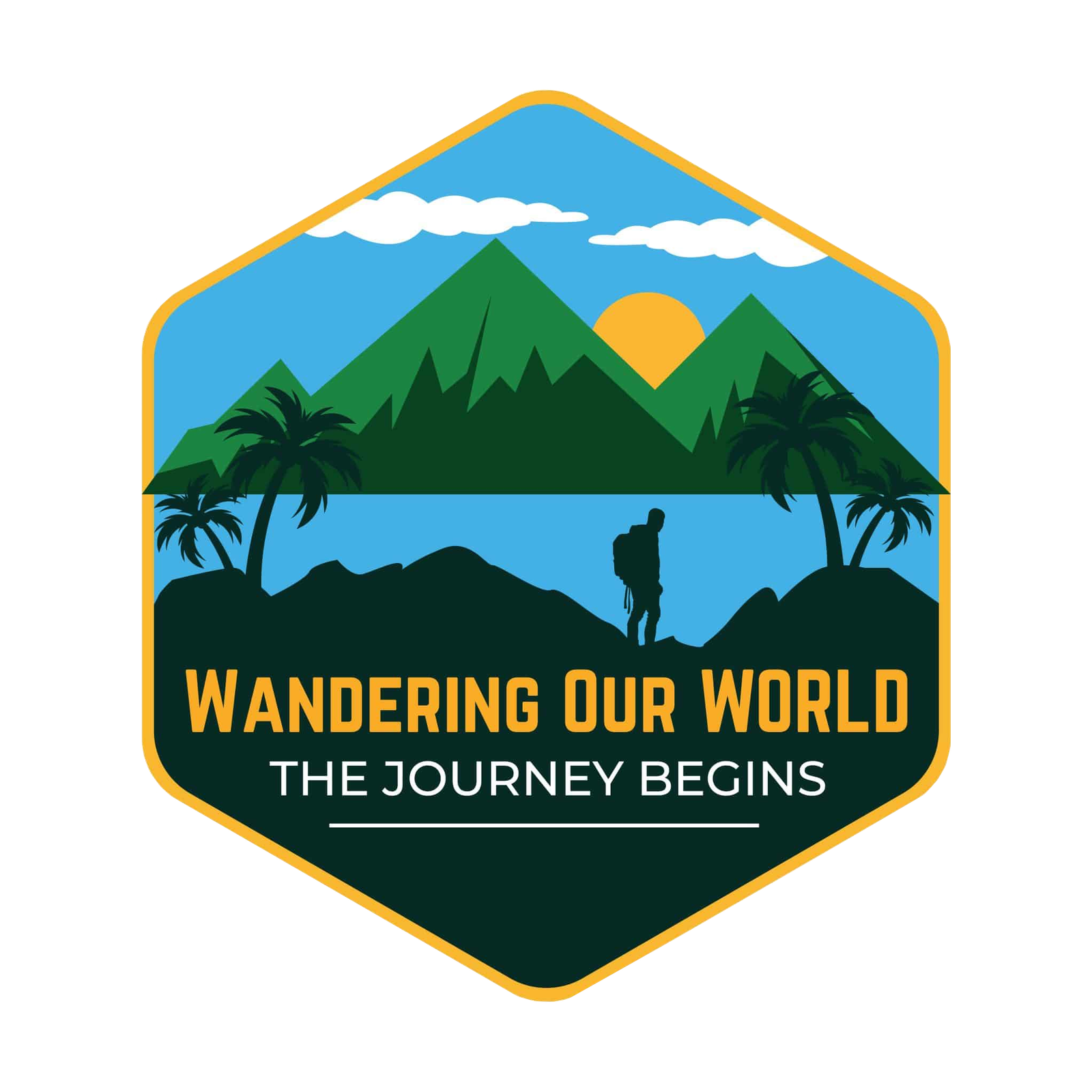
Geneva vs Zurich: An Honest Comparison To Help You Choose!
P lanning a trip to Switzerland? If so, Geneva and Zurich are two of the top cities you have to consider. Boasting gorgeous surrounding landscapes of lakes and mountains, along with interesting museums and fascinating attractions, these cities both have plenty to offer.
Ideally, you might like to visit both of them during your time in Switzerland. However, with Zurich and Geneva being quite far apart and in different areas of the country, it’s not always easy to get from one to the other, especially if you’re only staying for a short time.
So, if you’re only able to visit one, which city should you choose? Well, it’s not an easy choice! Both of these locations can boast of fantastic museums, fabulous architecture, delicious food, and excellent outdoor activities, too.
However, there are some key differences between them…
Geneva, for instance, is often regarded as more of a cosmopolitan, international city, due to the presence of the European Union and United Nations, and people from around 190 different countries living and working in the city.
Zurich, meanwhile, offers more of a traditional Swiss experience. It’s also regarded as a livelier and busier place, with a dynamic nightlife scene, great shopping districts, and more of those big city vibes that may be a little lacking in Geneva.
Of course, we can’t simply sum up all of the differences between these two cities in just a couple of paragraphs.
So, in the guide below, we’ll see how Geneva and Zurich compare in many key categories, from accessibility and affordability to attractions and gastronomy. All so you can make the right vacation decision!
- A Quick Overview
Which Is Best For Activities?
Which is better for day trips , which is better for nightlife , which is best for hiking , which is best for shopping , which has the best food .
- Which Is Better For A Family Trip?
- Which Is Better For Couples & Honeymoons?
Which Is Better For Backpackers?
Which is cheaper , where to stay according to your budget, which is easier to get to.
- Which Is Easier To Get Around?
- Which Is The Better Choice?

A Quick Overview: Geneva vs Zurich
Geneva: a quick overview.
Geneva is a large city in the southwest corner of Switzerland, very close to the border with France.
Home to more than 200,000 people, and with over 500,000 in the full Canton of Geneva, this is the second most populous city in the nation and by far the largest city in the French-speaking Romandy region.
The city of Geneva has a long and interesting past, dating all the way back to the days of Ancient Rome.
But in the modern era, Geneva is best-known as one of the world’s leading global cities, being home to the European United Nations and the Red Cross. In fact, the city of Geneva holds the record for hosting the greatest number of international organizations.
The multinational nature of Geneva makes it a very unique European city, with people from an estimated 190 countries living here.
Because of this, Geneva is a real melting pot of ideas, influences, and languages – French might be the official primary language here, but you can hear everything from English to Japanese as you make your way along the streets.
Geneva, or Geneve to the locals, is also known for being situated right beside Lake Geneva – the biggest lake in the Alps and one of the largest in all of Western Europe.
As well as spending time on the lake itself, visitors to this can enjoy a range of museums and extraordinary landmarks, from the Palais des Nations to CERN.

Zurich: A Quick Overview
Zurich is the biggest city in Switzerland, and is situated in the northern-central part of the country, in the Zurich region.
With a population of around 443,000 people in the city itself and over 1.8 million in the larger metropolitan area, Zurich is a much larger city than Geneva, and this is felt in its streets, which tend to feel livelier, busier, and more hectic.
The history of human settlement in this area goes back thousands of years, and in modern times, Zurich has been ranked as one of the best cities on the planet in terms of quality of life.
It’s a key financial and cultural center for Switzerland, and, unlike Geneva with its international atmosphere, Zurich is distinctly Swiss, offering very traditional experiences for visitors.
Vibrant, alive, and exciting, Zurich is also increasingly regarded as a hip and trendy travel destination, filled with intriguing art galleries and vibrant nightlife.
It blends the old and the new – one moment, you can be admiring the 13th century Fraumunster church, and the next, you can hit up the bars in the post-industrial Kreis 5 district.
Like Geneva, Zurich is also situated beside a lake – it’s at the northwestern end of Lake Zurich, which is famed for its immensely clean waters.
Popular activities here include swimming in the lake, as well as touring Zurich’s old town, or Aldstadt district, which is where many of the city’s prettiest buildings, oldest churches, and most interesting landmarks may be found.

Next, let’s take a look at some of the many activities you can enjoy during your stay in either Geneva or Zurich.
There are some similarities here, such as the presence of museums, galleries, and lake-based activities in both cities, but there are also some interesting differences which could make one city more appealing to you than the other.
Geneva: The Activities
In Geneva, one of the best places to start your exploration is in the Old Town. It’s the most scenic part of the city, with some striking old buildings and landmarks, like the gorgeous Saint-Pierre Cathedral.
There are also lots of charming cafes and indie boutiques in this area for dining and shopping, and it’s a great place to get a real feel for Geneva’s historic heart.
As well as its historic side, Geneva has many important modern landmarks and buildings that are worth passing by, like the Palais des Nations, which is the home of the UN in Europe.
Guided tours of this building are available to teach you all about the UN’s role in helping to maintain peace around the globe.
CERN, one of the world’s most famous scientific research centers and home of the Large Hadron Collider, is also open to visitors.
While Geneva has many fascinating museums, from the Natural History Museum to the Musée Ariana, which has an extensive collection of ceramics and glass artworks.
Of course, no visit to Geneva can be complete without spending at least a little time at the lake. There are several attractions and landmarks around the shore, like the English Gardens and Outdoor Baths, as well as the Jet D’Eau fountain.
You can even find sandy beaches in the city, like the Bains des Paquis, or get onto the water itself with a romantic cruise or family boat ride.
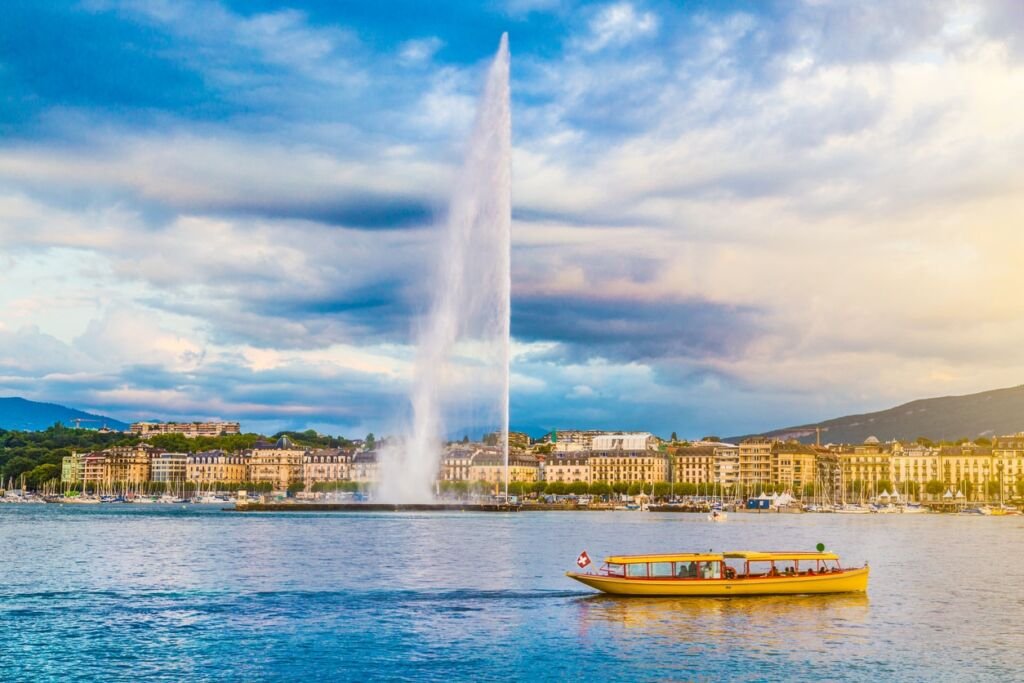
Zurich: The Activities
Just like Geneva, Zurich has a beautiful Old Town area to check out.
There are lots of pretty churches in this part of the city, like the famed Fraumunster, the Romanesque Grossmunster, and the Gothic Predigerkirche.
While here, be sure to check out the Niederdorf, home of galleries, restaurants, and fancy boutiques.
Zurich also has many museums and galleries. The Swiss Natural Museum, or Landesmuseum, is one of the best in the country, filled with artworks and artifacts that convey the stories of Switzerland’s past.
Meanwhile the Zurich Museum of Art is one of Europe’s leading Classic Modern Art galleries, with works from a multitude of masters, including Picasso and Munch.
For something a little different, Zurich has museums focused on Native American cultures, soccer, and trams, as well as the experimental ‘No Show Museum’, which is dedicated to nothing at all.
Other attractions include the gorgeous Chinese Garden, a zoo with more than 2,000 animals, and the 2,667 foot Uetliberg hill, boasting magical panoramic views.
Zurich also has plenty of outdoor activities for visitors to enjoy around its lake. There are cycling and hiking trails along the shore, for instance, as well as boat rides or companies that will rent out paddleboards and kayaks.
There are also a couple of lakeside beaches, mostly made up of grassy and rocky spots where you can sunbathe or swim in the clean waters.
Overall, there’s a whole lot to do in both Geneva and Zurich, and you can spend similar amounts of time in both cities, with lots of museums, lake activities, and other fun things to keep you entertained.
Geneva is ideal for those looking for something special, with unique locations like CERN and the UN headquarters, while Zurich provides a more traditional Swiss experiences.

Even though there are lots of things to do in both Geneva and Zurich, you might like to spend a day or two outside these cities to explore more of Switzerland or even cross over the border into a neighboring European country.
From Geneva, if you want to stay in Switzerland, one of the best day trips is to the nearby city of Lausanne.
Situated on Lake Geneva’s northern shore, this city is famous for its sporting culture – it’s home of the Olympic Committee HQ, along with a large Olympic Museum. Cycling and mountaineering are popular here, along with local vineyard tours.
However, since Geneva is so close to several international borders, it arguably makes more sense to leave Switzerland entirely for day trip adventures.
You can head into France to the food capital of Lyon or the winter sports hub of Grenoble, for instance, or venture into Italy to visit lively shopping hubs, like Turin and Milan .
From Zurich, you can visit local Swiss towns and cities, like the charming Winterthur, with its beautiful rose gardens, or Lucerne, which is famed for its medieval architecture. The historic border haven of Basel is another terrific city for day trips, home to museums and family attractions.
You can also plan international adventures from Zurich. It’s possible to head east into the small, charming nation of Liechtenstein, or cross the border into Germany to visit pretty lake cities, like Konstanz.
You can even make the trip into France and see Strasbourg, a town that almost seems to have been plucked from a fairy story – it’s around 2.5 hours away by car or train.
Overall, it’s tough to call any kind of winner in this category, as there are so many pretty places within easy reach of both Geneva and Zurich.
Zurich is probably a little better overall for seeing more of Switzerland, while Geneva is particularly well-placed for trips into France.

Clearly, Zurich and Geneva both have plenty of fun activities and attractions to keep you entertained each day, but what about the night? How do these two cities compare in terms of nightlife locations, like bars, clubs, and entertainment venues?
Well, Zurich definitely stands out as the winner of this category – in fact, it’s the best nightlife location in the whole of Switzerland.
There are lots of great places to spend an evening in Zurich, with cult bars that have been around for years lining the streets of the Langstrasse quarter, which is the city’s main entertainment area.
The Kreis 5 district, also known as Zurich-West, is also an emerging nightlife hub. Once a relatively grimy part of the city, filled with old factories and warehouses, Zurich-West has undergone extraordinary development in recent times and is now home to craft pubs, cocktail hotspots, and dance music discos.
Over in Geneva, there’s still a nightlife scene, but it’s a far cry from the vibrant excitement of Zurich. But you’ll find some quirky nightclubs in the Carouge area of the city, specially along the Rue Vartier.
Medicine Street is another good spot for bars, and usually attracts the city’s student population, with a long list of fun places to grab a drink and mingle with locals or other tourists.
One of the downsides of Geneva’s nightlife scene is that the local public transit services tend to shut down around midnight, making it hard to get around.
There are some additional late-night services on Fridays and Saturdays, but if you want to party or grab a few drinks during the week, you may need to spend some extra cash on a taxi to return to your hotel.

You won’t be able to do too much hiking within the cities of Geneva and Zurich. However, since these cities are both located beside lakes and mountains, there are some excellent hiking and trekking opportunities in the nearby areas.
Geneva has a nice mixture of hikes to suit all ability levels. Lake Geneva, for example, has pleasant and well-maintained paths you can follow along the water’s edge, while the nearby Versoix Woods offer a fairy-tale setting for relaxing roams between the trees.
The Sentier du Rhone is another popular trail that runs for many miles, taking you from Geneva out to the tiny village of La Plaine.
Meanwhile those in search of a tougher challenge could test their hiking abilities on the Alpine Panorama Trail, which runs for over 300 miles in total across the Alps.
Zurich also has a super selection of nearby hiking trails, and you won’t even necessarily need to leave the city to have your first big hike – the aforementioned Uetliberg hill has several walking paths you can follow to reach the summit.
The 5 Lakes Trail is a challenging but rewarding trek to five different alpine lakes, while the Seven Peaks Trail gives you seven separate mountain peaks to reach.
Chli Aubrig is another lovely hiking destination near the city, while Lake Zurich has several looping paths to follow, ranging from easy to intermediate difficulties.
Overall, it’s tough to say which is best between Geneva and Zurich for hiking, as both cities have stunning landscapes and mesmerizing trails all around.
Zurich might just have the edge here, as its local trails are slightly easier to get to.
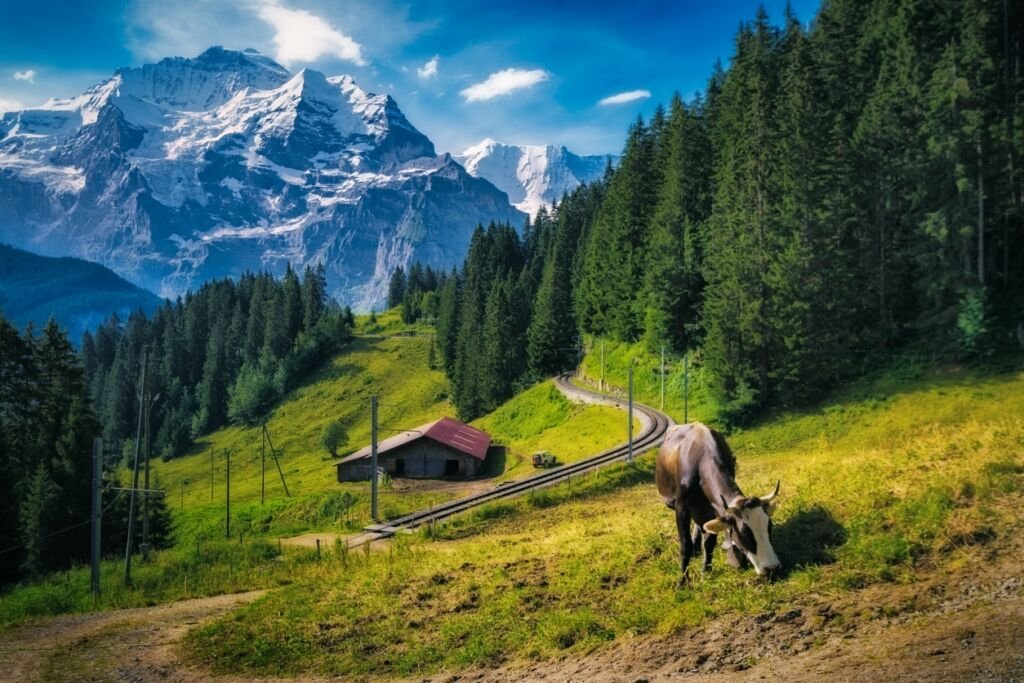
Since they’re both big cities with lots of shops, Geneva and Zurich are some of the best places to shop in all of Switzerland.
However, if you’re looking for some serious retail therapy, you may find that Zurich is the best option of the two.
No matter whether you’re looking for vintage shops, antique emporiums, designer boutiques, or department stores, you can find it all in this big Swiss city.
The Old Town is one of the top spots to shop, especially for souvenirs, crafts, and books, while Zurich-West’s Viadukt is amazing for finding unique treasures and quirky bargains.
Geneva also has quite an interesting and eclectic array of stores. Place du Molard is ideal for all your designer fashion needs, while streets and quarters like Carouge and the Quartier des Bains also have vintage shops, jewelry stores, and bookshops aplenty.
However Zurich’s shopping scene is deeper and more diverse, but Geneva is still a fun place for browsing the boutiques.

Switzerland has some fantastic food, and you might like to sample some of the rich, cheesy specialties of this nation during your time in either Zurich or Geneva.
In particular, fondue is super popular in Switzerland, as well as raclette, which involves melting cheese with the aid of a special machine before pouring it over boiled potatoes.
But which city offers the best food between Zurich and Geneva?
Well, Geneva has a big advantage of being such a fascinating metropolitan mix of people, which also results in a remarkably diverse culinary scene. You can find all sorts of food here, from the Swiss classics to various European, African, and Asian restaurants.
While the options go on and on in Geneva, Zurich’s culinary scene is a little more conservative and classically Swiss.
There are some fabulous restaurants to uncover around the Old Town, especially along the Niederdorf promenade, but many eateries have similar menus, with a big focus on the German-inspired specialties, with lots of sausages, cheese, and white wine.

Which Is Better For A Family Trip?
If you’re heading to Switzerland as a family, it can be tricky to pick between Geneva and Zurich.
Both of these cities have plenty to offer for the whole family, and the right choice may ultimately depend on the ages of your kids.
Those with older children may prefer Geneva. The more relaxing vibes of this city can appeal to families looking to get away from it all for a while.
Teens may be intrigued by the likes of CERN and the various international organization bases, as well as the city’s uniquely global vibes. Geneva also has the benefit of free public transport for the entire family.
However, those with younger children will surely find more to do in Zurich.
There are several family-friendly attractions here, including the Zurich Zoo and multiple museums aimed at kids, like the Toy Museum, Swiss Children’s Museum, and Technorama Science Center, with its own escape rooms and interactive exhibits.
Overall, Zurich once again has an edge here. It’s got more things to do for children, and most families will probably have a more fulfilling time in this city.
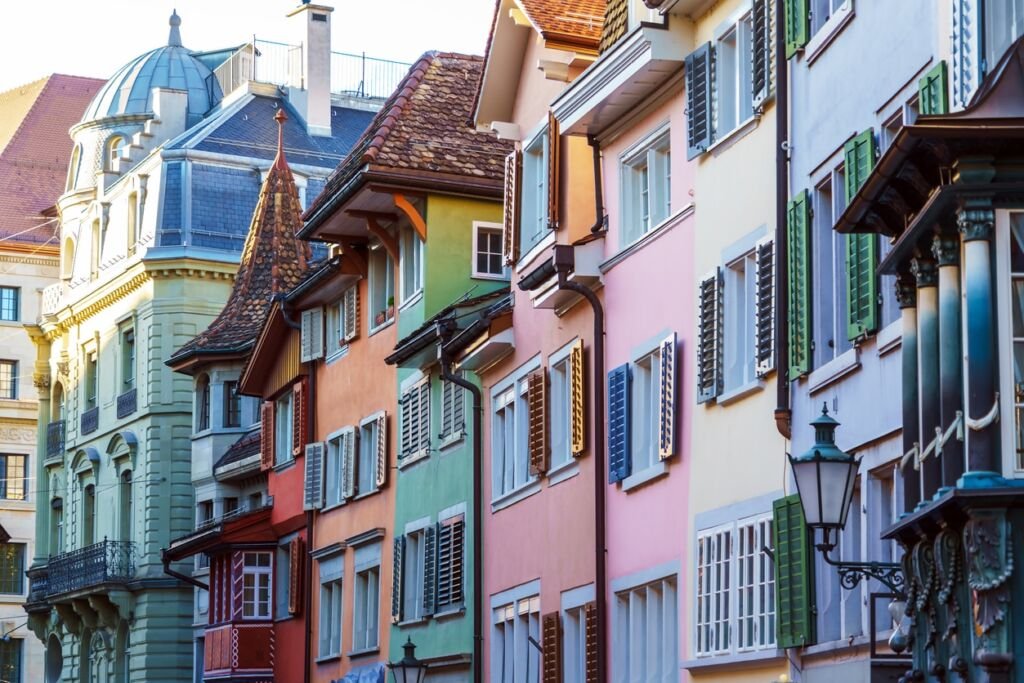
Which Is Better For Couples & Honeymoons?
If you’re trying to choose between Geneva and Zurich as a couple, the decision will mainly come down to what sorts of activities you and your partner enjoy, as well as what kind of overall experience you’re looking for.
Geneva has the benefit of being a calmer and more relaxing city, while still having plenty of sightseeing opportunities.
The beautiful surrounding landscapes give this city a wonderful, romantic vibe, and there are lots of terrific places to enjoy an evening meal with your partner.
At the same time, Zurich has more appeal for very active couples who enjoy exciting nightlife and the bustling streets of a big city.
You’ll probably find a little more to keep you busy in and around Zurich, even though it’s not as romantic.

For backpackers, it’s hard to overlook Geneva as the best city to visit.
A big part of this is thanks to the Geneva Transport Card (more on that later!), which allows you to get around the city for free, saving you a whole lot of money and opening the doors to all sorts of daily adventures.
Geneva is also a little cheaper overall, making it a better pick for budget-conscious backpackers, while this city also has multiple hostels and English-speaking people on every corner to guide you around.
Zurich is more expensive, and backpackers may find it tricky to stretch their budget here.
However, it’s still a fabulous city to explore, with lots to see and many great landmarks and cities in the surrounding area for day trips, too.

Finally, let’s look at the average costs for trips to both Geneva and Zurich.
First, it’s important to remember that the cost of any trip is dependent on the accommodation, food, and activities you choose – with good planning and smart budget management, it should be possible to visit either of these cities on a range of budgets.
With that said, it’s also worth noting that Switzerland is famous for being one of the more expensive European countries to travel in.
For that reason, both Geneva and Zurich may seem like pretty pricey places to many travelers, especially if you’ve spent time in some of Europe’s cheaper locations.
Of the two, Geneva is more affordable. You’ll still have to spend a reasonable amount on accommodation and eateries, but it’s possible to find a place to stay and food to eat for less in this city.
In comparison, Zurich has higher nightly hotel rates and pricier food, so budget-conscious travelers will need to be extra careful when planning their trips.

Budget: It’s hard to find a good place on a budget in Geneva – this is Switzerland after all – but the Geneva Marriott is a fantastic option set in a great location with plenty of facilities. See photos and rates!
Luxury: Set in the heart of Geneva’s downtown district, a stay at the five-star Les Armures will have you just minutes away from the city’s shopping areas and the lakeside. This hotel is so well regarded that former presidents Bill Clinton, JFK and Jimmy Carter have all stayed here before. See photos and rates!
Budget: Close to the lake amid a very friendly atmosphere is the family-run Aparthotel Familie Hugenschmidt . The location is fantastic, and the rates affordable. See photos and rates!
Luxury: The elegant, five-star La Réserve Eden au Lac Zurich is set right on Lake Zurich so you’ll wake up to wonderful views every morning. With renowned celebrity service and world-class dining, this is easily one of the best hotels in the country. See photos and rates!

The first step of planning your trip to either Geneva or Zurich is to consider how you’re going to get to your chosen destination.
Fortunately, both of these cities are quite easy to access, with their own international airports and direct flights all over the globe.
Geneva Airport is very conveniently located less than three miles from the city center – there’s a handy airport railway service and buses to take you directly into the city.
This airport has many direct flights across Europe, as well as some connections with North Africa, Asia, and the eastern side of North America.
Zurich Airport is the biggest airport in Switzerland. It’s about eight miles away from the city center, with bus, tram, and train services for passengers.
This airport also has way more direct connections across the globe. You can fly straight here from places like Chicago, Los Angeles, Vancouver, Tokyo, Seoul, and so on.
Thanks to its bigger and better-served airport, Zurich is the easiest place to get to, but most travelers shouldn’t have any trouble accessing either city.
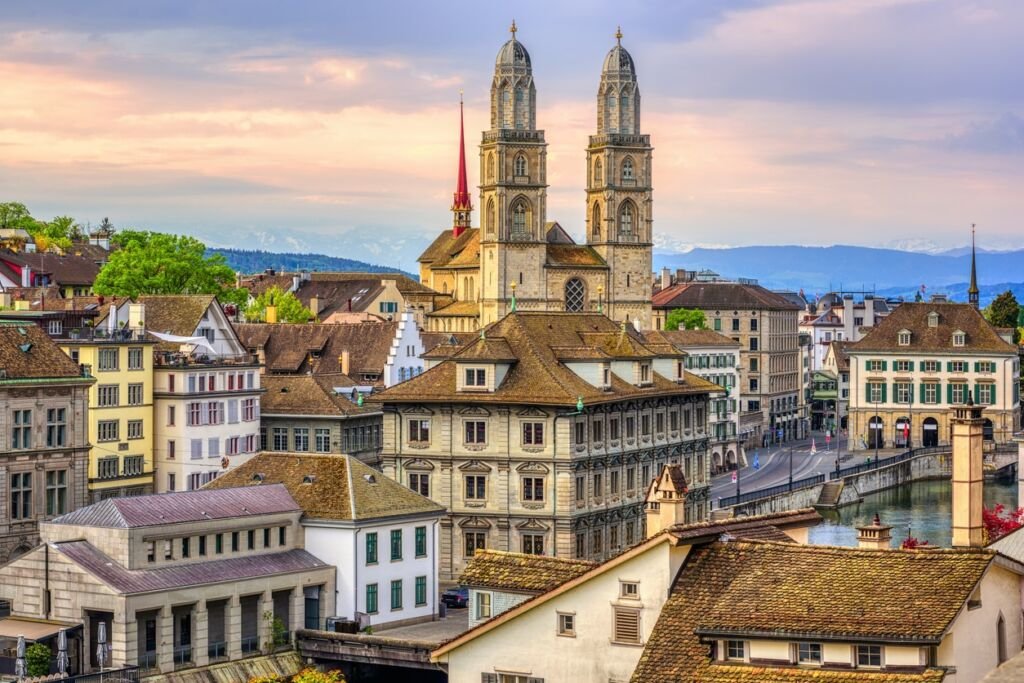
Which Is Easier To Get Around?
Once you’ve made it to either Geneva or Zurich, you’ll need to think about how you’re going to get around, see the sights, and enjoy all of the various activities and attractions that make these cities so special.
First, you might be wondering if you need to rent a car in either city. Luckily, for the vast majority of travelers, we would say no.
As both cities have great public transport systems, there’s really no need to have your own car, unless you plan on doing lots of exploration or day trips over the border into France or Germany.
Geneva’s public transit is terrific. There are buses, trams, trains, and even boat services to take you almost anywhere you can imagine. Even Lake Geneva itself has boats and shuttles to help you navigate the waters or cross to the other side.
Zurich’s public transport system is also highly reliable, with local buses and railways to take you where you need to go.
Both cities are also pretty walkable, and it’s tough to call a winner in this category.
However, Geneva has the edge, thanks to a little something called the Geneva Transport Card – this card is given free to tourists staying in approved hotels and hostels in the city, and it grants you totally free and unlimited usage of Geneva’s buses, trains, and boats!

Geneva vs Zurich: Which Is The Better Choice?
It’s no surprise that many travelers struggle to choose between Zurich and Geneva, as there’s a lot to love about both of these Swiss cities.
But ultimately, the best choice for you will mostly depend on your desires and preferences.
Geneva has several advantages. It’s cheaper, arguably better for backpackers and couples, and also has a more diverse culinary scene.
It’s the ideal choice for those who are looking for an eclectic travel experience, filled with unique landmarks and experiences you won’t find anywhere else in Switzerland.
Then, there’s Zurich. This city is bigger and livelier, with better nightlife and more family attractions. It’s also a more traditionally Swiss city, with the traditional food you would expect to find and intriguing museums to help you learn more about the nation’s past.
With a bigger airport, Zurich is also easier to get to, especially for those coming from the US or Canada.
Overall, our comparison is almost too close to call, but Geneva may just have the edge, thanks to its more affordable nature and the beautiful scenery that surrounds it.
If you’re only able to see one of these Swiss cities, Geneva is probably better for most travelers, but you should still try to check out Zurich, if you can.

Related Posts

8 Restaurants In Geneva (IL) Locals Love For Views, Food & Vibes!

Lorem ipsum dolor sit amet, consectetur adipisicing elit sed.
Follow us on

Geneva vs Zurich: Which Swiss City to Visit?
Last Updated on January 10, 2024
by Lizzie Fitzgerald
Disclaimer: This article contains affiliate links. That means if you click a link and make a purchase, we may make a small commission. As an Amazon Associate we earn from qualifying purchases. For more information, see our privacy policy.

If you’re looking for a city break in Switzerland, it can be hard to decide whether Geneva vs Zurich is the right choice for you and your travel style.
Although neither are the nation’s capital, Zurich and Geneva are two of the most common destinations for visitors in Switzerland.
In general, Geneva can be a good choice for those looking for a lively, international city to visit that may be slightly more affordable. On the other hand, Zurich is great for those looking for a typically “Swiss” experience and who don’t mind splashing a bit of cash.
However, there is a lot more to consider when choosing between these two cities!
Table of Contents
Situated at the southernmost tip of Lake Geneva, the city boasts picturesque views of the water jet and Mont Blanc and is surrounded by the Swiss Alps and Jura mountains.
It’s the most populous city of Switzerland’s French-speaking region, the Romandy region, and is generally known as the global hub for diplomacy.

Accessibility
Being one of the largest cities in Switzerland, Geneva is home to its own international airport and it is relatively easy to reach the city directly from countless destinations across Europe. Geneva Airport is also well-connected by train throughout the country – you can check schedules here.
Geneva can also be used as a base to explore nearby attractions on a day trip such as to Montreaux, Mont Blanc, Lausanne or taking a cable car to Mont Salève.
One of the most important things to consider if you’re deciding between the two cities is accessibility and ease of movement within the cities.
And unsurprisingly, Geneva offers excellent public transport to all visitors. Ranging from buses and trams to trains and even boats, you can travel to just about anywhere you like using Geneva public transport.
The city has made a concerted effort to ensure that transport options are accessible and there’s even a shuttle service that operates on Lake Geneva to allow transportation from one shore to another.
Best of all, visitors staying in rented-out accommodation options while in Geneva will receive a Geneva Transport Card free of charge. This covers public transport, including local buses, trains, trams and boats on the lake. Alternatively, if you’re staying with friends or family, you can purchase a UNIRESCO ticket that operates in the same way.
The most practical thing to do while spending time in Geneva, however, is to navigate the city on foot as much as possible – it’s only six square miles, after all. Then, depending on where you’re staying, you can use the public transport options listed above for further journeys.
If you’re out late enjoying the nightlife, bars and clubs, note that the bus and tram services generally run until midnight and start again at 6:00 AM. Therefore, it may be a good idea to get an Uber.
But other than that, there’s not much need to use taxis, and it’s certainly not necessary to hire a car! Geneva’s public transport system is efficient, and the city is super safe, so take advantage of this.

Affordability
When it comes to considering Zurich vs. Geneva based on affordability, the good news is that Geneva is considerably more affordable. Of course, any trip to Switzerland on the whole is a notoriously expensive country , but if you’re going to save a few bucks during your holiday, Geneva is the place to do it.
Eating out in Geneva can get pretty pricey, but if you’re aware of where you’re going, it’s possible to not break the bank. Meals will range from about 30 CHF (the Swiss Franc is roughly at parity with USD) at your most casual establishments to well over 100 CHF if you go somewhere really high-end.
Of course, it is essential on a visit to Geneva to indulge in some delicious fondue or raclette, you just need to ensure you budget for it.
Of course, the most cost-effective option will always be to buy groceries and prepare food for yourself, but it’s still plausible to eat out once or twice if you’d like to have a special experience. Booze, however, is pretty expensive, costing about 7 CHF for a beer – but it’s still cheaper than Zurich!
Overall, however, while Geneva is considerably cheaper than Zurich, it’s still one of the most expensive cities in Europe and while it’s worth visiting, you’ll need to make sure you plan accordingly.

Things to do in Geneva
The debate between visiting Zurich and Geneva may very well come down to the type of things you want to see and do during your time in Switzerland. On the most basic level, Zurich is generally known as the more “Swiss” city, so to speak, while Geneva is renowned for its diversity.
So, it really comes down to preference, but here are some of the top things to do in the city of Geneva. If you plan on visiting a lot of attractions, consider purchasing a Geneva Pass for discounts to many places of interest.
Visit Lake Geneva
This shouldn’t come as a surprise but one of the must-see places in the city is its world-famous lake. Whether you’re visiting in summer or winter, this magnificent body of water is an iconic landmark in the city.
As you wander around the lake, you’ll come across a number of points of interest including the Jet D’Eau (Geneva Water Fountain), Jardin Anglais (English Gardens) and the Bains Des Pâquis (Outdoor Baths).
It is utterly breathtaking and the views of the mountains in the distance are exquisite. If you visit during warmer weather, you can even jump on a pedal boat or have a dip! The area surrounding the lake is also nice and vibey, making for a great place to walk around and get to know the city.
Go See the Temple De Saint-Pierre
Built during the 12 th century, the Temple De Saint-Pierre boasts gorgeous Neoclassical architecture and just oozes history. The building is beautiful and is an absolute must when visiting Geneva.

Wander the Cobbled Streets of Vielle Ville
Known as the city’s historic quarter and Geneva’s old town, Vielle Ville was once enclosed by walls. Today, it’s littered with fountains and cafes, and its history is palpable. In fact, it was the birthplace of famous philosopher Jean-Jacques Rousseau.
It is also home to several museums that might be of interest including the Patek Philipe Museum and The Art and History Museum.
Palais De Nations
Home to the second most important United Nations (UN) building in the world (after New York), Geneva’s current UN building dates back to the 1930s and was originally used as the headquarters for the League of Nations (the UN’s predecessor).

Where to Stay in Geneva
Hotel Astoria – Located close to Geneva’s central train station, this is a good mid-range hotel option in the city. They offer a range of private rooms suitable both for couples or single travellers and breakfast is included in the nightly rate.
Hotel D Geneva – This luxury hotel is a great choice for those looking for a high-end place to stay in this beautiful Swiss city. They have a range of modern rooms on offer and a great location for exploring Geneva. There is also an option to include breakfast in your nightly rate.
City Hostel Geneva – Those travelling solo or on a tight budget will love this centrally located hostel. They offer a range of dorms and private rooms, shared kitchen facilities and it is only a short walk to the train station.
Not quite what you’re looking for? Click here to browse other hotels in Geneva.
While it’s known as the economic hub of Switzerland and the country’s largest city, Zurich has far more to offer than just its financial district. This large, German-speaking city boasts a combination of beautiful scenery, namely Lake Zurich, as well as a plethora of museums and other interesting sites.
If you’re deciding between Geneva or Zurich to visit and you’re particularly keen on experiencing typical Swiss culture, then Zurich is the place to go!
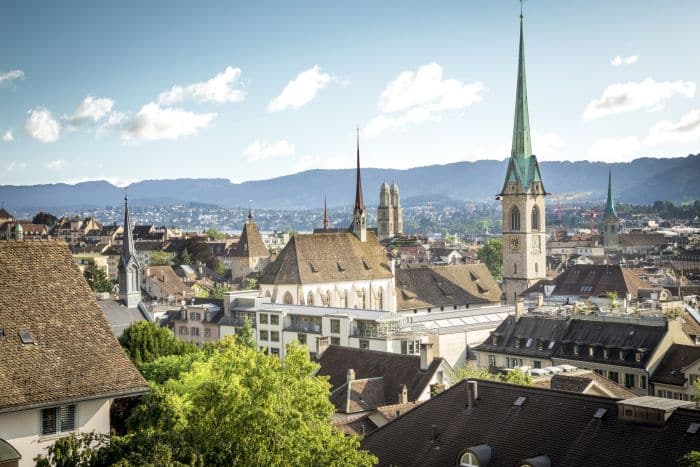
Like Geneva, Zurich is home to its own international airport with countless connections across Europe and further afield. You can also reach Zurich via rail from all over the country, including cities like Bern and Interlaken .
It ought to come as no surprise that since Zurich is seen as being very Swiss, the city’s transport system is nothing short of flawless. It’s efficient, effective and you don’t really get much better!
The best thing to do while in Zurich is to purchase a Zurich Card which will allow you to travel on all of the city’s major modes of transport – including buses, funicular railways, and cable cars. It’ll also get you free transport from the airport to the city centre which is an absolute score!
Essentially, with this card, you have unlimited access to second-class transport on the city network and you can purchase it online or at a ticket machine.
Within the city, however, if you’re not travelling far, the preferred mode of transport tends to be buses (which are included on the Zurich Card), but mostly travelling by foot.
Much like in Geneva, travelling after midnight immediately gets more expensive because you’re pretty much limited to taxis or Uber, and unfortunately, these services are far pricier in Zurich.
It’s certainly not worth renting a car in Zurich unless you want to travel all over the country on your own time. But even so, Switzerland’s public transport network is so efficient and so vast that you could travel all over the country via public transport with no trouble at all.
Overall, however, while transport is super reliable and accessible in both Geneva and Zurich, the latter does tend to be a little bit pricier, much like everything else in the city.

I’m sure it’s become pretty clear by now, but Zurich is not a cheap place, but it’s important to note that a lot of its reputation pertains to living expenses, so it’s not all relevant to tourists. That being said, however, there are still many ways to keep your costs down if you do decide to visit.
Again, the cheapest way to keep food costs down is to shop at grocery stores – that way, prices will be fairly similar to Geneva.
However, eating out in Zurich is quite a lot more expensive, and alcohol – ranging from domestic to imported booze – is also pricier, costing about 8 CHF a pop for a beer.
The best option would be to pop into a bottle shop and have a drink at home!

Things to do in Zurich
Visiting this densely populated Swiss city means having lots to do. Here are a few things you absolutely can’t miss out on when you’re in Zurich:
Take A Walk Alongside Lake Zurich
Unsurprisingly for the Swiss, Lake Zurich is an absolutely pristine body of water boasting a three-kilometre-long promenade, extending from Bellevue to Tiefenbrunnen.
You can gaze out at the yachts gliding across the surface. The water is known to be some of the cleanest in all of Europe, so if you’re visiting in summer, be sure to have a dip.
Visit Altstadt
Lying on both sides of the Limmat River, Altstadt is considered Zurich’s old town. It’s a gorgeous area to get lost in wandering, from one café to the next and seeing historic monuments, medieval churches, and quirky shops. If you want to learn more about the history, you can book a walking tour here.
Some of the main points of interest here include walking up to Lindenhof for views of the city, seeing the Grossmünster church, walking along Bahnhofstrasse or visiting one of the many museums such as the Beyer Clock and Watch Museum or The Swiss National Museum.

Check Out the Museum of Art
If you’re a fan of art and history, the Swiss Museum of Art will absolutely blow your mind. It’s home to pieces ranging from the 11 th century to the 19 th century, including some of the most famous Swiss art of all time.
Explore Zurich-West
Get a taste of Zurch’s serious side when you visit the western side of the city. This former industrial area used to be a hub for manufacturing up until the latter half of the 20 th century but is now a hip neighbourhood with plenty of places to eat, drink and see.
Where to Stay in Zurich
Motel One Zürich – This 3-star hotel is an excellent option for those travelling to Zurich on a mid-range budget. They have lovely rooms available, a hip on-site lounge bar and they even allow pets for those travelling with a furry friend.
Sorell Hotel St. Peter – Those after a bit of luxury during their trip to Zurich are sure to love this plush hotel. Boasting luxe rooms and plenty of other amenities, it is also very centrally located close to everything this Swiss city has to offer.
HITrental Stauffacher Apartments – These apartments are a great choice for you if you’d like to have your own space in Zurich. They have a range of various-sized flats on offer, some with balconies, that are all fully furnished with everything you may need.
Zurich Youth Hostel – An excellent choice for those sticking to a budget in Zurich, this centrally located hostel has a lot to offer. They have a range of both dorm beds and private rooms available and great common areas and self-catering facilities for guests to use.
Not quite what you’re looking for? Click here to browse more Zurich hotels!

Geneva or Zurich: The Verdict
Deciding between Geneva and Zurich for tourists is a tough one, no doubt about it. The cheaper destination is Geneva – not only are prices generally lower across the board, but it’s also easier to get free transport (depending on where you’re staying), and eating and drinking out is more cost-effective too. So, if you’re hoping to save some money while in Switzerland, Geneva is the place to go.
In terms of things to do in each city, however, there are loads to do in both Zurich and Geneva for tourists – both cities offer a mixture of outdoor sites as well as museums and cute districts.
The main difference, however, is that Geneva is generally best suited to visitors wanting to have more of an eclectic cultural experience, while Zurich is far more traditionally Swiss.
If you’re wanting an interesting cultural experience that’ll cost you a little less, choose Geneva. But if money isn’t your concern and you’d rather get a real feel for Swiss life, then I’d recommend Zurich.
Both Zurich and Geneva are incredible cities to visit with both offering you an opportunity to see some of the best destinations in Switzerland.
Are you wondering whether to visit Zurich or Geneva? Have any questions about either city? Let us know in the comments!

Related Posts:

One Day in Bern Itinerary: A Day Trip from Zurich

The Perfect 1, 2 or 3 Days in Lucerne Itinerary

Is Switzerland Expensive? A Trip Cost Guide for 2024
About Lizzie Fitzgerald
Lizzie is a writer for The World Was Here First. She loves travelling and discovering new places but also often finds herself returning to her favourite destinations. She has a particular affinity for Greece where she has visited countless islands and destinations on the mainland.
Leave a Comment Cancel reply
Geneva Vs. Zurich: Switzerland’s Finest Cities Compared

Geneva and Zurich are two of Switzerland’s best cities, but they are both quite different, each offering its own unique blend of culture, history, and more.
Choosing to spend your time in Geneva vs Zurich is not an easy decision to make, but rest assured, there is no wrong choice, they are both wonderful cities to visit.
To help you choose between Zurich vs Geneva, we are going to delve deeper into the details. Below, we will compare Zurich vs Geneva across a range of categories from popular attractions and public transport to food, nightlife, and more.
By the end of the article, it should be clear which of Switzerland’s biggest cities to visit, Geneva or Zurich.
Table of Contents
Popular Attractions

Nestled on the shores of Lake Geneva, Geneva is a very international city and a French-speaking city at that. It is home to the Olympic Committee, Red Cross Headquarters, United Nations, and many other global organizations that also call Geneva City home.
When you visit Geneva, you will have a huge range of great things to see and do. One of the most iconic landmarks is the Jet d’Eau , a magnificent water fountain that shoots water 140 meters into the air.
Spending time on the shores of Lake Geneva is also a must as the views into the Alps are incredible and in the summer it is the perfect place to sunbathe, swim in the crystal clear waters, and enjoy various water sports. A boat ride on Lake Geneva is also a wonderful way to enjoy the lake.
Strolling through Geneva Old Town is also a wonderful thing to do. You can explore the picturesque streets, take in the architecture, visit St. Pierre Cathedral, and climb the tower for panoramic views of the city, Lake Geneva and the Swiss Alps.
The Palace of Nations (Palais Des Nations) , the European headquarters of the United Nations, is another great place to visit in Geneva. The guided tours will teach you all about the history of the United Nations and shine a light on just how important the organization is.
Another thing I love about Geneva is how close it is to the Swiss Alps, you can be in the mountains hiking in just over an hour from the city.
There are also plenty of great museums in Geneva including the Red Cross Museum , the Olympic Museum in Lausanne , and plenty of great art galleries too.

Zurich is a Swiss-German-speaking city and when you visit Zurich, you will hear German more than any other of the official Swiss languages. Hailed as the financial hub of Switzerland, Zurich is also a very cosmopolitan Swiss city but not quite as cosmopolitan as Geneva.
Zurich is Switzerland’s largest city and this international city boasts a vibrant mix of old and new. Zurich Old Town, locally known as “Altstadt,” is a UNESCO World Heritage site and a must-visit for history enthusiasts.
Wander through its narrow alleys, admire the medieval buildings, and visit the Grossmünster, a Romanesque-style Protestant church with two distinctive towers. You should also walk along the banks of the Limmat River which flows out of Lake Zurich and through the Old Town.
For art lovers, the Kunsthaus Zurich houses an impressive collection of modern and contemporary art, including works by renowned artists such as Picasso, Monet, and Chagall.
Zurich is also home to the Swiss National Museum which is home to some of the most important historical collections in the world dating back to the prehistoric era.
Like Geneva, Zurich also has a beautiful lake, Lake Zurich. While it is not as big as Lake Geneva, the views across it are stunning, swimming and sunbathing in the summer are a must, lake cruises are stunning, and there are also a lot of water sports on offer too.
Public Transport
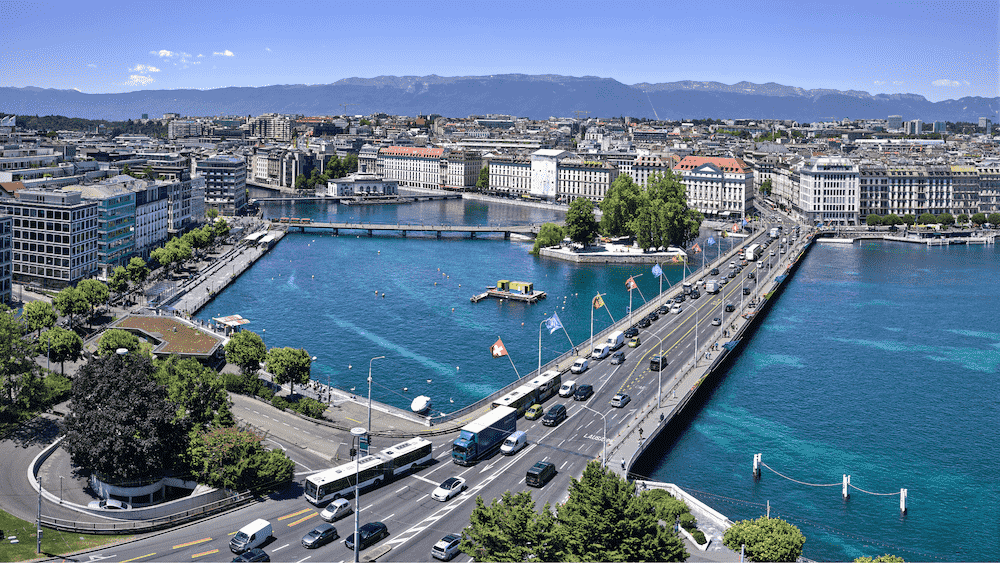
Public transport in Switzerland is about as efficient and convenient as it gets and both Zurich and Geneva benefit from this.
Geneva is actually a very walkable city and you can get by without public transport if you want to/if the weather permits. If not, you have the option of using Geneva’s public transport system which includes trams, buses, trains, and the subway too.
The tram network is the best way to get around the inner city of Geneva, and where there is not a tram, you will find a bus that will take you where you need to go.
For longer rides across the city, the subway is your best bet as it cuts down your journey time significantly. The trains out of Geneva are very efficient and you visit nearby towns such as
Most hotels provide their guests with a Geneva Transport Card free of charge, allowing you to enjoy unlimited travel on public transport for free during your stay.
Related Reading
Zurich to geneva travel options (train, car & taxi).

Both Zurich and Geneva’s public transport systems are as good as each other. In Zurich, like Geneva, you also have trams, buses, trains, and a subway that are all highly efficient and arrive at the minute of their schedule.
Unlike Geneva, Zurich is not the most walkable city as it is the country’s largest city so you will have to rely on Zurich’s public transport from time to time.
Trams should be your first port of call, then buses, and to cross town, use the subway for maximum efficiency.
Zurich HB is the country’s main train station and you can travel anywhere in Switzerland and pretty much Europe from there.
Your hotel in Zurich should also provide you with a Zurich Card for the duration of your stay which gives you unlimited travel within the city and offers free or discounted admission to numerous attractions.
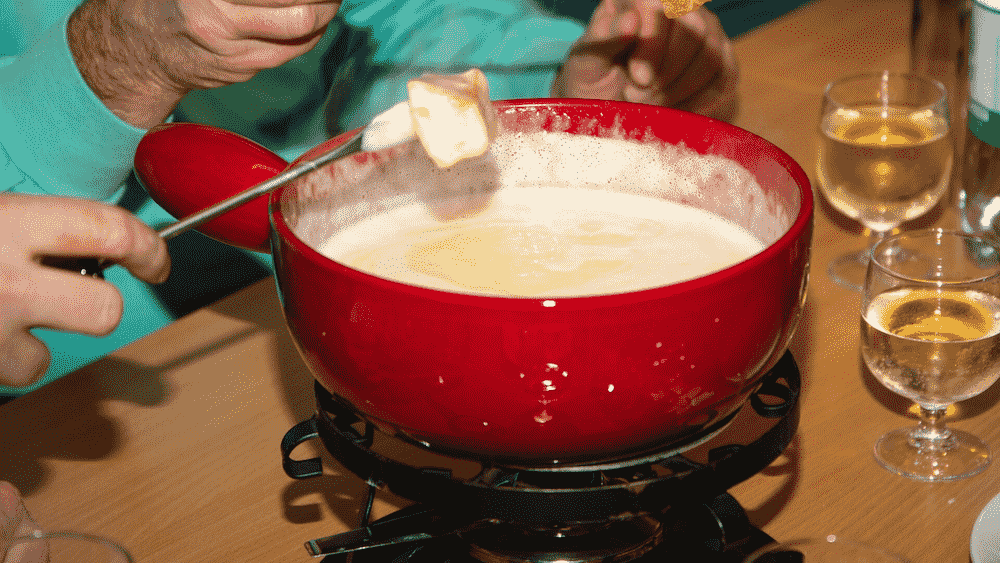
When it comes to culinary delights, Geneva offers a diverse range of both international and Swiss traditional cuisine.
The city’s cultural significance has contributed to a vibrant food scene, catering to various tastes from all over the world – if there is an international cuisine you are after, Geneva will have it.
Geneva is also known for its fine dining establishments, where you can savor exquisite French cuisine and haute cuisine creations. There are a number of Michelin Star restaurants in Geneva too, so if you want to dine in luxury while visiting Geneva.

Zurich is a food lover’s paradise, with a thriving culinary scene that caters to all tastes and budgets. The city offers a wide range of dining options, from trendy cafes and street food stalls to Michelin-starred restaurants – just like Geneva.
Traditional Swiss cuisine takes center stage in Zurich with dishes like Zürcher Geschnetzeltes (sliced veal in a creamy mushroom sauce) and Rösti (shredded and fried potatoes) being local favorites.
Be sure to explore Zurich’s vibrant food markets, such as the bustling Viadukt Market or the historic Bürkliplatz Market , where you can sample local produce, artisanal cheeses, and freshly baked goods.
While Geneva is the king of international cuisine in Switzerland, Zurich is not far behind and you can pretty much find anything you might want to taste in Zurich.
Where to Stay
Geneva is filled with top-notch hotels so you are spoiled for choice in where to stay. The trick is not spending a fortune, if you ask me.

5 Star Hotels
Options like The Woodward right on the shores of Lake Geneva are something you definitely won’t forget. Or, if you want to be in a 17th-century building in the midst of the old town, then I recommend Les Armures instead.
If you want to spend a lot less money then something more mid-range like the Citizen M also in the heart of the old town is the way to go.
The best budget option in my experience is the City Hostel Geneva , which is a stone’s throw from both the train and the lake.
Zurich has too many options to mention, but if you stay in the old town area you will be walking distance from almost anywhere worth going.
Want To Save This For Later?
I will email this post to you, so you read it for later (or keep for reference).

Zurich has plenty of 5-star options for you to choose from, by my favorite is the Storchen right in the heart of the old town on the river with views of the Grossmunster. I have friends who stayed here last year and can’t stop walking about it.
Zurich also has a Citizen M right in the middle of it all in the old town. So, if you want comfort without the 5-star price, this is your best bet.
I am ignoring the super-budget options here because they are all very basic and either right next to the train or way out of town. Instead, what I also recommend is the new Boutique Hotel Josef which is right next to my old work. This building has been completely renovated and is right in the heart of lots of eating options, walking distance from the train and tram to anywhere in Zurich.
Things To Do In Zurich: History, Culture, and Swiss Delicacies

Geneva’s nightlife scene may be relatively low-key compared to other European cities, but it still has a lot to offer for those seeking entertainment after dark.
The city’s nightlife is centered around several districts, with Les Pâquis being particularly known for its vibing atmosphere. You’ll find a mix of trendy bars, live music venues, and clubs catering to different tastes and you can dance away until dawn if you want to.
Many establishments offer a cozy and intimate ambiance, making them perfect for relaxed conversations over a drink. Some venues also host live performances, featuring local bands and international artists.

Zurich is renowned for its lively and diverse nightlife and it takes things one step further than Geneva in my eyes. The city has a reputation for its thriving club scene, with establishments like Hive , Supermarket , and Kaufleuten .
These venues often host international DJs, ensuring unforgettable nights of dancing and music. Zurich also offers numerous bars, ranging from sophisticated cocktail lounges to laid-back neighborhood pubs.
For jazz enthusiasts, the city has a vibrant jazz club scene, where you can enjoy live performances by talented musicians.
Additionally, Zurich’s theaters and concert halls regularly showcase a wide range of performances, including theater plays, musicals, and classical concerts.

Shopping in Geneva is excellent if you are into fashion and luxury. The city is renowned for its high-end boutiques and prestigious watchmakers, making it a paradise for those seeking exclusive designer goods and Swiss watches.
Rue du Rhône and Rue du Marché are two popular streets lined with luxury brands, offering a very high-end shopping experience.
The upscale shopping center, Bongénie , is another highlight, where you can find a wide range of designer labels under one roof.
For a more eclectic shopping experience, explore the neighborhood of Carouge , known for its bohemian atmosphere and independent boutiques.
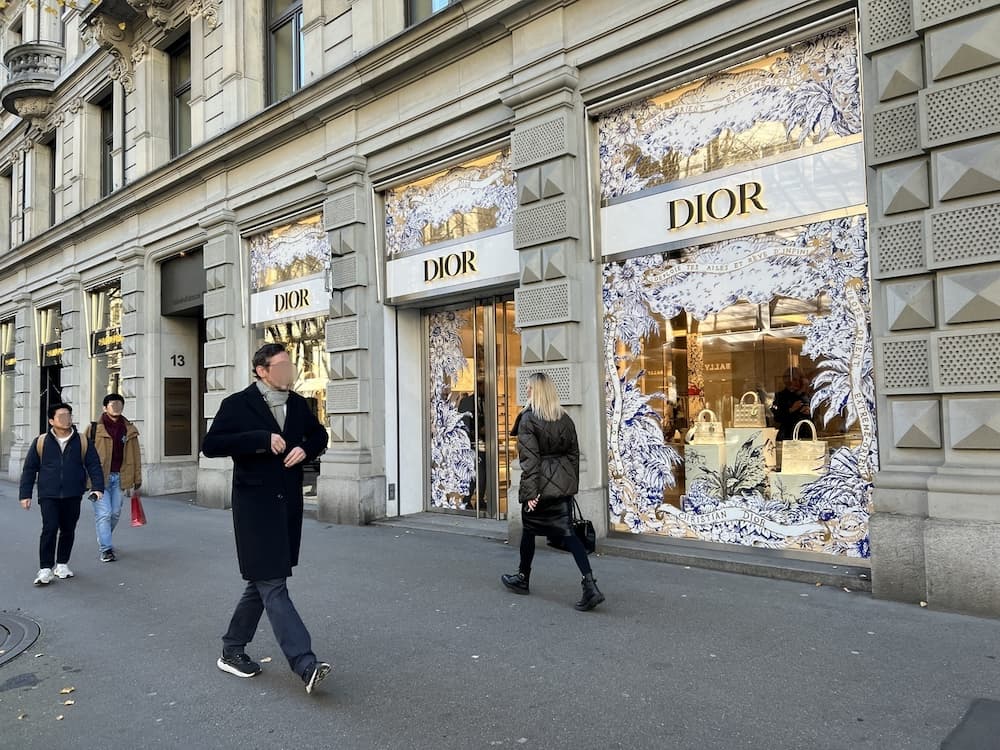
Zurich is a shopping haven and will suit different tastes and budgets. The city’s most famous shopping street, Bahnhofstrasse, is known worldwide for its exclusivity and elegance.
Here, you’ll find luxury brands, high-end department stores, and renowned Swiss watchmakers. From international fashion houses to renowned jewelry stores, Bahnhofstrasse caters to the desires of luxury shoppers and if it is out of your budget, window shopping is still great.
For a more alternative shopping experience, head to the neighborhoods of Niederdorf and Langstrasse .
Niederdorf is famous for its independent boutiques, vintage shops, and unique concept stores, while Langstrasse offers a vibrant mix of fashion boutiques, urban streetwear stores, and second-hand shops.
Cost of Visiting

It is important to note that both Geneva and Zurich are known for being expensive cities, and visitors should be prepared for higher prices compared to other European destinations.
Geneva, in particular, ranks among the most expensive cities in the world. Accommodation prices tend to be higher, especially in central locations, and dining out can be quite pricey.
However, there are ways to manage costs, such as opting for budget accommodations, exploring local markets for affordable dining options, and taking advantage of free attractions and activities.
Getting to Geneva Airport from Europe is very affordable as low-cost airlines such as EasyJet fly there regularly.
14 Unmissable Things To Do In Geneva: History, Culture, Food, and More

While Zurich is also considered expensive, it is often regarded as slightly more affordable than Geneva.
Accommodation prices may vary depending on the location and level of luxury, but overall, Zurich offers a range of options to suit different budgets.
Dining out can be expensive in popular areas, but the city also has affordable eateries and street food stalls that provide excellent value for money.
Flying to Zurich is affordable from Europe, and Zurich airport has a lot more international flights coming into it from around the globe, so if you are traveling from outside of Europe, it might be more affordable to fly to than Geneva.
Days to Spend in the City

When you visit Geneva, you should plan to have at least 2 full days to see the city but 4 days would be ideal if you want to experience all it has to offer at a more leisurely pace.
In 4 days you will be able to enjoy all the city’s main attractions, take advantage of all that Lake Geneva has to offer, visit nearby towns, and perhaps even have enough time for a hike in the Alps.
In 2 days, you will be able to experience the city but not its wonderful surroundings as well.

The amount of time needed to visit Zurich is similar to Geneva. You can do the city in 2 days, but to do all the city and some of the surroundings, 4 days is best.
Being a larger city than Geneva, to see all Zurich has to offer might take 3 days and then you can spend one day exploring the lake or the local mountains.
You could take two whole days to thoroughly explore Zurich Old Town and visit all the museums and art galleries it has to offer.
Geneva or Zurich: Which City Should You Visit?
Ultimately, you should visit both Geneva and Zurich if you can as they are the best Swiss cities . I would personally choose Geneva over Zurich for its more international scene, access to nature, and slower pace.
But, if you like the fast pace of a city, and want a ton of history, great nightlife, and excellent shopping, Zurich might be a better fit.
Whichever city you decide to visit, both Geneva and Zurich will guarantee a memorable experience that will make you want to visit Switzerland again as soon as possible.
Plan Your Trip to Switzerland
Leave a Reply Cancel reply
Your email address will not be published. Required fields are marked *
Get Our Free Swiss Tips Guide
Popular destinations, important pages, on social media, travel planning, certified swiss travel expert.

- Switzerland
- 8 Reasons Why You Should...
Geneva vs. Zurich: The 8 Reasons Why Geneva Comes Out Top

If you’re planning a trip to Switzerland but don’t know where to begin, Culture Trip starts you off by listing the main reasons why you should head to Geneva first and Zurich second.
1. geneva is a truly international city.
Architectural Landmark, Historical Landmark

Walk down almost any street in Geneva, and you’ll hear languages from every corner of the world, all in the space of about five minutes. People from around 190 countries live and work in Geneva. It’s a truly international city, thanks to the presence of the UN, banking headquarters, and a whole host of other international companies and organizations. Zurich is a little more Swiss, and while it still attracts plenty of foreign nationals, it doesn’t compare to the diversity of Geneva. The best time to visit these vibrant cities largely depends on your preferences. Summer, from June to August, is popular for its pleasant weather, while winter, from December to February, offers t he charm of holiday festivities and skiing in the nearby Alps . However, for a balance of good weather and fewer crowds, consider visiting during the shoulder seasons of spring (April to May) or autumn (September to October).
2. Food, food and more food

All those different nationalities have to be catered for, and it means you really are spoilt for culinary choice in Geneva. You can find food from almost every corner of the world all without having to look very hard for it. On top of that, you can always dig into traditional Swiss dishes like cheese fondue or raclette .
To give an example, when standing on Rue de Lausanne, a stone’s throw away from Geneva’s Gare Cornavin, you can choose from any number of Indian restaurants, Chinese or African spots, or even sample some Peruvian empanadas.
3. It's cheaper
This is like comparing a Bugatti Veyron to a Porsche. However, between two of the most expensive cities in the world, Geneva is cheaper. Hotels , restaurants , bars – you name it, you can shave a little off your budget by spending some time in Geneva. If you’re staying for a while, you can always save even more by hopping across the border into France and picking up your groceries there.
4. It's a gateway to the Alps and more

Geneva is well placed to take you to France or Italy , where you can even travel on a day trip if you get up early enough. Zurich is smack in the middle of Switzerland, and while this may not be a bad thing if you want to explore the inner parts of the country, if you are planning to have Switzerland as a stop-over on a Euro tour , Geneva may be the best option.
5. You can learn about the workings of the world and beyond

If you want to find out what makes the world tick, there is probably no better place than Geneva. You can delve into mysteries of the universe in the morning at CERN , then learn the history of the United Nations in the afternoon. Zurich is home to plenty of museums and has a vibrant culture of its own, but if you want a global perspective, choose Geneva.

Become a Culture Tripper!
Sign up to our newsletter to save up to $1,665 on our unique trips..
See privacy policy .
6. Geneva is quieter

Zurich’s population is larger and the city has a busier feel to it, whereas Geneva feels more like a large town. The peace and quiet can be good if you are looking for a relaxing trip, but if you’re up for a night out it can be a bit of a challenge.
7. Lake Geneva is bigger then lake Zurich
Natural Feature

8. The Jet d'eau

Literally meaning the “water jet”, Geneva’s Jet d’eau is difficult to miss, as it rises 140m (460ft) from the surface of Lake Geneva up into the air. While its purpose is mystifying, it makes for a great photo, particularly at night when it’s fully lit up. Zurich can’t match this.
Culture Trips launched in 2011 with a simple yet passionate mission: to inspire people to go beyond their boundaries and experience what makes a place, its people and its culture special and meaningful. We are proud that, for more than a decade, millions like you have trusted our award-winning recommendations by people who deeply understand what makes places and communities so special.
Our immersive trips , led by Local Insiders, are once-in-a-lifetime experiences and an invitation to travel the world with like-minded explorers. Our Travel Experts are on hand to help you make perfect memories. All our Trips are suitable for both solo travelers, couples and friends who want to explore the world together.
All our travel guides are curated by the Culture Trip team working in tandem with local experts. From unique experiences to essential tips on how to make the most of your future travels, we’ve got you covered.

Places to Stay
The best hotels to book in andermatt for every traveller.

The Best Hotels in Grindelwald, Switzerland, for Every Traveller

See & Do
How to spend 5 wonderful days exploring geneva.

Where to Go When Heading Off-Piste in Crans-Montana

Guides & Tips
Experience the ultimate date night with a romantic floating picnic.

Music and Movies in the Mountains of Klosters

The Best Hotels to Book in Switzerland

The Best Hotels in Wengen, Switzerland

Caprices Festival: Bringing the Party Back to the Swiss Alps

How to Cross Switzerland's Charles Kuonen Suspension Bridge

The Best Hotels in Gstaad, Switzerland

Food & Drink
A culinary tour of geneva’s food and drink scene.
- Post ID: 1308167
- Sponsored? No
- View Payload
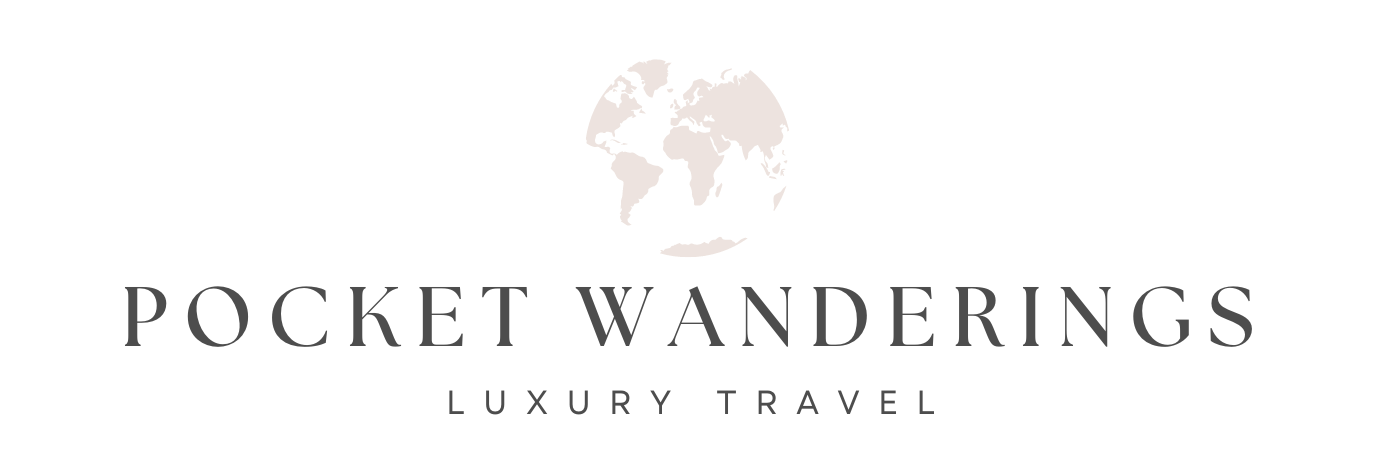
Geneva or Zurich: which Swiss city to visit?

Deciding between Geneva or Zurich for your next Swiss adventure? It’s definitely a tough decision but I’m here to help you decide which is the best option for you!
As you’d expect from any European city, both Geneva and Zurich offer a myriad of experiences that cater to different tastes and interests. But there are distinct differences between them.
In this article, I’ll share insights from my personal experiences in both Geneva and Zurich, aiming to help you choose the city that best matches your travel desires.
We’ll explore the vibe, attractions, cultural nuances, and the little details that make each city stand out.
So, grab a cup of coffee, and let me help you decide whether to visit Geneva or Zurich on your next trip to Switzerland.
Author Bio: Jessie Moore
Jessie Moore is a luxury travel expert with years of experience travelling the world to find the best destinations, hotels and adventures.
This post contains affiliate links.
A brief overview: Geneva vs Zurich
Geneva: the peaceful cosmopolis.
Nestled at the southern tip of its namesake lake, Geneva exudes a serene yet cosmopolitan vibe that’s hard to find anywhere else.
Known as the “City of Peace,” Geneva is home to the United Nations and a host of other international organisations, which adds to its global atmosphere.
But it’s not all about diplomacy and international affairs; Geneva also boasts a rich cultural scene, with numerous museums, art galleries, and theatres.

I adore the city’s backdrop of snow-capped mountains and the pristine Lake Geneva, which makes it a picturesque setting for both adventure and relaxation.
Geneva is famous for its high-quality watchmaking, luxurious shopping, and beautiful parks and gardens.
It offers a blend of leisure and sophistication that I know will appeal to discerning travellers.
Zurich: the vibrant cultural hub
Zurich, on the other hand, pulses with a dynamic energy that reflects its status as Switzerland’s largest city.
Positioned in the heart of the country, it’s a financial powerhouse with a skyline dotted that’s banks and modern buildings.
Yet, Zurich is also deeply rooted in its historical and cultural heritage, with a well-preserved old town that invites exploration.
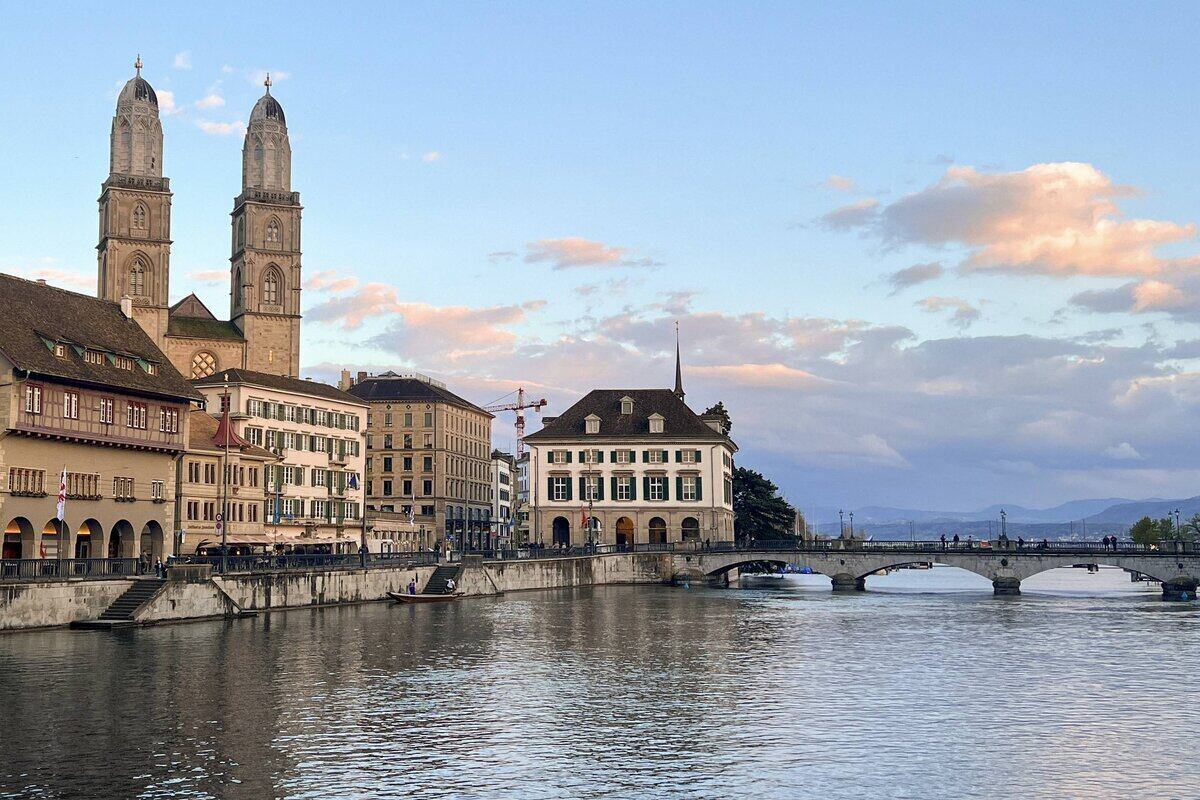
The city is known for its vibrant arts scene, including street art, live music, and over 50 museums and more than 100 galleries.
Zurich’s proximity to nature, with the serene Lake Zurich and nearby mountains, offers endless outdoor activities.
Famous for its innovative gastronomy and bustling nightlife, Zurich attracts those looking for a lively urban experience combined with easy access to natural escapes.
Getting there: are both cities easily accessible?
Whether you’re jetting off from the UK, the US, or other destination, I’m pleased to say that reaching both Geneva and Zurich is a straightforward affair.
This is thanks to Switzerland’s efficient and well-connected transportation network.
Here’s what you need to know about getting to these Swiss gems.
Flying into Geneva
Geneva International Airport (GVA) serves as a major gateway, not just to the city itself but to the western part of Switzerland.
For travellers from the UK, there are numerous direct flights from major cities, including London, Manchester, and Edinburgh, making Geneva a highly accessible destination.
The flight from London, for example, takes around 1.5 hours.

For those coming from the US, Geneva is equally reachable with direct flights from major cities such as New York, Washington D.C., and Chicago.
While the journey is longer, with flights typically around 8-10 hours, the convenience of direct routes makes it a relatively hassle-free experience.
Once you land, the city centre is easily accessible by train, bus, or taxi, with the journey taking as little as 20 minutes.
Flying into Zurich
Zurich Airport (ZRH), also known as Kloten Airport, is the largest international airport in Switzerland and a primary hub for travellers heading to Zurich.
Like Geneva, Zurich offers numerous direct flight options from the UK, with a similar flight duration of about 1.5 to 2 hours from London.
This makes Zurich equally convenient for UK-based travellers looking for a Swiss escape.

For US travellers, Zurich is arguably as accessible as Geneva, with direct flights available from cities like New York, Los Angeles, and Miami.
Flight times from the US to Zurich are comparable to those heading to Geneva, ensuring that American travellers can reach Swiss soil with ease.
Upon arrival, Zurich’s city centre is also just a short train ride away, with the efficient Swiss rail system whisking you into the heart of the city in under 20 minutes.
So whether you choose Geneva or Zurich, you’ll find that getting there is the easy part – the hard part is leaving!
Things to do in Geneva and Zurich
Both Geneva and Zurich offer a wealth of activities and sights that cater to a wide range of interests, from outdoor enthusiasts and culture vultures to those who appreciate fine dining and shopping.
Here’s a look at what each city has to offer:
Geneva: a blend of culture, nature and luxury
Top things to do in Geneva:
- Visit the United Nations Office: As a symbol of the city’s international character, a guided tour of the Palais des Nations is a must.
- Explore the Old Town: Wander through Geneva’s picturesque Old Town, home to historic buildings, quaint shops, and the iconic St. Peter’s Cathedral.
- Enjoy Lake Geneva: Take a scenic boat cruise to enjoy the stunning views of the city and the surrounding Alps and Jura mountains.
- Discover watchmaking and luxury shopping: Geneva is famous for its luxury watch shops and boutiques, perfect for those looking to indulge in high-end shopping.
- Museum hopping: With a plethora of museums, including the Red Cross and Red Crescent Museum and the Museum of Natural History, culture enthusiasts will have plenty to explore.
If you do choose to visit Geneva, then I’d really recommend getting the Geneva City Pass .
It covers all public transport across the city, plus free or discounted access to over 60 attractions.
Zurich: dynamic culture and breathtaking nature
Top things to do in Zurich:
- Stroll through the Old Town (Altstadt): I adore Zurich’s historical centre , which offers a glimpse into its mediaeval past, along with modern cafes and boutiques.
- Lake Zurich and Uetliberg Mountain: For nature lovers, a boat ride on Lake Zurich or a hike up Uetliberg Mountain offers panoramic views of the city and Alps.
- Art and museum culture: Zurich boasts over 50 museums and 100 galleries, including the Kunsthaus Zurich, one of the most important art museums in Switzerland.
- Vibrant nightlife and dining scene: Experience Zurich’s lively bars, clubs, and international restaurants, showcasing the city’s cosmopolitan flair.
- Street art and design districts: Explore the trendy areas of Zurich West and District 5 for a taste of the city’s cutting-edge art and design scene.
For more inspiration, read my guide to the best things to do in Zurich .
Things to do: the verdict
While both cities offer rich cultural experiences through their museums, historic sites, and luxury shopping, there are notable differences.
Geneva’s international and diplomatic flair contrasts with Zurich’s dynamic cultural life and its blend of historic and modern influences.

Nature is a highlight in both cities, though the experiences differ. Geneva’s lake offers leisurely cruises with stunning mountain views, whereas Zurich provides a mix of lake beauty and opportunities for mountain hiking.
Additionally, Zurich’s vibrant nightlife and emerging street art scene offer a more youthful energy compared to Geneva’s more laid-back and polished atmosphere.
Food and drink scene: which is better?
Both Geneva and Zurich offer a rich dining experience, but their approaches reflect their unique characters.
Geneva leans more towards international and luxurious dining experiences, with an emphasis on scenic locations and fine wines.
Zurich, conversely, embodies a more eclectic and innovative spirit, with its thriving street food culture, commitment to sustainability, and a growing craft beer movement.
While Geneva offers a taste of the world with a scenic view, Zurich presents a culinary adventure that blends Swiss traditions with cutting-edge trends.
Want up to 25% off hotels?
Subscribe to my newsletter and get immediate access to my guide on how to save money on flights and hotels. Our weekly emails are filled with adventure inspiration, insider travel tips and exclusive discounts.
Beyond the city limits: Geneva and Zurich as gateways to Switzerland
Choosing between Geneva and Zurich might also come down to what you want to explore beyond the city boundaries.
Both cities offer excellent starting points for iconic Swiss train journeys and are conveniently located near other Swiss villages , cities and attractions.
Indeed, I have personally used both cities as springboards for exploring Switzerland.
Geneva: gateway to the French-speaking Switzerland and alpine adventures
Geneva’s location in the western part of Switzerland makes it an ideal base for exploring the French-speaking regions and the nearby Alps:
- Close to the French border: Geneva is just a stone’s throw away from France, allowing for easy day trips to French towns and ski resorts.
- The Montreux connection: Take the picturesque train journey to Montreux , known for its jazz festival and the stunning Château de Chillon.
- Gateway to the Alps: Geneva offers access to some of the best ski resorts in the Alps, including Verbier, Chamonix and Morzine , within just a few hours’ drive.
- Scenic train journeys: Embark on the scenic Glacier Express or the GoldenPass Line from Montreux to experience some of Switzerland’s most breathtaking landscapes.
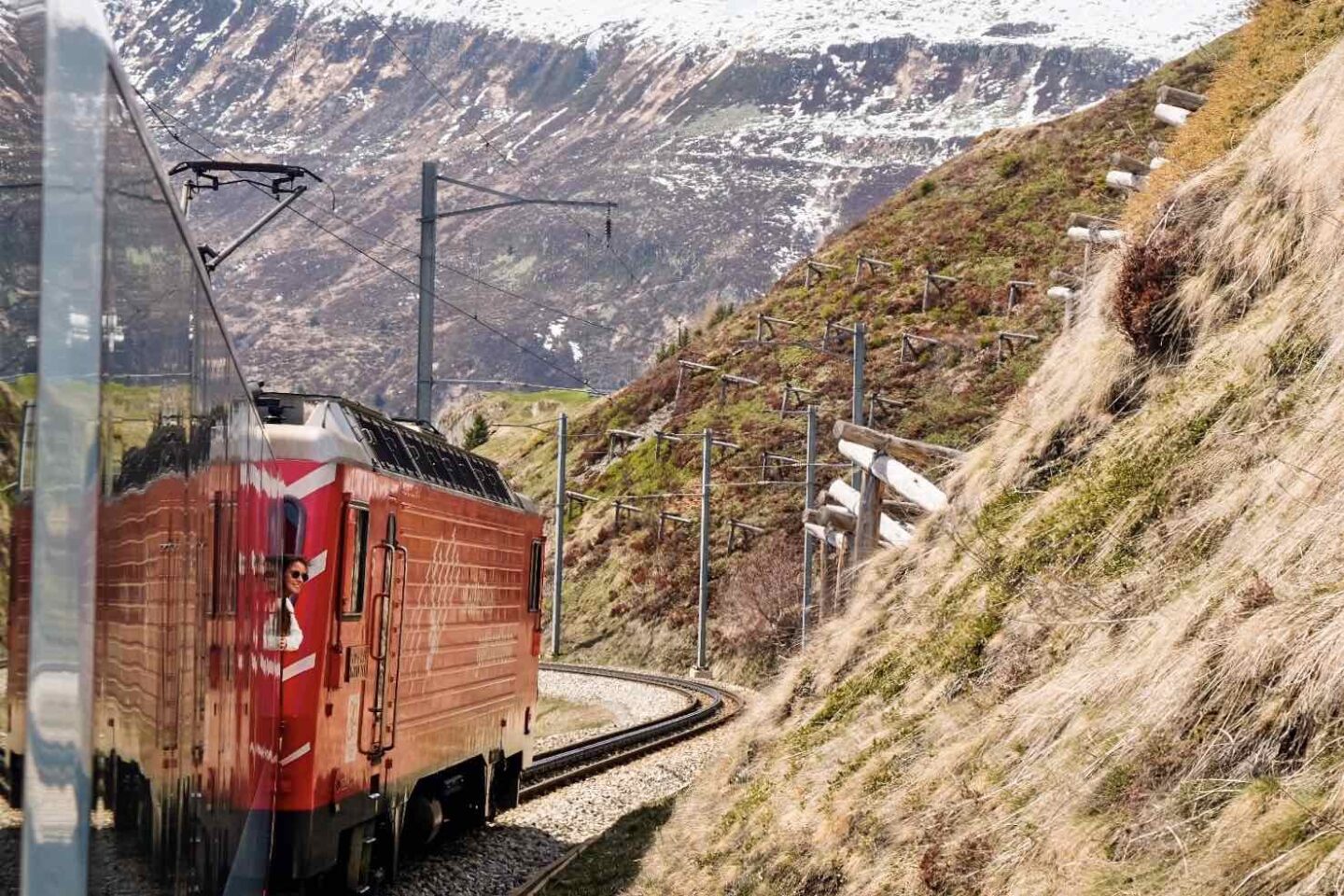
Read my guide to the most beautiful train journeys in Switzerland .
Zurich: The urban hub with easy access to Swiss highlights
Zurich’s central location makes it a perfect starting point for exploring the German-speaking part of Switzerland and iconic Swiss experiences:
- Heart of Switzerland: Zurich’s central location provides easy access to other major cities like Basel and Lucerne , as well as the picturesque Swiss countryside.
- The Rhine Falls: Just a short train ride away, the Rhine Falls near Schaffhausen offer an impressive natural spectacle.
- Mountain excursions: Zurich is the gateway to famous mountain destinations like the Rigi, Pilatus, and even the Jungfrau region , accessible by train.
- Panoramic train routes: From Zurich, join the Bernina Express or the Voralpen Express for some of the most stunning train journeys that showcase the diversity of Swiss landscapes.
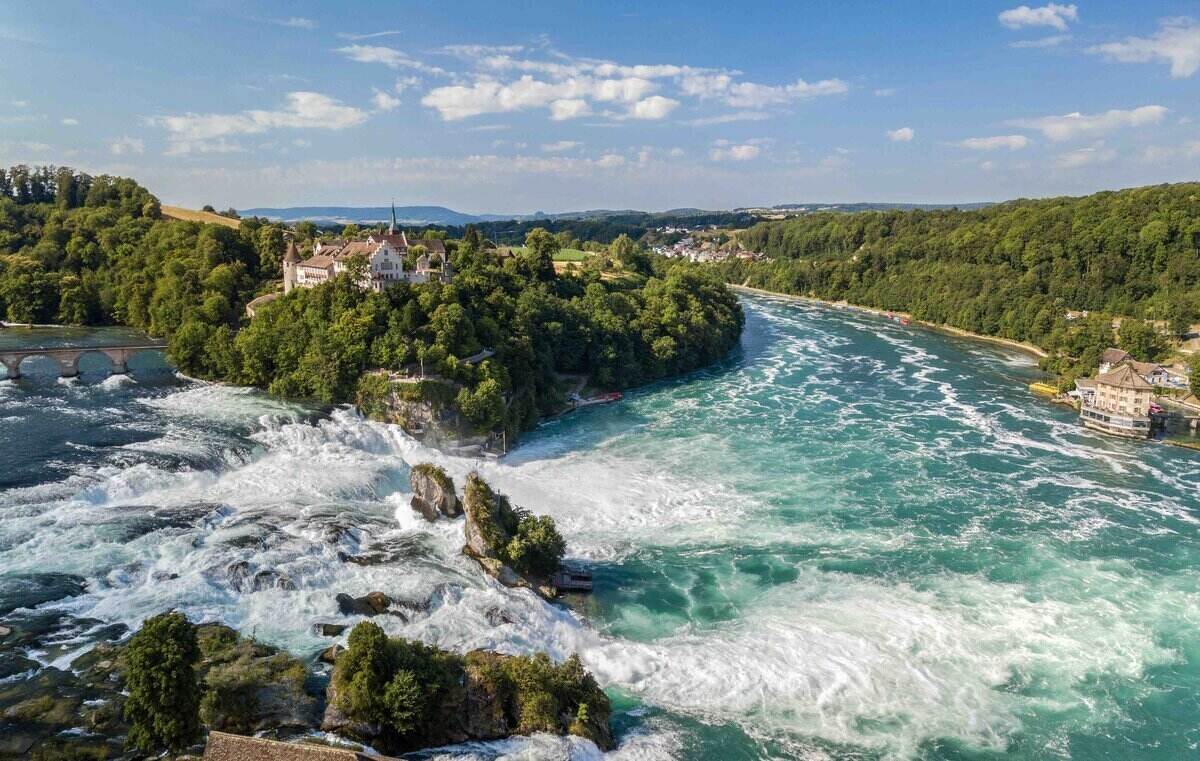
Discover my pick of the best day trips from Zurich .
Both cities offer unparalleled access to the famous Swiss efficiency and connectivity, making them excellent bases to explore the country.
Top tip: If you’ll be travelling around Switzerland by train then I’d really recommend investing in the Swiss Travel Pass .
It covers unlimited travel in Switzerland by train, bus, boat, and public transportation.
Plus, you get access to discounts of up to 50% on many mountain excursions and free entrance to over 500 museums.
Geneva or Zurich: other considerations
Language .
Geneva is in the French-speaking part of Switzerland, offering a Francophone culture.
Whereas Zurich is in the German-speaking region, presenting a different linguistic and cultural atmosphere.
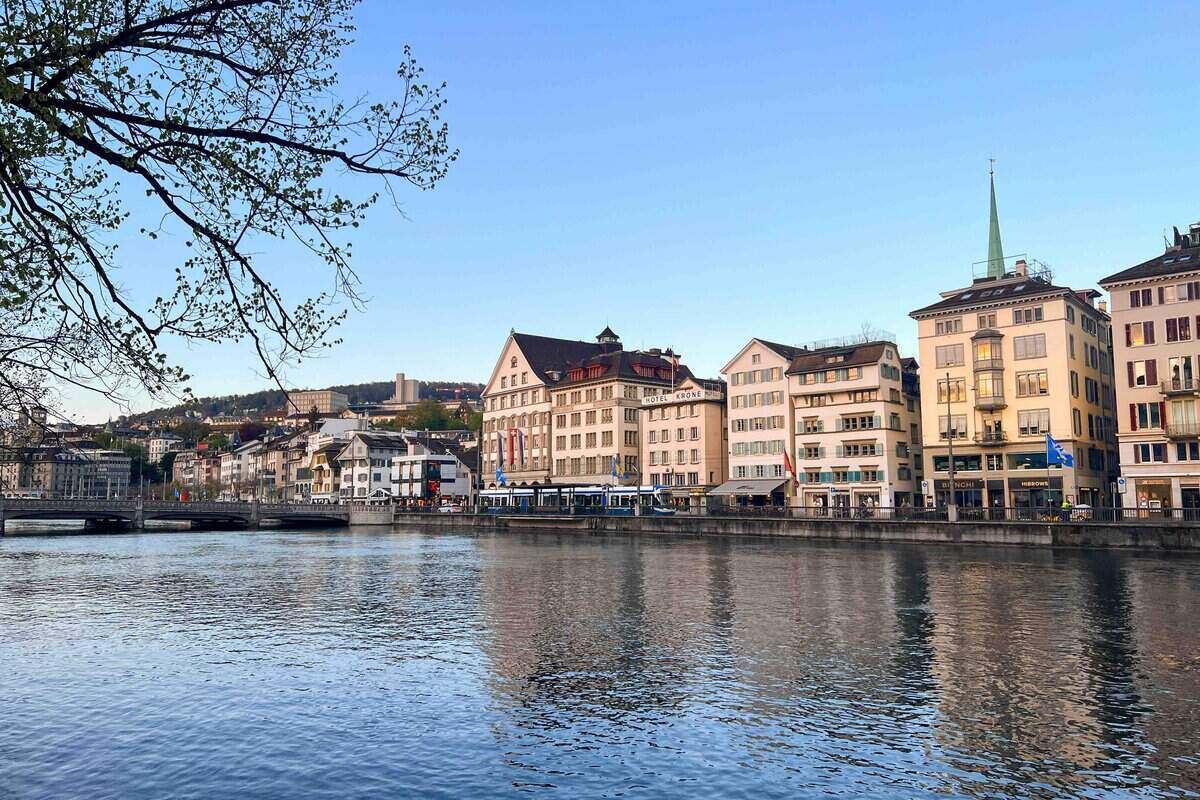
This might influence travellers who have a preference or familiarity with one of these languages.
Although note that English is commonly spoken in both Geneva and Zurich.
Events and seasons
Both cities host a variety of cultural and international events throughout the year.
Geneva is famous for its international motor show and the Fête de la Musique. While Zurich shines with its Street Parade and the Zurich Film Festival.
I’d recommend checking the event calendar, as this might tip the scales if there’s a particular event that catches your eye.
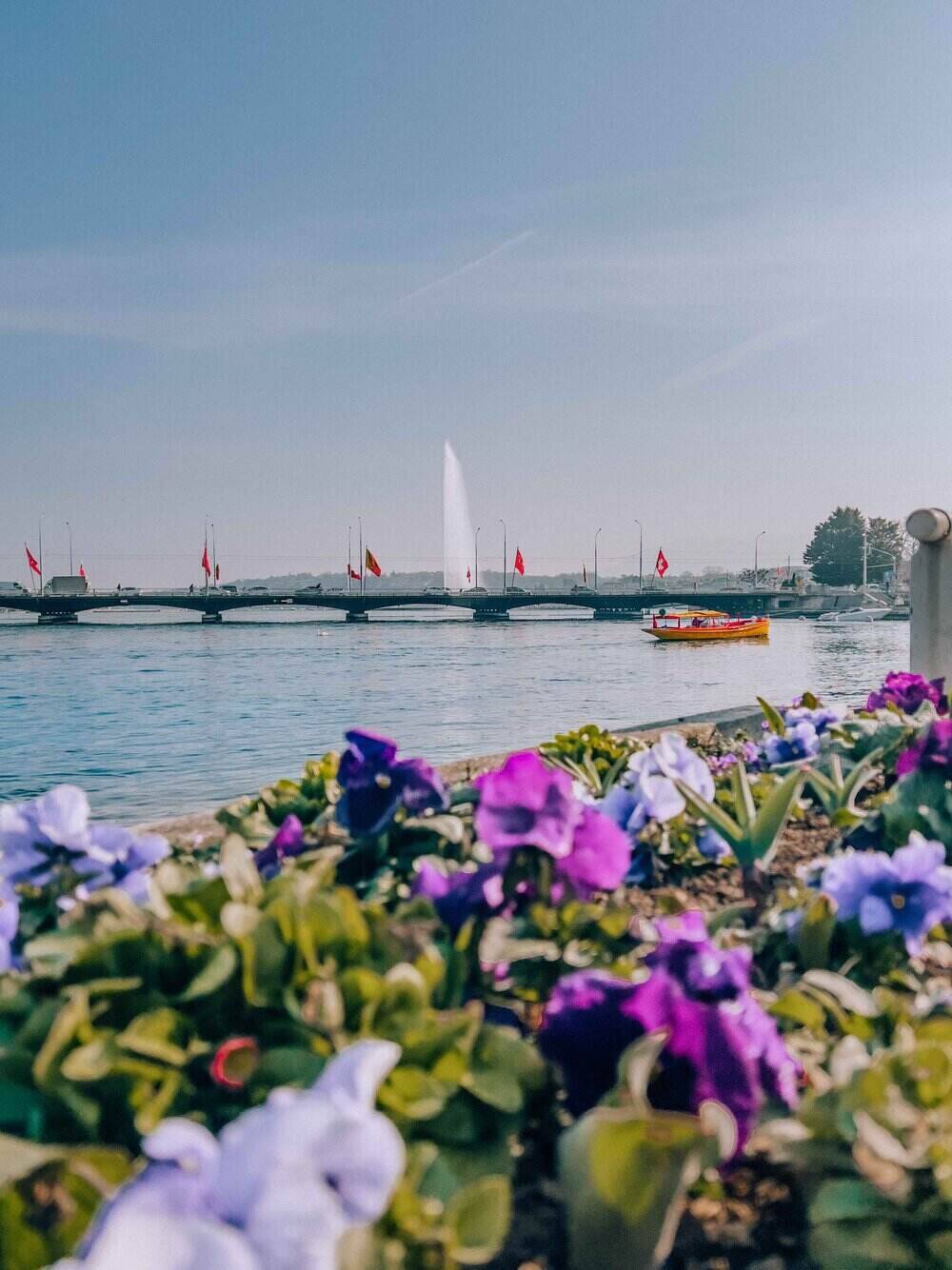
Depending on the time of year you plan to visit, each city offers different experiences.
Geneva’s proximity to the Alps makes it a great base for winter sports, while both city’s lakeside settings are perfect for summer activities.
Budget considerations
Switzerland is known for its high cost of living, and both cities are no exception.
However, the overall expenses for a tourist (accommodation, dining out, transportation) can vary between the two.
Generally, Zurich is often cited as the more expensive of the two, but there is only a small difference.
Final words
Ultimately, the decision will likely come down to what you’re looking to get out of your trip.
If the goal is to immerse yourself in a multicultural, peaceful environment with a focus on luxury and international cuisine, Geneva might be the better choice.
For those seeking a lively city experience with a rich mix of history, culture, and modern innovation, I suspect Zurich could be more appealing.
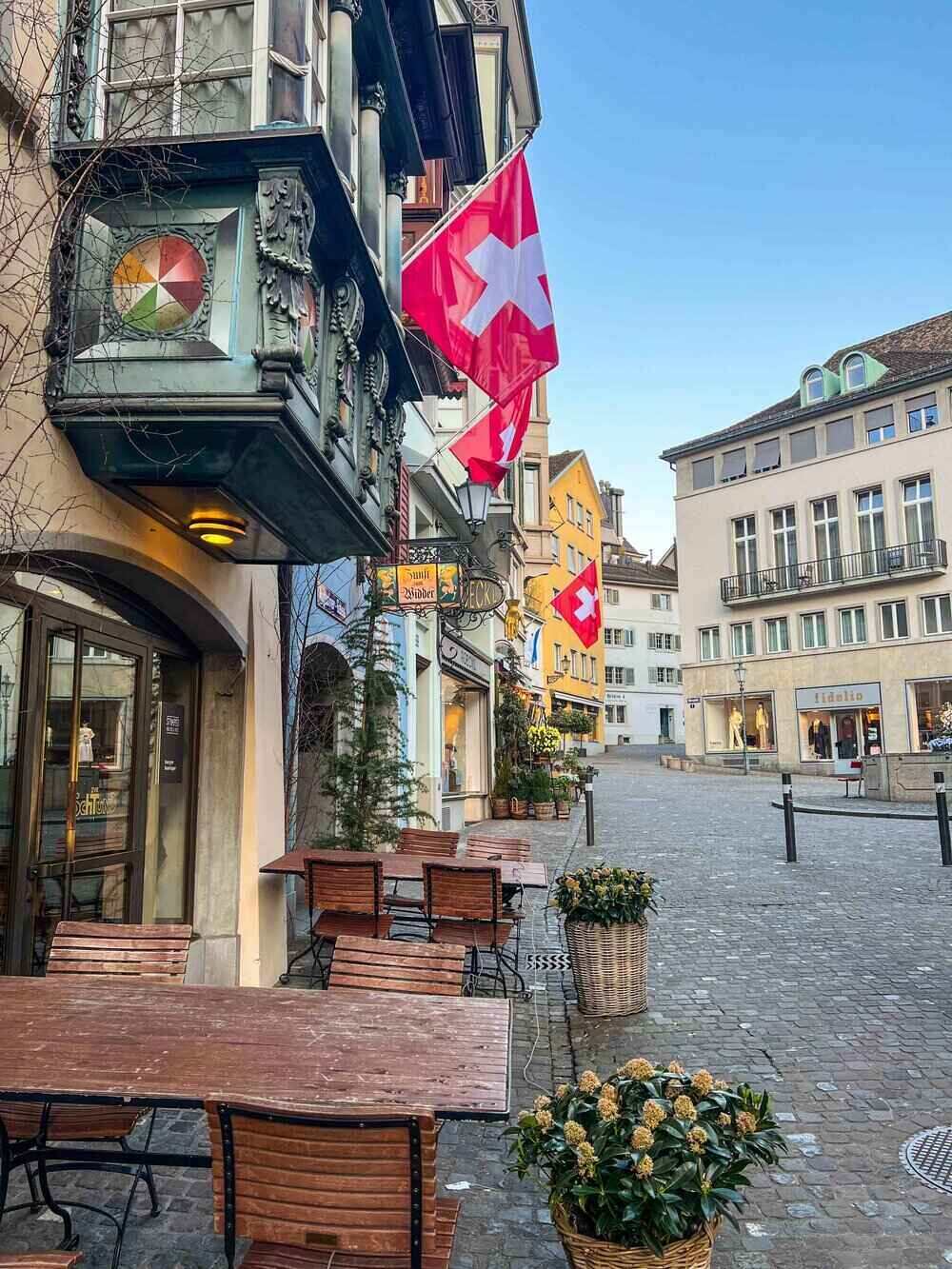
My personal opinion? If you’re looking to explore one city, I have a slight preference for Zurich. I feel it offers more in the way of culture and vibrancy, plus it feels more lively and interesting.
That said, I love the peace and quiet of Geneva, plus I end up visiting Geneva a lot more due to its proximity to the Alps.
Do you have a favourite between Geneva or Zurich? Do let me know in the comments below as I always love hearing from you!
For more Switzerland inspiration, you may also like:
- 20 best hotels in Zurich for a luxurious stay
- 21 fairytale towns in Switzerland
- 15 incredible spa hotels in Switzerland for a relaxing getaway
- 12 most scenic train rides in Switzerland
Or discover my Switzerland YouTube vlogs .
Jessie is a luxury travel expert with years of experience travelling the world to find the best destinations, hotels and adventures.
Find me on: Web | Instagram
Pocket Wanderings is a luxury travel and lifestyle brand run by London-based content creator, Jessie Moore. Here you’ll find a community of fellow wanderlusters and adventurers.
Quick Links
About Contact Privacy Policy
Zurich or Geneva? Your Best Bet in Switzerland
When it comes to the top cities in Switzerland, both Zurich and Geneva usually go head-to-head among traveler options. It would be great to have time for both, but it’s usually one or the other. Between the Financial Capital that is Zurich, or the seat of International Power that is Geneva, which would be best for travelers like you?
There is no easy answer to compare Zurich vs Geneva. It really depends on how much time and what kind of trip you are looking for. Let’s try to make it a little bit easier with a quick look at both cities.
Travel To Zurich
Zurich is a metropolitan city that sits by the waters of the splendid Limmat River, as well as having Lake Zurich right in the center. It is probably one of the most popular destinations in Switzerland and is also the country’s largest city.
This upscale banking city is famous for its thriving corporate industry, high-end shopping, and fancy chocolates. Despite being highly urbanized, Zurich has its fair share of exquisite views of the snowcapped Alps, walking streets leading to over 50 fascinating museums and more than 100 art galleries, and the Niederdorf, a section of town where flamboyant nightlife comes alive.
Train/Bus Travel Times To Zurich
Munich, Germany to Zurich: 4-5 hours (approx)
Frankfurt, Germany to Zurich: 4 hours 15 mins (approx)
Paris, France to Zurich: 6 hours (approx)
Milan, Italy to Zurich: 3 hours 30 mins (approx)
Brussels, Belgium to Zurich: 8 hours (approx)
Bern to Zurich: 1 hour 30 min (approx)
Geneva to Zurich: 3 hours
Note: Find out exact travel times and departures on the Swiss Railway website – SBB
Car Travel Times To Zurich
Munich, Germany to Zurich: 3 hours 30 mins (approx)
Frankfurt, Germany to Zurich: 3 hours 45 mins (approx)
Milan, Italy to Zurich: 4 hours (approx)
Brussels, Belgium to Zurich: 6 hours 40 mins (approx)
Bern to Zurich: 1 hour 45 min (approx)
Geneva to Zurich: 3 hours 45 min (approx)
Note: Find out exact travel times on Google Maps
Local Attractions In Zurich
The bustling international city of Zurich is surrounded by water, thanks to Lake Zurich and the Limmat River – some of the many interesting facts about this cosmopolitan city. It’s truly a mix of traditional and ultra-modern characterizes the city, creating an experience that fits every mood and every taste, any time of the day.
Lake Zurich and everything about water
Lake Zurich at Sunset
A boat tour down this lake is the best way to take in the full beauty of the city. If you’re hoping to be a little more active, you can take a refreshing dip in its pristine waters, or go on a bike ride along the shore.
If you haven’t had enough of Zurich waters, head on to the River Limmat for a paddleboat tour, or choose one of the many outdoor pools to fit for every member of the family.
Swiss National Museum, for starters
Also known as the Swiss National Museum, the Landesmuseum in Zurich houses some of the most important art collections from as early as the prehistoric era. If you’re visiting with kids under 16 years old, they can also enter the museum for free.
You can easily spend days simply visiting museums and art galleries all over Zurich, which is what the city has become very well-known for. If it’s a family trip, there are fourteen museums specifically designed for children , featuring dinosaurs, cultural exhibits, and modern-day science.
Old Town and all the culture and shopping that goes with it
It seems like every city in Switzerland has its own version of Old Town, and Zurich’s is not one to be missed. The left bank of the Limmat River makes up the Western half of the old town called Lindenhof . Here you will find Lindenhof Hill, a moraine hill formed thousands of years ago by the glacially formed accumulation of soil and rock.
It is a shaded square and is the city’s only public park within the city walls, also listed as a Swiss Heritage Site due to its historic significance. Across the river on the Eastern half of Old Town, you’ll walk through charming old streets and come to Brunnenturm at the Napfgasse.
It was built in the late Middle Ages as the headquarters of 14th-century Lombard merchants. These are just some of the many historical buildings found in the Old Town.
Old Town is Zurich’s tourism hub and for good reason. There is also Niederdorf , a pedestrian zone lined with shops in the daytime, and bars and street artists at night. This is also a place for some culinary immersion, hunting down some of Switzerland’s best cuisines in quaint cafes and alleys.
Bahnhofstrasse, Shopping Mecca of Zurich
Whether you consider shopping as an obsession, a skill, or a hobby, Bahnhofstrasse gives you 1,200 meters of the most exclusive shops you can handle. This traffic-free area is the world’s third most expensive retail property and undoubtedly the most expensive in all of Europe.
Window displays are filled with fur, fashion, and high-end goods, but even just strolling along this street is an enjoyable sightseeing activity.
Beyond the lavishness is a piece of good history, too. Some of the buildings date back to the 1900s, including the Weber building built and rebuilt in 1912 and 1928, and the Peterhof and Leuenhof buildings in 1913. There was also an old moat called the Fröschengraben, which was filled in 1867 to build the middle section of the street.
And last but not least, there is a great watch museum in Bahnhofstrasse that you should definitely check out – Uhrenmuseum Beyer Zürich, at Bahnhofstrasse 31.
Fraumunster and more religious sites
Frauenmunster Zurich
This 9th Century church also known as Women’s Church was built by King Louis the German specifically for his daughter, Hildegard. On top of being visited by aristocratic women, the Fraumunster was also given much power, where the head of the covenant was also the governor of the city until the high Middle Ages.
Now, aside from the church’s unique architecture, what really makes this church even more stunning is the set of five stained-glass windows in the chancel by Marc Chagall . Several works of art and stained glass windows have been preserved within the church walls, making it double as an art gallery.
While you’re at it, head to two historical and equally stunning churches within the city. St. Peter Kirche is the oldest Parish church in Zurich. It has gone through several transformations – originally a temple to Jupiter, then a small 8th or 9th-century church, a 10th-century church replaced in 1230 by a late-Romanesque church, a Gothic-style nave in 1460, and finally, the church that stands today was built in 1706.
Grossmunster Zurich
The Grossmunster , on the other hand, is one of Zurich’s most famous landmarks. According to legend, the church was built on top of the city’s patron saints, Felix and Regula, after Charlemagne found their graves.
Similar to St. Peter, the Grossmunster also features stained-glass window art and other important artifacts. It was also a theological college in the first half of the 16th century, which spawned out to what is now the University of Zurich .
Other Attractions
If you’re still waiting for more reasons to choose Zurich as your next destination, there is a long list of places to go and things to see. Here are even more sights and experiences worth looking into:
- Zurich nightlife is definitely a one-of-a-kind experience, with a strong techno scene and lots of underground bars and clubs to choose from. Here are some of the best Zurich nightclubs worth checking out
- The Zurich Zoo is a favorite among children. It boasts 360 animals in some of the world’s best natural enclosures
- The great outdoors is a wonderful experience from Zurich for the more active types and are easy day trips from the city. Scale the Uetliberg , Zurich’s very own mountain, take a 70-minute car ride to Mt. Titlis , one of the most popular winter sports destinations in Central Switzerland, or visit Stoos-Fronalpstock region in the summer for some hiking, biking, or just plain relaxing.
Learn more about Summer in Switzerland
The French-speaking city of Geneva is home to over 20 international organizations including the International Red Cross and the United Nations .
Geneva is surrounded by the Swiss Alps and the Jura mountains. Situated at the bay where the Rhone River leaves Lake Geneva, most of the hotels and shops in the city stand right at the shore. As with every city in Switzerland, Geneva is also filled with different museums, restaurants, and shopping districts that will surely keep anyone busy and entertained.
Travel To Geneva
Train/bus travel times to geneva.
Munich, Germany to Geneva: 6-7 hours (approx)
Frankfurt, Germany to Geneva: 6 hours (approx)
Paris, France to Geneva: 3 hours (approx)
Milan, Italy to Geneva: 4 hours (approx)
Brussels, Belgium to Geneva: 10 hours (approx)
Bern to Geneva: 1 hour 45 mins (approx)
Zurich to Geneva: 2 hours 45 mins (approx)
Car Travel Times To Geneva
Munich, Germany to Geneva: 6 hours 20 mins (approx)
Paris, France to Geneva: 5 hours 30 mins (approx)
Milan, Italy to Geneva: 4 hours 30 mins (approx)
Brussels, Belgium to Geneva: 7 hours 30 mins (approx)
Bern to Geneva: 2 hours (approx)
Zurich to Geneva: 3 hours (approx)
Local Attractions In Geneva
If you visit Geneva, it can be quite costly, but nothing too far from what you may spend in Zurich. Geneva, however, is far more quiet and more conservative as a city, which is probably why most travelers just pass through Geneva airport, skip the city, and head straight to the mountains. Despite this perception, this doesn’t mean there is less to enjoy in Geneva.
Geneva is a center for international companies and diplomacy, giving visitors something to enjoy in both simple and grand terms.
Lake Geneva and its postcard views
Lake Geneva is one of the largest freshwater lakes in Europe and gives this international city an almost perfect Swiss backdrop. Surrounded by the mountain ranges of the Swiss Alps and the Jura, sitting at the shore of the lake is almost meditative.
There are several parks that line the 73-km shore of the lake, including Jardin de Botanique , an open-air museum of flora and fauna right at the doorstep of Geneva. Go for a swim, a bike ride, or a stroll, or go full out and take a boat cruise across the lake to several nearby destinations and cities.
Geneva’s Jet D’Eau and all the grand monuments and sculptures
The star attraction in Geneva city is the Jet d’Eau , a landmark water jet situated at the center of the harbor that shoots 500 liters of water 140 meters high at a speed of 200 kilometers per hour. It was built in 1886, initially to release pressure from a water station.
It started attracting so many people that it was moved to the location where it is today. A walk around this fountain is a must and is a quintessential Geneva experience.
But the Jet D’Eau isn’t the only monument worth seeing in Geneva. There is so much historical relevance in the city, that possibly every area of Geneva has a distinguished monument. One such is the Reformation Wall , a commemoration of the Reformation. The impressive wall stands 325 feet long and 30 feet high.
It is found at the Parc des Bastions and features 15-foot-tall statues of four Geneva luminaries: John Calvin, William Farel, Theodore Beza, and John Knox. The Broken Chair sculpture is a unique but still impressive piece of, what else, a broken chair.
Built in 1997, the 12-meter high sculpture was installed in the Palais des Nations as an appeal from Handicap International to sign the Ottawa treaty and ban landmines immediately. Another popular landmark is the Brunswick Monument . This neo-Gothic-style mausoleum dating back from the 14th century is a replica of the Scaligeri family tomb in Verona, built at the request of the Duke of Brunswick.
International Red Cross and Red Crescent Museum… and more exclusive museums
Photo credit: Michael Dawes via Foter.com / CC BY-NC
The International Red Cross and Red Crescent Museum pay homage to the work of Henry Dunant, the founder of the Red Cross. The museum is a unique exhibit of the expression of humanitarian effort which will leave visitors with a sense of discovery, emotion, and reflection. The interactive exhibits educate visitors on defending human dignity, restoring family links, and reducing natural risks.
Other exclusive museums include the International Museum of the Reformation , housed in the prestigious 18th-century Maison Mallet at Cour Saint-Pierre, which recounts the religious reformation movement.
The Patek Philippe Museum is home to the works of the Geneva-based firm of master watchmakers, and the Bodmer Foundation is a library and museum that specializes in manuscripts and special editions.
Old Town and the History of Geneva
Yes, Geneva has its own Old Town, full of history and character and a must-visit for any traveler. It is a maze of small streets lined with beautiful masonry facades, filled with cafes, historical sites, and of course, quite a bit of shopping.
At the center of the town is the oldest place in Geneva called the
Place du Bourg-de-Four Geneva
This is where the Roman marketplace used to trade wares and is now a tourist area filled with exclusive shopping experiences and quaint cafes. The world-famous St. Peter’s Cathedral sits at the peak of the hill where Old Town is located and is over 850 years old. The Maison Travel , on the other hand, is Geneva’s oldest private dwelling. It is now a six-story museum and a testament to medieval civil architecture.
The Globe of Science and Innovation and everything at CERN
If you’re in any way into Sci-Fi movies, books, or genres, you have probably heard of CERN – one of the world’s most recognizable and important centers for science, discovery, and innovation. At CERN you will find the Globe of Science and Innovation , which is a tribute to Earth and CERN’s message to society in the field of science, particle physics, and cutting-edge technology.
The globe is made of wood, showcasing much skill and innovation in carpentry, and houses a permanent exhibition depicting significant research carried out by CERN.
Visitors are also allowed to visit CERN itself, with various tours and exhibitions available for the public.
There is certainly so much more to see in Geneva, and a tour around the city is educational as it is breathtaking. Some more sites you should try not to miss are:
- The Palais des Nations is visited by 15,000 people every year. It was built between 1929 and 1938 and is now the home of the United Nations Office of Geneva.
- Day trips from Geneva to nearby mountains are also quite easy to do. Within a few bus stops and a cable car ride is Mont-Saleve . Here you can find impressive views of Geneva and other sports activities like paragliding, mountain biking, and cross-country skiing in the winter.
- Geneva has even more u nique areas to visit. Carouge is the Greenwich Village of Geneva with a Bohemian atmosphere with quaint shops, cafes, and trendy bars. The Bains District is home to MAMCO, the Centre d’Art Contemporain, and many other galleries, also considered the European platform of modern art.
Zurich or Geneva – A Short Summary
While Zurich and Geneva are both highly urbanized and sometimes expensive, cities, there is a world of difference when it comes to the kind of experience you will get.
Visit Zurich for:
- The ultimate shopping experience. You will not find a shopping district as exclusive and as high-end as what you will get in Zurich
- So much history and culture. With the sheer amount of museums and galleries, every turn in Zurich is a testament to the history of the city and of Switzerland, combined with religious structures that double as historical monuments themselves
- An intense party scene. After a day of culture, education, and architectural immersion, Zurich is the place to be for all-nighters and hangovers
Visit Geneva for:
- Knowledge. Geneva’s museums and visitor centers are dedicated to specific fields, whether it be science and innovation, humanitarian action, or religious movements
- Monumental sights. Sightseeing in Geneva is all about grandeur. Monuments and sculptures don’t get any bigger than what you will find in this city
- Strolling and reflection. Parks, communities, and promenades are made for unhurried walks and just soaking in the beauty of your surroundings
The truth is, there is a little bit of everything in both Zurich and Geneva. Whether you go to one or the other won’t be any loss at all. Either way, Switzerland is a beautiful country to visit, and any city you choose to travel to will always be an excellent place to see.
About the Author Roger Timbrook
Roger is a little obsessed with travel. He has been to over 40 countries, broken 3 suitcases and owned over 10 backpacks in 12 months. What he doesn't know about travel, ain't worth knowing!
Leave a Comment:
Save my name, email, and website in this browser for the next time I comment.
- Overview Guide
- 1 Week Itinerary
- Train Journeys
- Epic Drives
- Stunning Lakes
- Historic Castles
- Lauterbrunnen
- Grindelwald
- Chocolate Tours
- Swiss National Park
- Majestic Mountains
- Spectacular Waterfalls
- Famous Things
- Tasty Fondue
- 10 Day Itinerary
- Cherry Blossoms
- Tokyo Shrines
- Dos and Don’ts
- Osaka Guide
- Osaka Itinerary
- Osaka or Kyoto
- Kyoto Day Trips
- Matsumoto Castle
- Tokyo Luxury Hotels
- Island Hopping
- Best Campsites
- Driving Tips
- Beaune, France
- Barcelona Itinerary
- Spain Itinerary
- Greece Itinerary
- Italy Road Trips
- Berlin Day Trips
- Norway Northern Lights
- Netherlands National Parks
- Mostar, Bosnia
- Best Airlines
- Midwest Ski Resorts
- Florida RV Parks
- Washington RV Parks
- Oregon RV Parks
- Utah Camping
- Texas Camping
- Chicago National Parks
- East Coast National Parks
- Colorado National Parks
- Joshua Tree
- Yellowstone
- Alberta Hikes
- Flashlights
- Water Filters
- Sleeping Pads
- Solar Lanterns
- Tent Brands
- 4-Person Tents
- 4 Seasons Tents
- Backpacking Tents
- Beach Tents
- Cabin Tents
- Multi-room Tents
- Pop-up Tents
- Truck Bed Tents
- Underwear (Men)
- Backpacks Under $100
- Microspikes
- Boonie Hats
- In The World
- New Zealand
- Hardisde Luggage
- Lightweight Luggage
- Luggage Sets
- Spinner Luggage
- Durable Suitcases
- Duffel Bags
- Kids Luggage
- Teen Luggage
- Space Saving Luggage
- Business Carry-Ons
- Garment Carry-Ons
- Suitcases Under $50
- Travel Briefcase
- Zipperless Suitcases
- Rolling Briefcase
- Luggage Straps
- Luxury Brands
- American Tourister
- AmazonBasics
- Delsey Chatelet
- Anti-Theft Backpacks
- Backpacks Under $50
- Baby Carrier Backpacks
- Cooler Backpacks
- Backpacking Backpacks
- Climbing Backpacks
- Backpacks for Back Pain
- Beach Backpacks
- Hiking Backpacks
- Business Travel Backpacks
- Laptop Backpacks
- Backpacks for Tablets
- Commuter Backpacks
- Travel Backpacks (Men)
- Travel Backpacks (Women)
- Waterproof Backpacks
- Wheeled Backpacks
- Down Jackets
- Down Parkas
- Fleece Jackets
- Hardshell Jackets
- Rain Jackets
- Softshell Jackets
- Eco Friendly Jackets
- Gore Tex Alternatives
- Heated Jackets
- Lightweight Jackets
- 3-in-1 Waterproof Jackets
- Parajumper Jackets
- Rain Poncho
- Ski Jackets
- Travel Hoodies
- Travel Jackets
- Winter Coats
- Helly Hansen
- Mammut Jackets
- Patagonia Nanopuff
- Survival Jackets
- Flower Captions
- Waterfall Captions
- Tree Captions
- Sunset Captions
- Sunflower Captions
- Rainbow Captions
- Paddle Boarding Captions
- Hot Air Balloon Captions
- Kayaking Captions
- Airplane Captions For Instagram
- Forest Captions
- Skip to primary navigation
- Skip to main content
- Skip to primary sidebar

Destinations
Experiences.
- Photography
Plan Your Trip
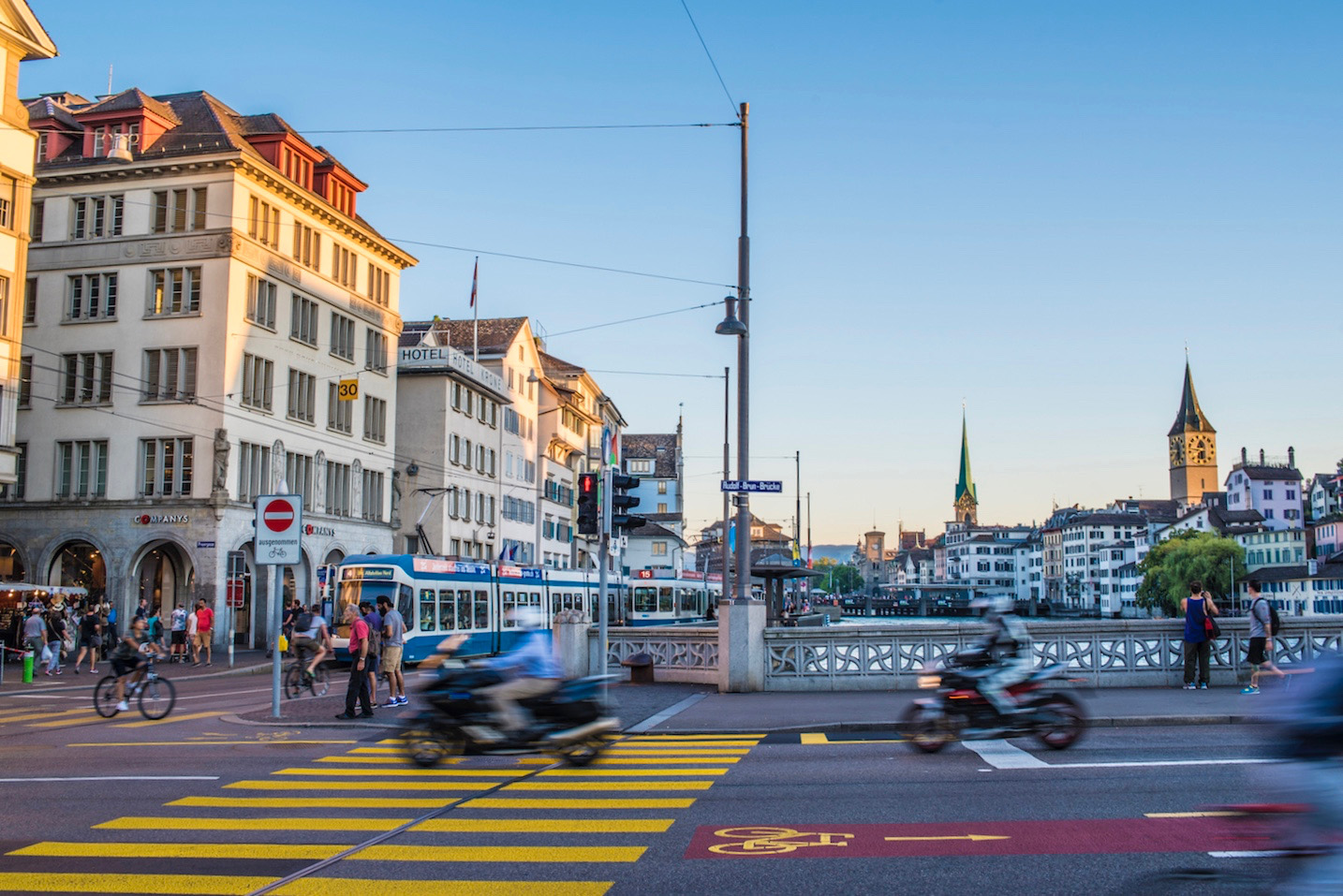
Switzerland’s Ultimate Urban Rivalry
November 9, 2021 by Robert Schrader Leave a Comment
The unfortunate truth about comparing Zurich vs Geneva? Neither of these cities are top Switzerland destinations in and of themselves—most people still in either or both on their way to somewhere else.
On the other hand, there are important differences between Zurich and Geneva . Given the relative proximity of both to more exciting environs, it’s worth taking these into account, if only to choose a more enjoyable base for your broader travels throughout the country.
Regardless of where your head is at now, I imagine you’ll feel much more clarity when you finish reading this article. Switzerland, no matter where you end up seeing it from, is closed than ever.
How I Came to Know Geneva and Zurich
For me, the Geneva vs Zurich debate started years before I visited the former. I remember Bianca and I were walking through Zurich Haubtbahnhof, likely stoned off our asses, when a train bound for Geneva (“Genf,” according to the German-language announcement) was just about to department. “Can you imagine if you were on that train?” She laughed. “It would be so awful.”
To be fair, since Bianca lives outside Zurich-proper, I actually hadn’t really gotten to know Zurich very well by that point; it took me until roughly 2016, which was my 9th or 10th trip to Switzerland . By contrast, I only got around to visiting Geneva in 2021 (the year I’m first writing this piece), by which point I was well-traveled enough to judge the city not only in the context of Switzerland, but indeed most of the rest of the world.
Ways to Compare Geneva vs. Zurich
Things to do.

Neither Geneva nor Zurich are tourist paradises. The rivers and lakes that run through each figure heavily into their appeal. Zurich’s Grossmünster and Fraumünster churches sit on either sit of the River Limmat , which empties into Lake Zurich, a favorite place for sunbathers and pot smokers. In Geneva, meanwhile, you can marvel at La Jonction between the Rhône and Arve Rivers , or admire the Jet d’Eau from Lac Leman .
Places to stay
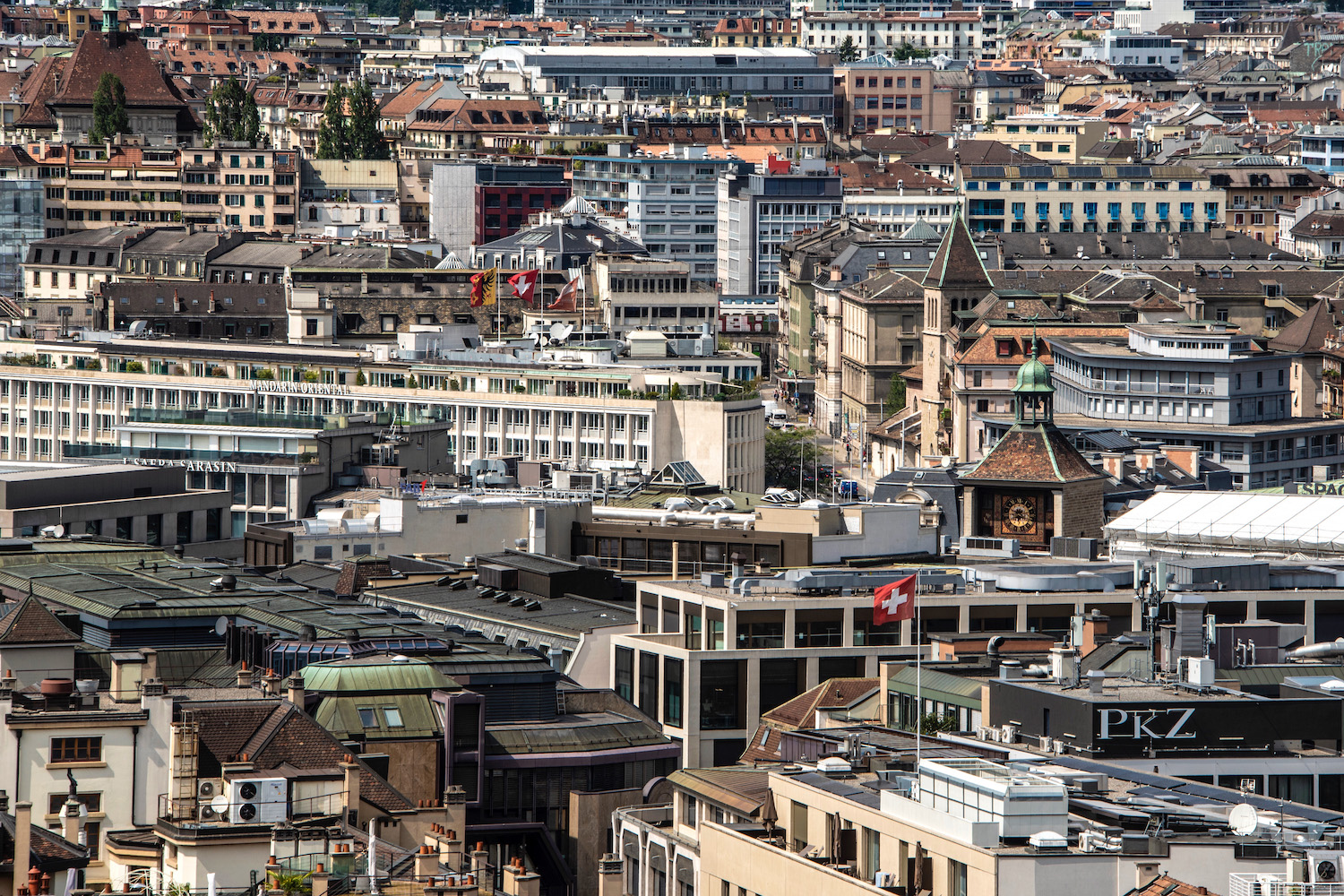
Another way to compare Zurich vs Geneva is in terms of places to stay. Both are home to their fair share of Airbnb apartments, and hotels that are high quality and centrally located, but relatively expensive. This is the case in Zurich, where Hotel Arlette Beim sits within walking distance of most central attractions, as well as Geneva’s Hotel la Cigogne , which is a stone’s throw from its own small Old Town .

Restaurants
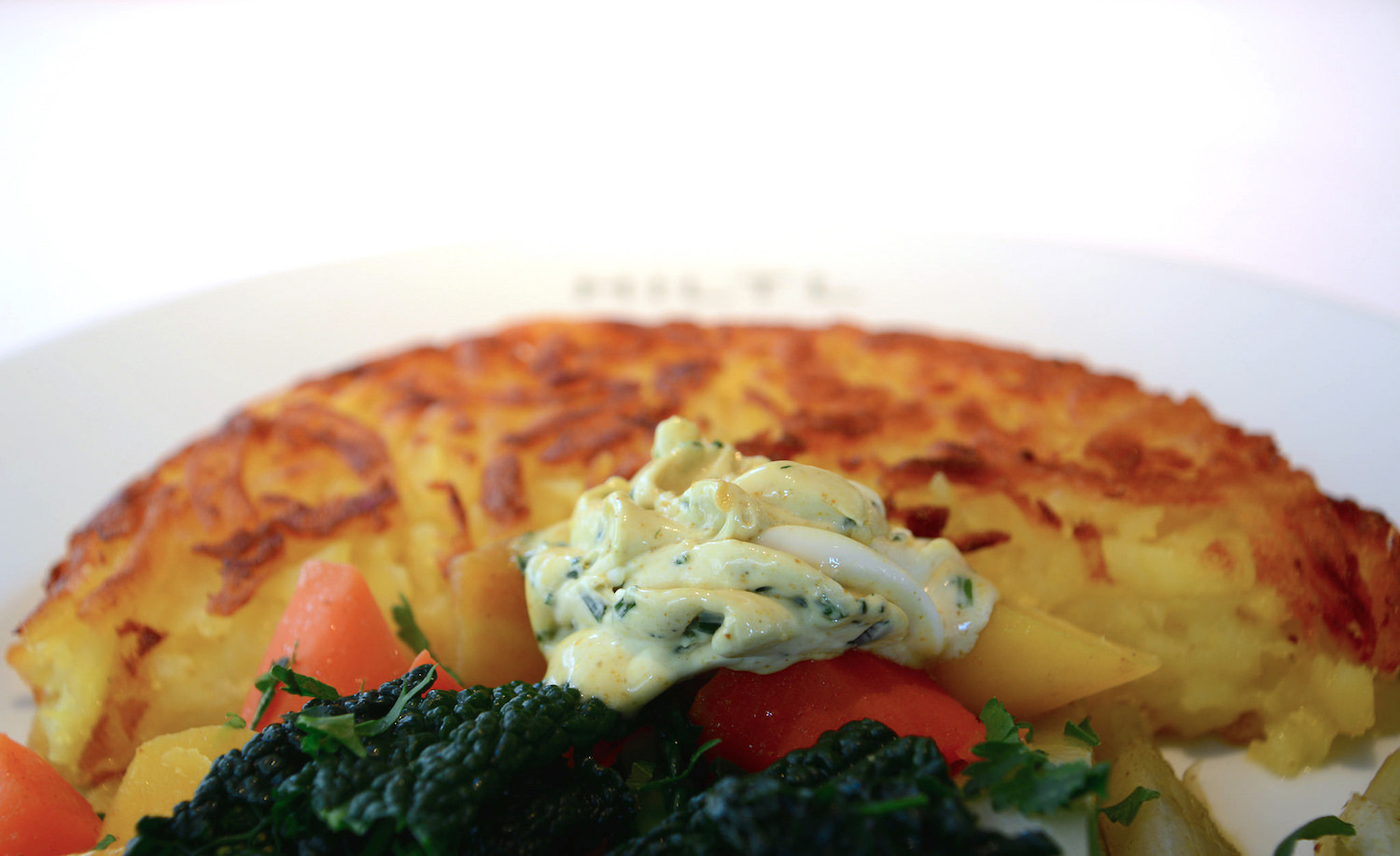
The bad news? The best Swiss food is almost always found in the mountains, whether that’s globally-known classics like raclette and fondue , or rösti , a dish most people seem to discover only after arriving in Switzerland. The good news? Both Zurich and Geneva offer a wide variety of restaurants from around the world—although, again, you’ll need to prepare to pay for your experience.
Language and culture
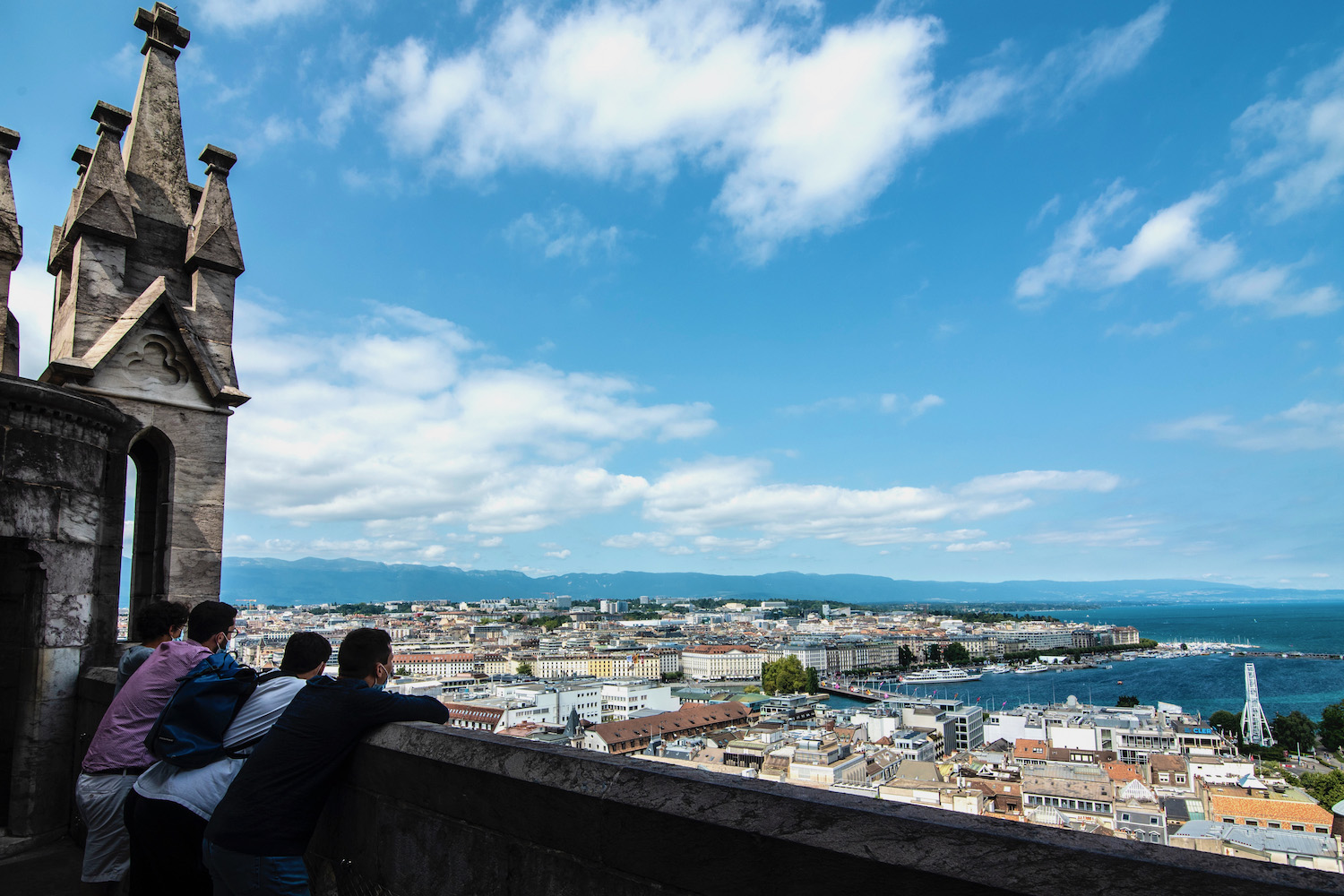
The most obvious difference between Zurich vs Geneva is that people in Zürich speak German, while those in Genève speak French. Of course, these linguistic differences manifest themselves in the broader culture as well. On the other hand, both cities have distinctly Swiss architecture which, when combined with the distinctly Swiss landscapes that rise above both, makes them seem far more similar than different in this regard.
Nearby destinations
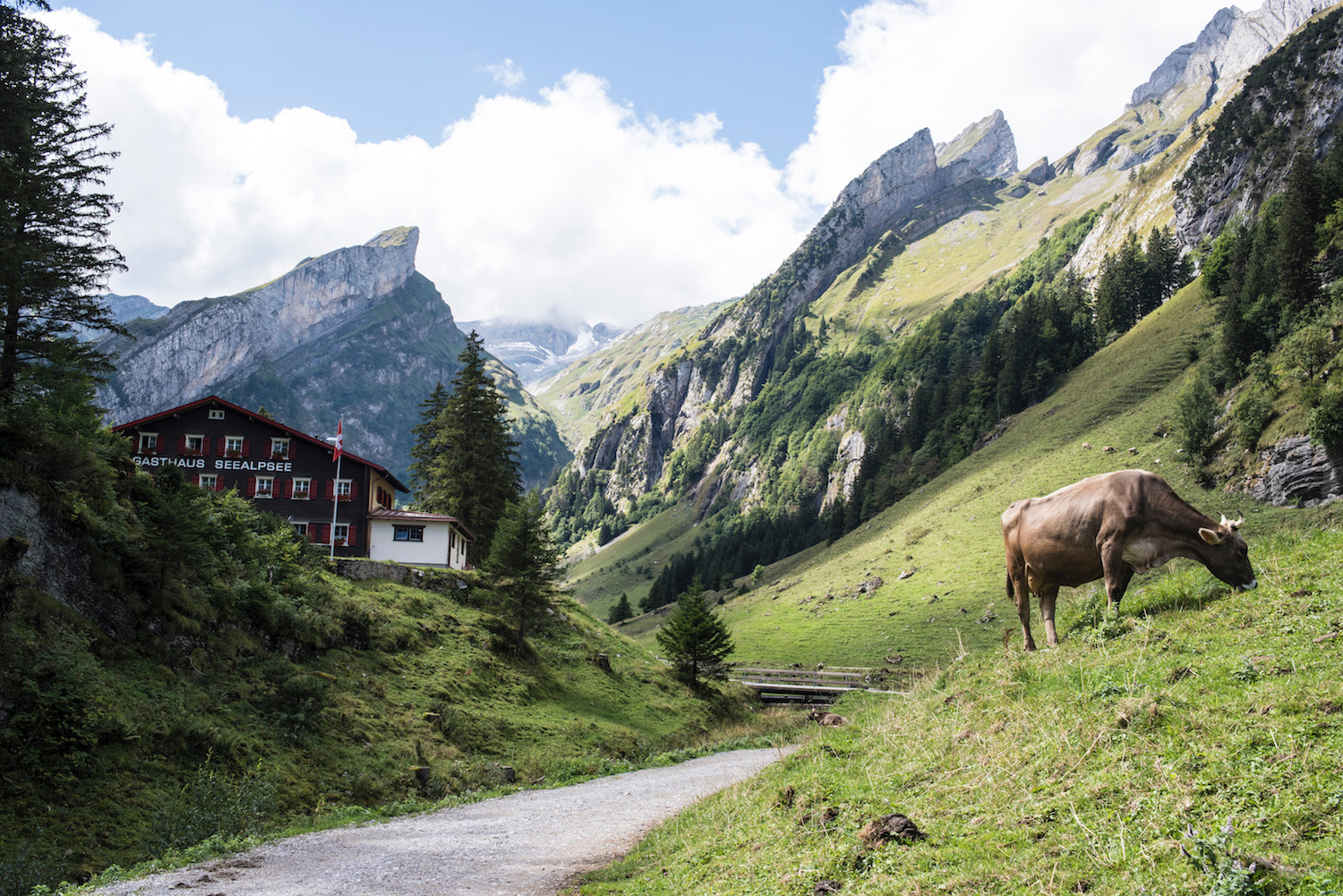
Both of Switzerland’s largest cities are better jumping-off points than they are tried-and-true destinations. From Zurich, the most obvious onward stops at Rheinfall waterfall north of the city, the castle town of Baden to the northwest and Luzern or Interlaken to the south. In Geneva , meanwhile, you can easily take day trips to cities like Lausanne and Montreux on the eastern shores of Lac Leman, or to Annecy, France on its western flank.
What is the Prettiest City in Switzerland?
It’s neither Geneva nor Zurich. I mean look, both of these cities are beautiful in their own rights. They’re bisected by crystalline, clean rivers, which flow into massive, glacial lakes with horizons that jut up against mountains. Small enough to explore on foot but strung together with safe and easy-to-use tram lines, they’ve more than earned their high rankings on “Quality of Life” lists, even if the cost therein is steep.
Indeed, we have to move away from the Geneva vs Zurich debate if we truly want to identify Switzerland’s most beautiful city. In terms of actual large-ish cities, I’d probably say that Montreux, Luzern or Interlaken easily take the title of “most beautiful” from Geneva or Zurich. When we expand this to small towns in Switzerland? Well, that is a rabbit hole I just don’t have time for at the moment.
Other FAQ About Zurich and Geneva
What is the difference between geneva and zurich.
The primary difference between Geneva and Zurich is that people in the former speak French, while those in the latter speak German. Both cities are very international thanks to the rise of teaching English abroad , although Zurich is more of a banking center, while diplomacy is the primary industry and currency of Geneva.
Is Geneva worth seeing?
Geneva is worth seeing, but only if you do so with appropriate expectations. Rather than a standalone European city à la Paris or Venice , which acts as a self-contained destination, Geneva is more a jumping off point before exploring more exciting parts of Switzerland.
Is Zurich more expensive than Geneva?
Zurich and Geneva are approximately as expensive as one another, at least as far as travelers are concerned. You can expect to spend no less than 200 CHF per person, per day for your accommodation, meals and local transport (not including internationals flights/trains to and from Switzerland), whether you visit Geneva or Zurich.
The Bottom Line
I hope I’ve helped, at least partially, to settle the Zurich vs Geneva debate for you. The good news, no matter which of these cities you choose, is that both are basically bases for seeing more exciting destinations in Switzerland, namely the Swiss Alps. The better news? Since few people’s first trips to Switzerland end up being their last, you can always stay in Zurich next time if you choose Geneva this time, or vice-versa. No matter how many times you’ve been to Switzerland or are yet to go, consider hiring me as your Travel Coach . When you let me sweat the details, you have more time and energy to enjoy your trip!

Subscribe to email updates!
Words, images and design ©2009-2024 Robert Schrader, All rights reserved. Read Privacy Policy or view sitemap .
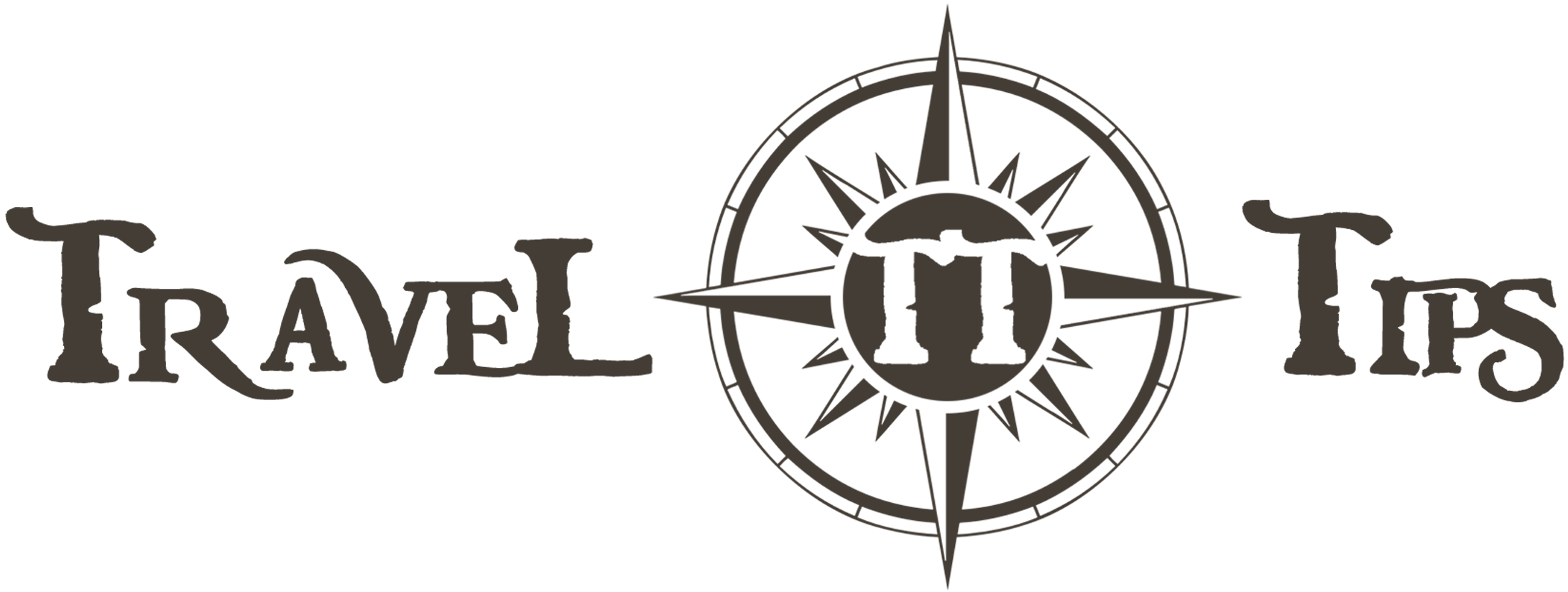
Geneva vs. Zurich: Which Is Better for Vacation?
Are you visiting Switzerland soon but not sure whether to visit Geneva or Zurich? It’s a dilemma that many first time travelers to the country have to navigate. Both cities are the biggest in this Alpine country and offer a wide range of experiences. It would be great to visit both, but if you can’t, where should you start?
Geneva is better for vacation if you are more interested in gaining deeper insights into the international organizations making a difference in the world and learning history from museums and monuments. Zurich is better if you are looking for a shopping experience, excellent nightlife, and culture.
Torn Between Geneva and Zurich?
This Geneva vs. Zurich quiz was designed by locals to remove all doubts…so you don’t blow your life savings on the wrong vacation!
The rest of the article will compare both cities based on the main topics you’ll be interested in when looking for holiday destinations.
Cost of Stay
Geneva is ranked in the top 10 for the most expensive cities in the world. This should give you an idea of what a vacation there could cost you. On average, you should plan to spend around $162 (CHF153) per day on your vacation here. Meals cost an average of $40 (CHF38) per day, and you should expect to spend around $10 (CHF9.42) on local transportation.
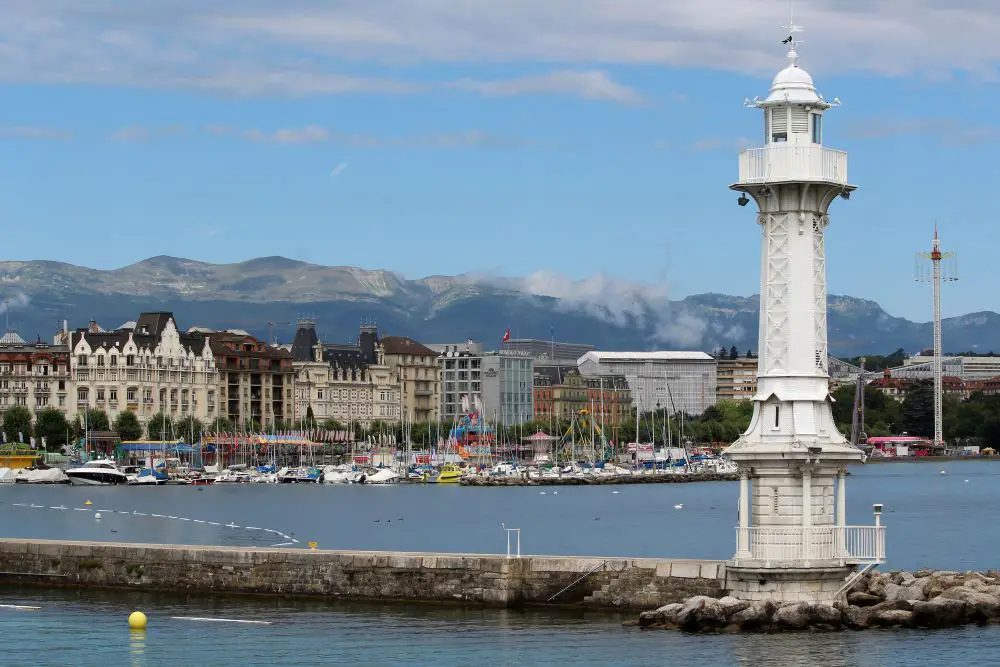
Hotel fees make up the bulk of the expenses on a trip to Geneva. You should expect to pay around $150-$200 per night on average. Based on these averages, you should expect to spend around $1139 (CHF 1073) on a one-week trip alone to Geneva.
Best Affordable Hotels
To keep your costs down while in Geneva, you should consider staying in affordable hotels like the following:
- ibis Geneve Centre Nations (starting from $100 per night for one room)
- Aparthotel Adagio Genève Mont-Blanc (starting from $110 per night for one room)
- City Hostel Geneva (starting from $84 per night for one room)
- Hotel de Geneve ( starting from $90 per night for one room)
- Hotel Central (starting from $100 per night for one room)
Zurich is ranked in the top 5 on the list of the most expensive cities in the world. This should immediately tell you that prices will be slightly higher here, compared to Geneva. Most changes can be seen in the cost of food and transportation. Hotels are slightly costlier as well. On average, you should expect to spend $1390(CHF 1310) on a one-week trip alone to Zurich.
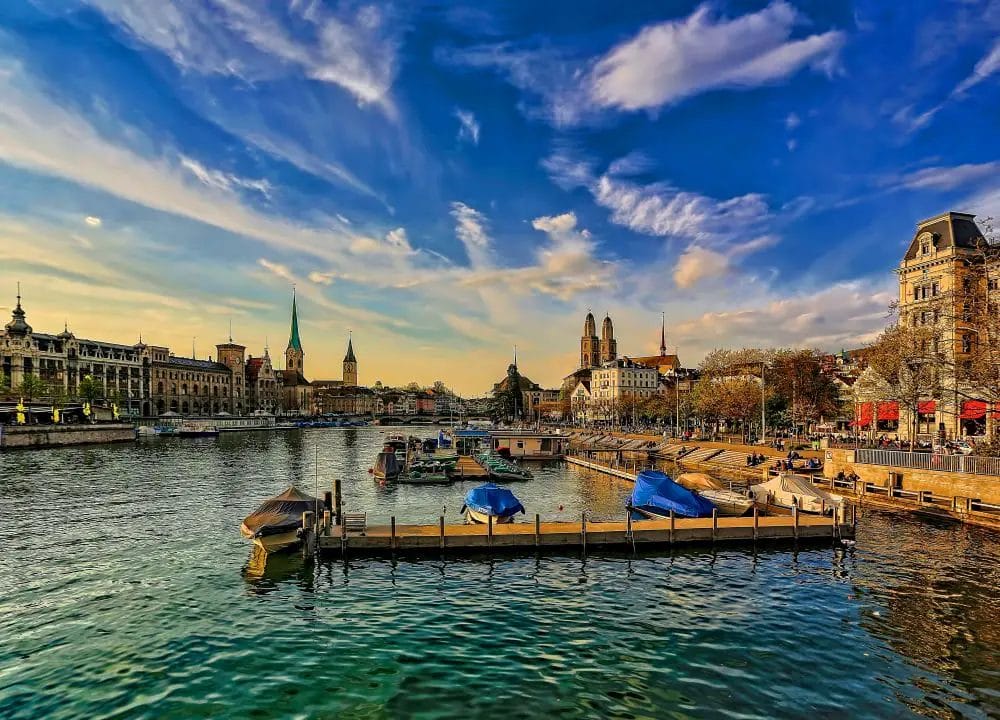
You can keep your expenses down if you stay at these affordable hotels in Zurich:
- H+ Hotel (starting from $113 per night for one room)
- Green Marmot Capsule Hotel (Starting from $72 per night for one room)
- Holiday Inn Express (Starting from $110 per night for one room)
- DORMERO Hotel Zürich Airport (starting from $98 per night for one room)
- Zum Guten Glück (starting from $87 per night for one room)
There are other ways you can keep your costs down while in Zurich or Geneva including cooking your own meals, buying beers at grocery stores instead of drinking at restaurants, considering Couchsurfing instead of paying for a hotel, and more . On the surface and barring any special approaches to keep costs down, a Zurich vacation will most likely cost more.
Main Attractions
Geneva may be where the UN and the Red Cross headquarters are located, but that’s not all to this picturesque city. Lake Geneva is the star of the show here as most vacationers love to capture the view of the snow-covered Alps from the lake.
The Jet d’Eau (Water Jet) is a 145-meter “tower” of water that has become a must-see in the city. The Bains des Pâquis gives some of the best seats in the house for viewing this attraction. If you love historical monuments, you have to see the Temple de Saint-Pierre, dating back to 1150. Climbing to one of the towers is a great way to enjoy an exquisite view of Lake Geneva and the rest of the town.
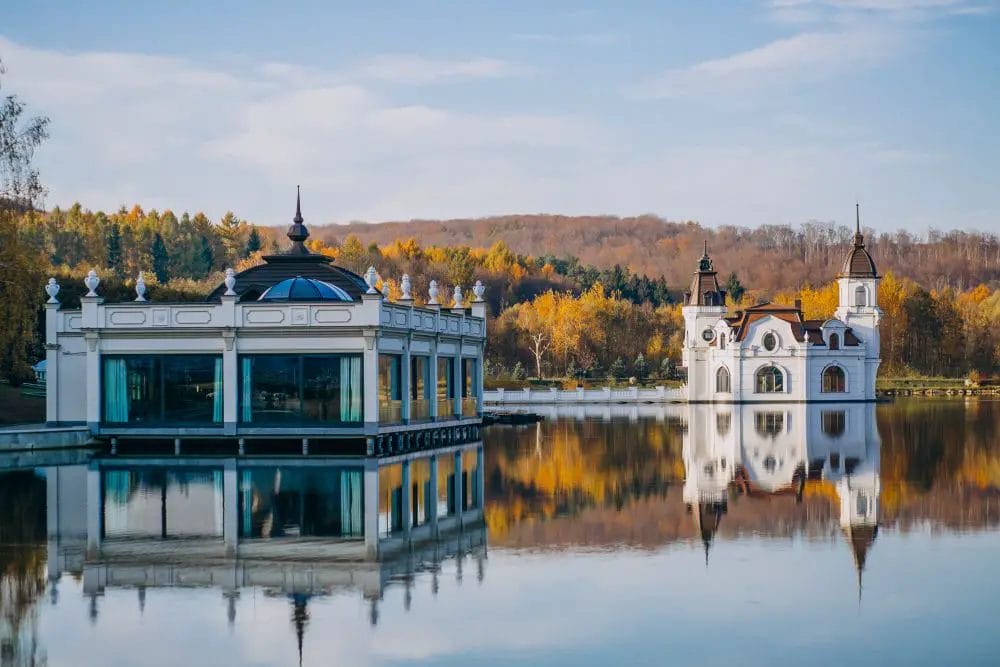
Other top attractions in the city include Jardin Anglais (English Garden) and Parc de la Grange, Jardin Botanique (Botanical Gardens), Place du Bourg-de-Four, Palais des Nations, Musée d’Art et d’Histoire (Art and History Museum), Monument de la Réformation and Parc des Bastions, Patek Philippe Museum, Ariana Museum and Quai du Mont-Blanc.
The attractions in Zurich include numerous outdoor destinations and architectural marvels. The Old Town is the top destination for history lovers. Here, you’ll find the house where Lenin lived in 1917. Other notable attractions in this town include the Shoemakers Guild House (which has been converted to a theatre), the Hans Zum Rech and the Grimmenturm.
The Uetliberg is a favorite amongst locals and tourists as it provides the best views of the city and Lake Zurich. The lake is another hotbed of activity, with lots of parks and promenades spread across the entire shoreline.
Bahnhofstrasse is Zurich’s main street. Here, you can expect to get some of the best shopping experience in the world, with many renowned brands operating businesses here.
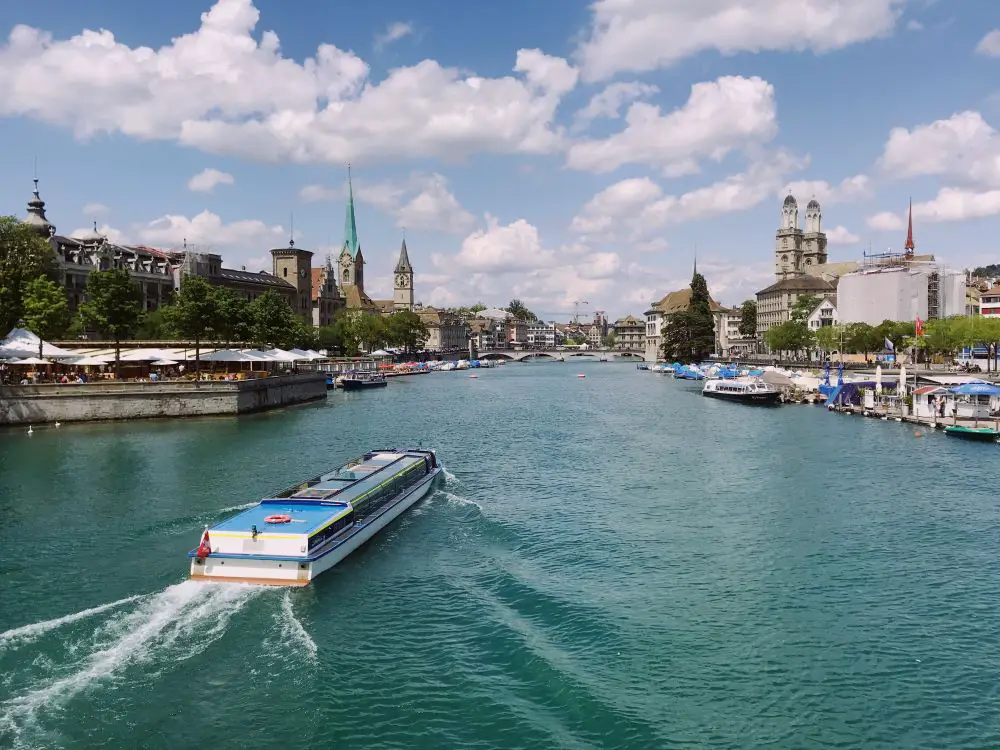
Other attractions include the Kunsthaus Zürich (Museum of Fine Arts), Fraumünster, Lindenhof, Limmatquai and the Rathaus (Town Hall), Schweizerisches Landesmuseum (Swiss National Museum), Grossmünster (Great Minster), Rietberg Museum, Zurich Zoo, St. Peter’s Church, Bellerive Museum, Confiserie Sprüngli, and the numerous nightclubs which give the city a nightlife that can’t be matched anywhere else in the country.
The food in Geneva is a good reminder of the multicultural nature of this city. You’ll find restaurants offering standard European cuisine and others going as far as North America and Asia.
If you are more interested in eating food native to the region, your options are endless. Some popular options include the Café de Paris Sauce, Boutefas, Tomme Vaudoise, Petite Arvine, Abricotine, Tomato Fondue, Papet Vaudois, L’Etivaz and more.
A typical meal will cost around $15 for one person on average in Geneva. Some cheap restaurants to visit in Geneva include:
- Les Brasseurs : Swiss, German, and Asian cuisine.
- Cottage Café : European cuisine in a quirky environment.
- Chez Ma Cousine : Chicken-centric bistro.
These restaurants provide a three-course meal for less than $50. If you’d like to splurge on an expensive dining experience that will cost over $100 for a three-course, you can consider the following restaurants:
- Patara : Exclusively Thai cuisine.
- Chateauvieux : Exclusively French cuisine.
- Auberge du Lion d’Or : Seafood cuisine.
The Zurich culinary landscape is one of the best things about the city. You’ll find traditional food from the 26 cantons in Switzerland and cuisines from neighboring Schengen countries. The city also has some of its own specialties.
Some of the top dishes popular amongst tourists in the city include the cheese fondue (the first recipe was recorded in Zurich ), Rosti, Raclette, Bündnerfleisch, Zopf, Bündner Gerstensuppe and more.
Meal prices will vary from place to place while in Zurich, but you should expect to spend around $42 per day on food. The average meal for one will cost around $20. Some accommodation deals offer free breakfast, so you’ll only have to worry about buying lunch and dinner.
Some cheap restaurants to visit in Zurich for three-course meals cheaper than $50 include:
- Thach : Asian cuisine.
- Restaurant Bar 8001 : Swiss cuisine.
- Restaurant Hiltl : Vegetarian cuisine. It is also a Guinness Book of Records holder for the world’s oldest vegan restaurant.
- La Fonte : Italian cuisine.
For pricier restaurant options with meals costing over $120 for a three-course, you should consider the following:
- Rico’s : Modern European cuisine.
- Kronenhalle : Classic European cuisine.
If you are on a tight budget and looking for food under the average prices listed for both cities, you should talk to the locals about where to eat. Some food vans, grocery stores, and small cafes offer great pizza, sausages, cakes, noodles, and more at affordable rates. As you’ve seen above, you can also cook your food to save costs—if your accommodation allows it.
What’s the Weather Like in Geneva and Zurich?
The coldest months in Geneva (January to April) can get as cold as -1.0°C (30.2°F) on average. From May to September, the warm weather sets in, with temperatures going as high as 26.5°C (75.2°F) in July.
The weather in Zurich can drop to as low as -1.6 °C (29.1°F) on average in the winter months of January to April. During the warm months of May to September, the average temperature can go as high as 24°C (75.2°F).
With these numbers, it is clear that both cities have almost identical weather. The best time to visit Geneva or Zurich will come down to your preferences. If you are looking for warm-weather holidays, June to August is the best time to visit, with July typically the hottest month in both cities. You’ll be able to swim in the lakes and enjoy the wide range of water sports offered.
November to February is when to visit if you are looking for winter holidays, and perhaps an adventure at the Ski Slopes of the Swiss Alps. January is the coldest month in both cities on average.
How Safe Are Geneva and Zurich?
Geneva is a relatively safe destination for tourists. However, criminal activities still occur from time to time. Most of the crimes are, however, non-violent. In 2016, there were six murders in Geneva . Toledo, Ohio, a city of similar population in the US, recorded 36 murders in the same year.
Typical crimes you should watch out for include pickpocketing, burglary, and petty theft. The hot spots for these crimes are public spaces where pickpockets try to distract unsuspecting people and steal valuables.
Zurich is also as safe as Geneva, with the same occasional cases of non-violent crime of pickpocketing in public spaces. You can avoid these crimes by taking some basic precautions .
While in Geneva or Zurich, you should stay away from protests or large gatherings. Some of these have turned violent in the past.
Geneva is a small city that can be easily navigated by tram. You can also walk to shorter distances easily. As a tourist, you can use the Geneva Transport Card to get on trams, water taxis, trains, and buses. Depending on your transport needs, however, the public transport options, run by Transports Publics Genevois , can be slower and less convenient.
Fares on the tram start at $2, but with the Geneva Transport Card—which you’ll be given for free after check-in at your hotel or hostel, means you can ride free of charge on all public transport within Zone 10.
If you are in a hurry, you can hail a taxi. The local taxis tend to cost more than Uber. The meters start at around $7 and will increase by the same amount for every kilometer. The taxi companies in Geneva include Taxiphone , Taxi Geneva , and Taxi Ambassador . You’ll also pay extra charges for luggage.
You can also hire a car, but the rush hour traffic and the limited parking space means you should only do this when you have to drive yourself.
TPG trains are the best way to get to and from the airport. If you are going to routes around Lake Geneva, you should use the yellow water taxis known as the Les Mouettes. The boats depart every ten minutes and will cost around $3 for rides lasting up to an hour if you don’t have the Geneva Transport Card.
The transportation network in Zurich is similar to what you’ll see in Geneva, except that more people use their bikes or walk. Most of the main attractions are cited closely together so you can see all you set out to see without getting on any transport.
If you need to use a bike, you can hire one with a refundable deposit of $21 and your passport or other ID.
The city’s tram system is always there if you get tired of walking or using your bike. The Zurich Public Transport (VBZ) also runs a network of cable cars, trains buses, and boats. The tickets cost around $3 on average per adult, but you can get day passes for $6.
You can save money by getting a Zurich Card which offers you free travel on public transports for 24 or 72 hours. The card also gives you access to discounts or free admissions to most museums. Some stores and restaurants also offer discounts to cardholders. The Zurich Card costs around $29 for 24 hours and $56 for 72 hours per adult.
Taxis are also expensive in Zurich, with the meter starting at around $6.50. Every kilometer traveled on top costs $4. The taxi companies in Zurich are iTAXI and 7×7 Fahrdienste . Again, Uber works here and will most likely be cheaper than taxi companies.
Driving in Zurich is as difficult as it is in Geneva. The streets are super congested, and parking spaces cost a premium when available. You’ll struggle to find parking spaces in most hotels too. If you must drive, your US driver’s license will suffice, and you can rent a car from a few companies like Europcar and Alamo .
As a US passport holder, you can travel to Geneva or Zurich for stays of up to 90 days without a visa.
General Tips
- Zurich and Geneva frown at littering.
- English isn’t an official language in any of the cities. While it’s common to find English-speakers, French and German are the predominant languages in Geneva and Zurich, respectively.
- You need to convert your dollars to Swiss Francs when traveling to Geneva or Zurich. Most shops won’t take US dollars or Euros.
- Tips are incorporated into the advertised meal prices, so you don’t need to tip the staff.
Final Words: Zurich vs. Geneva
So, should you go to Geneva or Zurich for a vacation?
You should choose Geneva if you are a history and world politics enthusiast that also doesn’t mind some adventure on the side. If you’re looking for a more conventional vacation experience filled with lots of food, hikes, partying, and shopping, Zurich is the more rounded destination.
Remember to align your trip to the best times of the year to visit based on your ideal activities. January is the best month for a winter-themed vacation, while July is the best time to go for warm-weather adventures.
I've been everywhere, man. Crossed the deserts bare, man. I've breathed the mountain air, man. Of travel, I've had my share, man. I've been everywhere!
Leave a Reply Cancel reply
Your email address will not be published. Required fields are marked *
Save my name, email, and website in this browser for the next time I comment.
Unfortunately, we could not find any results for your search term
- Aargau region
- Basel region
- Bern Region
- Fribourg region
- Geneva region
- Graubünden region
- Jura & Three-Lakes Region
- Lake Geneva region
- Lucerne Region - Lake Lucerne
- Region Eastern Switzerland / Liechtenstein
- Ticino region
- Valais region
- Zurich region
- Avalanche course
- Bungee jumping
- Carriage rides
- Chocolate factory
- Competition
- Cooking course
- Creative workshop
- Cross country skiing
- Eating with locals
- Escape room and games
- Exhibitions
- Food & Drink
- Ice climbing
- Indoor amusement park
- Lift tickets
- Llama and alpaca trekking
- Monster Scooter
- Mountain bike
- Mountain tour
- Natural attractions
- Night sledding
- Paragliding
- Photo course
- SBB Day Pass
- Scenic flight
- Scenic train
- Ski touring
- Snowboarding
- Snowshoeing
- Stand up paddle
- Summer tobogganing
- Swiss Rail Passes
- Trail running
- Train ticket
- Travel preparation
- Via ferrata
- Virtual Reality Games
- Wakeboarding
- private car tour
- snowboard rental
- virtual travel companion
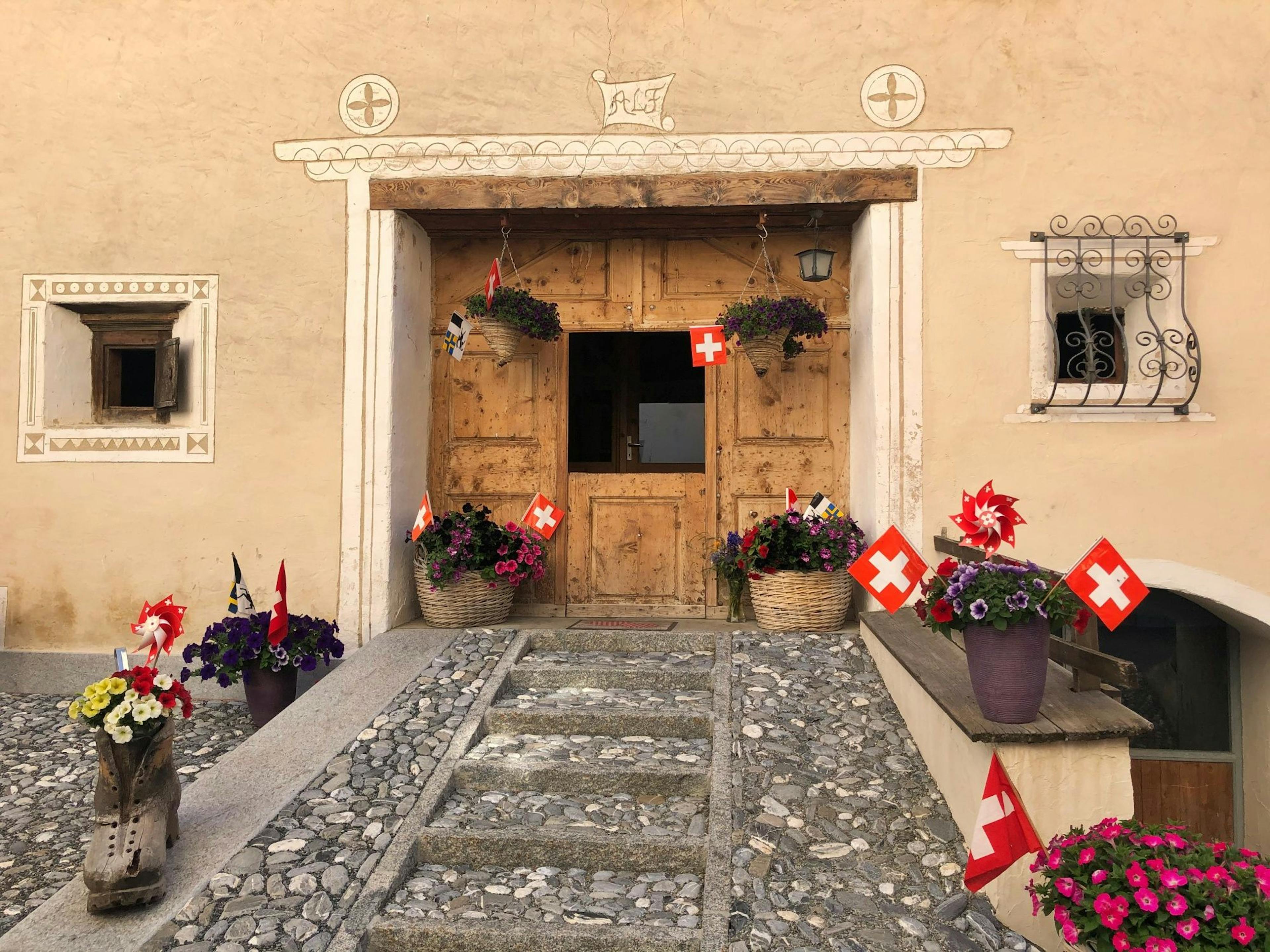
8 days in Switzerland - 10 itineraries from Zurich or Geneva
With a full eight days in Switzerland, you have several options to plan your perfect itinerary. There’s plenty to see and do in a week in Switzerland. Our selection of ten itineraries will help you organise your trip. It shows you different options that are all doable in eight days starting either in Zurich or in Geneva. All of the following itineraries are also adaptable so that you can start along the way or in a different city. This way, you can make the most of your time in Switzerland.
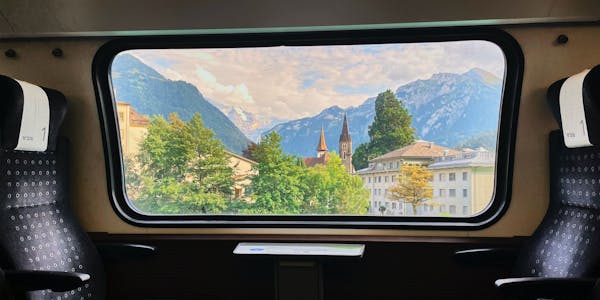
Saver Day Pass SBB - starting at 29 CHF
The Saver Day Pass is available at dynamic prices up to 6 months in advance. The earlier you book, the cheaper you travel. With this pass, you can travel throughout Switzerland without restrictions and use all means of public transport.
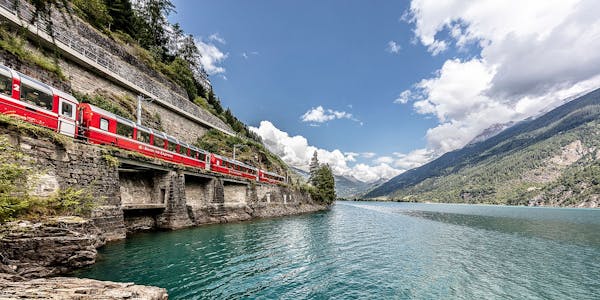
Swiss Travel Pass
With the Swiss Travel Pass you have free travel throughout Switzerland by boat, bus or train. You travel wherever you want, on 3, 4, 6, 8 or 15 consecutive travel days.
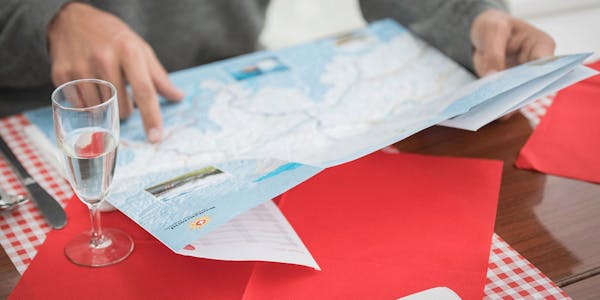
Swiss Half Fare Card
With the Swiss Half Fare Card you get a 50% discount on your trips by bus, train, boat and most mountain railroads. You can travel throughout Switzerland within one month.
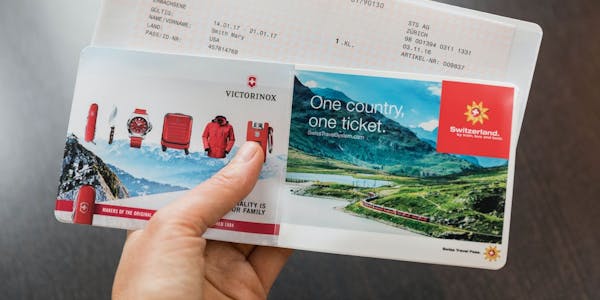
Swiss Travel Pass Flex
With the Swiss Travel Pass Flex you have free travel throughout Switzerland by boat, bus or train. You travel wherever you want, on 3, 4, 6, 8 or 15 freely selectable travel days within a month.

Friends Day Pass for Youth SBB
The Friends Day Pass for Youth is an incredibly attractive offer for young people under 25. With up to three other people, you can travel all over Switzerland at an unbeatable price.
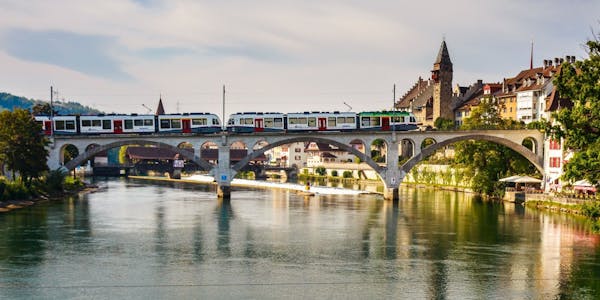
Day pass for Swiss Half Fare Card holders
The SBB Day Pass can be booked in combination with a Half-Fare Travelcard or a Swiss Half Fare Card. You can then travel the whole day on the public transport network throughout Switzerland.
Although Switzerland may be small, there’s more than enough to see and do for eight days. With the high diversity of landscapes, you’ll be happy you have a decent amount of time to spend in this wonderful country. If you’re planning your trip to Switzerland, the following itineraries will help you with that process.
They are all doable within eight days and have their starting point in Zurich or in Geneva. However, if you’d like to start in a different place, you can easily adapt your trip accordingly. Zurich is very well connected and can be reached from every other city in Switzerland. So is Geneva if you like to start in a city in western Switzerland.
You will notice that we only talk about travelling by public transport and not by car. Most itineraries are also possible by car, in case you decide to get a rental during your stay in Switzerland. But with our very dense network of trains and buses, there’s no real need to travel by car.
Of course, the choice is all yours. But if you do travel by train, we recommend buying a travel pass of some sorts. Since you’ll be covering quite some ground with public transport, an Interrail, Eurail or a Swiss Travel Pass will make getting around a lot easier.
Also, if you have more than eight days available and see a Switzerland itinerary you like, you can easily stretch it out by spending an extra night in some of the places.
Happy planning!
- Public Transport in Switzerland
- The 10 most important railway passes for your trip in Switzerland
- Everything you need to know about train tickets in Switzerland
1. Itinerary to the Alps with the sunny Ticino, the Matterhorn in Zermatt and Interlaken
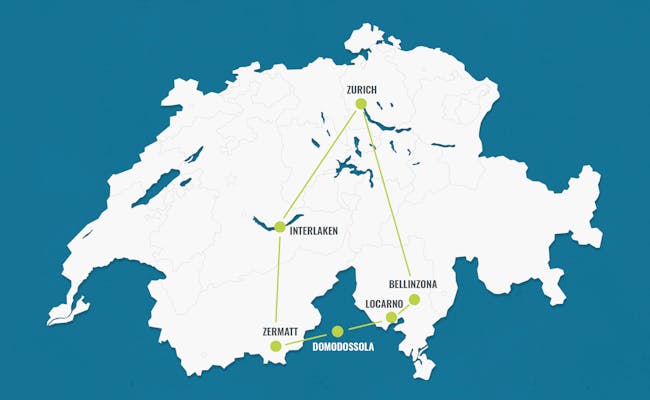
Highlights on this itinerary:
- Discover the sights in Zurich, Switzerland's largest city.
- Drive through the Gotthard Base Tunnel, the longest railway tunnel in the world
- Visit one of the popular river valleys Maggia or Verzasca
- Enjoy a few scoops of delicious ice cream in Locarno or Ascona
- Take a windy train ride from Locarno to Domodossola in Italy
- Hike in front of the mighty Matterhorn in Zermatt
- Day 1: Zurich - Bellinzona - Locarno
In the morning, explore Zurich on your own, borrow a free bike with «Züri rollt» or join a guided city tour. After the tour, grab some take-away lunch and have it on the train to Bellinzona.
Thanks to the 57 kilometres (35 miles) long Gotthard-Basistunnel, it now takes you less than two hours to bolt through the Alps and reach Switzerland’s warm south. Stop over in Bellinzona and visit the Castello di Montebello, a UNESCO World Heritage site, before travelling on to Locarno.
Spend the rest of the evening taking in the Italian atmosphere in Locarno. Hang out at Piazza Grande, stroll along Lago Maggiore or just enjoy a few scoops of ice cream by the lake. And just in case you’re wondering: Yes, you’re still in Switzerland. Even if it doesn’t feel like it. This is as Italian as our country gets...
Since you’re staying in the Canton of Ticino for the next two nights, you’re entitled to a Ticino Ticket. You’ll receive it when you check in to your accommodation. This fantastic travel pass lets you use public transport for free all across the Canton of Ticino. It also gives you numerous discounts on other local attractions and activities.
- Best things to do in Zurich
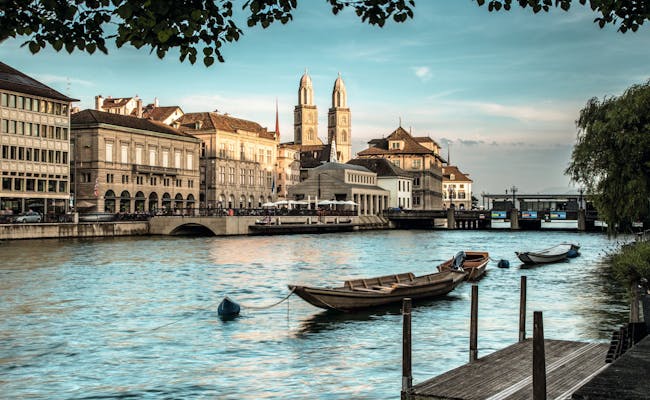
- Day 2: Free day in the Canton of Ticino
Get ready to explore the Italian part of Switzerland in all its glory. With the abundance of activities to choose from, you won’t get bored today. First up, we recommend you head to one of the two river valleys: Maggia or Verzasca. Both are fantastic for hiking, spending some time by the river or going for a refreshing swim.
Also, don’t forget to bring your picnic on this journey. You’ll find countless opportunities to take a break in both valleys. One of our favourite places is right below the famous stone bridge in Lavertezzo.
If you prefer calmer waters over cold mountain streams, head to Lago Maggiore or Lago di Lugano. Both lakes are stunning and provide you with more photo opportunities than you can imagine.
Other popular destinations in Ticino are the inspiring little artsy town of Ascona next to Locarno and the city of Lugano further south.
To brush up on your Swiss geography knowledge, visit Swissminiatur in Melide just outside Lugano. It’s a miniature version of Switzerland and displays incredible attention to detail.
In case you’re one of those adrenaline junkies, there’s always the 007 bungy at the end of Verzasca valley. You might have seen this 220 metre (720 feet) dive in the James Bond movie Golden Eye. If you decide to throw yourself off that wall, please don’t forget to share your picture with us. We’d love to see that...🙂
As you might have gathered by now, this day is by no means long enough to do everything on the list.
Good thing there’s always tomorrow.
- Best things to do in Ticino
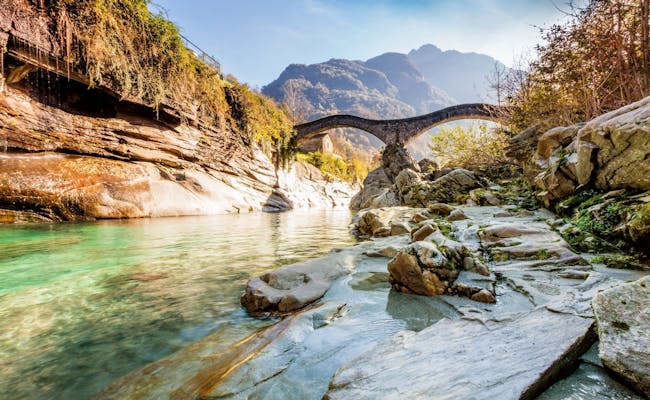
- Day 3: Free day in the Canton of Ticino
Knock yourself out doing whatever you missed out on yesterday. The list should be long enough to keep you busy for another day. Alternatively, leave Switzerland and hop across the border to Italy.
Not far from Lugano lies the idyllic Como region, the place where George Clooney and other celebrities got married. If you’re curious to find out what Mr. Nespresso saw in this part of the world, today’s your chance.
The two main places we recommend visiting in the area are the city of Como and the village of Menaggio. Both are situated by the shores of Lake Como and will automatically make you take a step back and enjoy the laid-back atmosphere.
At the end of the day, head back to Switzerland and spend whatever time you have left in Locarno before moving on to Zermatt tomorrow.
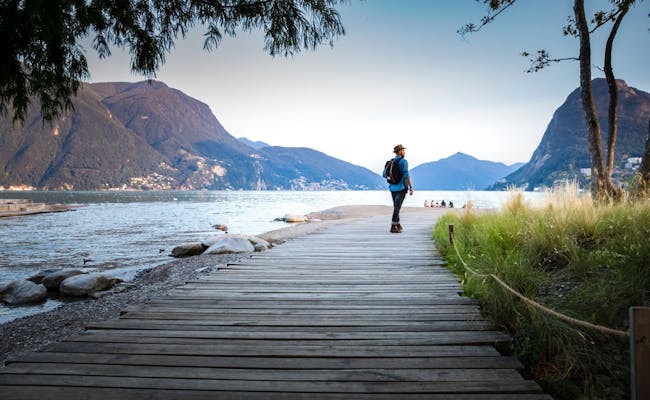
- Day 4: Locarno - Domodossola - Zermatt
You’re probably going to laugh now. But the station your train to Domodossola leaves from is called Locarno FART. Unfortunate name, we know. It’s short for F errovie A utolinee R egionali T icinesi and translates to “regional railway of Ticino”.
The ride to Domodossola lasts just under two hours. It might be the slowest train you’ve ever been on but chances are you won’t even notice time passing by.
The landscape is beyond stunning from start to finish. As you travel through the impressive Centovalli region – which stands for one hundred valleys – you’ll pass several charming villages with old stone houses, ride across tall viaducts and even catch a glimpse of a waterfall or two.
Enjoy the views because from Domodossola to Brig, you’ll be spending most of the time in a tunnel. That’s ok though because the ride from Brig to Zermatt is part of the Glacier Express – another scenic train ride.
Once you arrive in Zermatt, spend the rest of the day strolling through this little town and enjoy the sight of the mighty Matterhorn. Provided it’s not veiled in clouds.
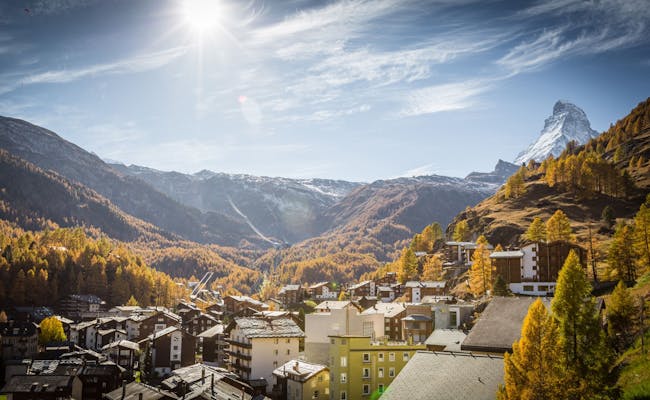
- Day 5: Free day in Zermatt
Zermatt is all about mountains and the outdoors. If you’ve come to Switzerland for our spectacular mountain views, you’re going to love it here.
Several hikes and walks of all difficulty levels take you places you didn’t even know existed. Like for instance the popular Zermatt five-lakes trail, which takes 2.5 hours to complete. It leads past five crystal clear mountain lakes with breathtaking views of the Matterhorn.
Another impressive, yet head spinning adventure, is walking across the world’s longest pedestrian suspension bridge in Randa. It stretches 494 metres (1.620 feet) across the valley.
Hello vertigo!
The circular track starts and finishes in Randa, 15 minutes by train from Zermatt.
In case you’d rather skip the hiking altogether and see some mountains the easy way, we recommend heading up to Gornergrat. After a ridiculously steep train ride, you’ll find yourself at an altitude of 3089 metres (10.135 feet) above sea level. Right in front of the Gorner Glacier and the Matterhorn.
Don’t be surprised if climbing those steps to the viewpoint leaves you completely breathless. It’s not you, it’s the thin air.
- Best things to do in Zermatt
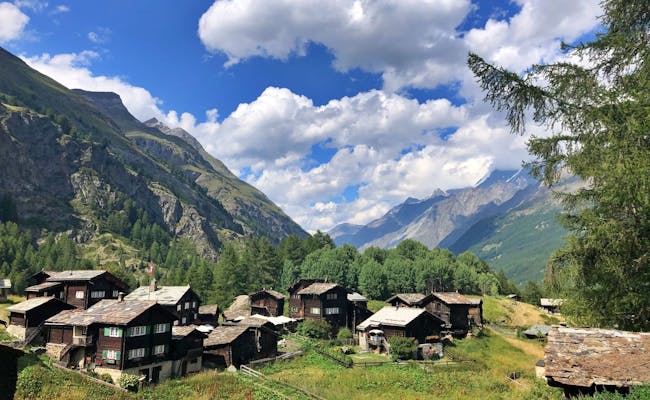
- Day 6: Zermatt - Interlaken
How you plan out today is entirely up to you. One option is to stay in Zermatt for a little while longer and keep hiking, looking for marmots, skiing, snowshoeing, taking photos of glaciers or whatever else you’ve set your mind to.
Alternatively, if you’ve had enough of the thin air and are ready to head back down, travel onward to the adrenaline packed and popular town of Interlaken. Spend the rest of the day in this conveniently located place between two crystal clear lakes. Activities are endless and you’ve got all day tomorrow to explore Interlaken and its surroundings.
Since your options in this area are so plentiful, check tomorrow’s suggestions to see if you can find something to tick off the list this afternoon already. Maybe you fancy a short trip to Lauterbrunnen or a ride up Harder Kulm for some great views?
- Best things to do in Interlaken

- Day 7: Free day in Interlaken
You’ve got more activities to choose from today than you can wrap your head around. It all depends on your budget, but in an adrenaline-packed place like Interlaken, the sky’s the limit.
If even that...
Skydiving, paragliding, canyoning and jet boating are all popular activities that will get your adrenaline flowing.
Another option is to embark on a passenger ship cruise on either Lake Thun or Lake Brienz. Both rides come with incredible views that will make you wish you’d never have to leave.
If you’re looking for a stopover on one of the cruises, get off at either Giessbach (Lake Brienz), the Saint Beatus Caves or Spiez (Lake Thun).
The Jungfrau region around Interlaken is also an excellent playground for hikers. The amount of trails is nearly endless and whatever your fitness level and ambitions, you’ll find something to your taste.
Of course, the No. 1 destination everybody wants to see out here is the famous Jungfraujoch – aka Top of Europe. If you’re after a slightly more budget-friendly experience, we suggest looking into visiting Mount Schilthorn, Schynige Platte, Grindelwald First or Männlichen instead. The rides up to these mountains and the views from the top won’t disappoint you.
Other places of interest in and around Interlaken are: the open-air museum Ballenberg, the chocolate workshops at Funky Chocolate Club, the two mountain lakes Blausee or Oeschinensee or the Aare Gorge.
And let’s not forget those charming towns and villages like Brienz, Spiez, Thun, Lauterbrunnen or Grindelwald.
We could go on forever here but we guess this would only make you hate that you don’t have all week here.
- 12 Tips for your first trip to Jungfraujoch
- Mount Schilthorn Piz Gloria
- Schynige Platte - Top of Swiss Tradition
- Skydive Interlaken - why you shouldn’t miss it
- Ballenberg open-air museum
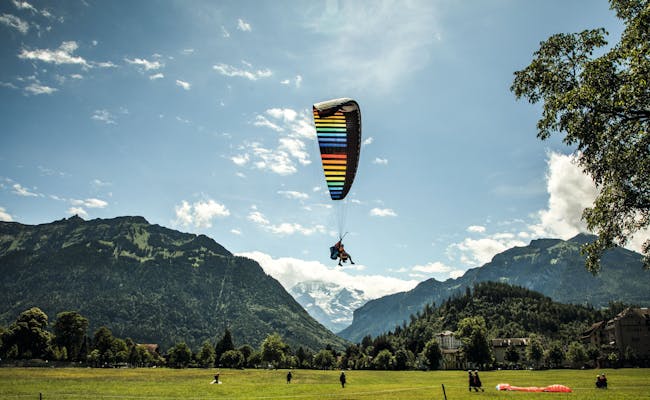
- Day 8: Interlaken - Geneva / Zurich
You probably didn’t get to do everything you set your mind to these past two days. This is why you have another day to knock yourself out in and around Interlaken today. Do what you need to do before heading back to Geneva in the late afternoon or evening. The train ride from Interlaken to Geneva takes roughly three hours and unless you have a plane to catch, there’s no rush to get back.
Or, if you’re leaving Switzerland from Zurich, head that way instead. The fastest connection leads through Bern and takes two hours. However, if you have time and fancy completing the Golden Pass Line, you have the option to travel to Zurich through Lucerne instead. This will take you an extra hour but is way more scenic than the journey through Bern.
- Additional tips and information for itinerary 1
- Ticino is a highly popular holiday destination for the Swiss. If you travel during school vacations or public holidays, please make sure you book your accommodation in advance.
- The peace and quiet in the Verzasca and Maggia valleys can be deceiving. As soon as it starts raining further up in the mountains, those streams become a dangerous force of nature. Please check the weather forecast before you head out. In case it does rain further up, keep a safe distance from the water and don’t take a nap on one of the cosy boulders inside the river. People have been surprised by the enormous mass of water and died. We don’t want you to be one of them.
- The part between Brig and Zermatt is served by the Glacier Express trains. Those leave Zermatt and St. Moritz three times daily and are only for people with a reservation. But there are regular trains commuting between Brig and Zermatt that don’t require a reservation. The best part? The views are exactly the same as with the Glacier Express. Minus the large panoramic windows.
2. Itinerary for culture lovers with five city trips, Switzerland’s most beautiful baroque city and free biscuits
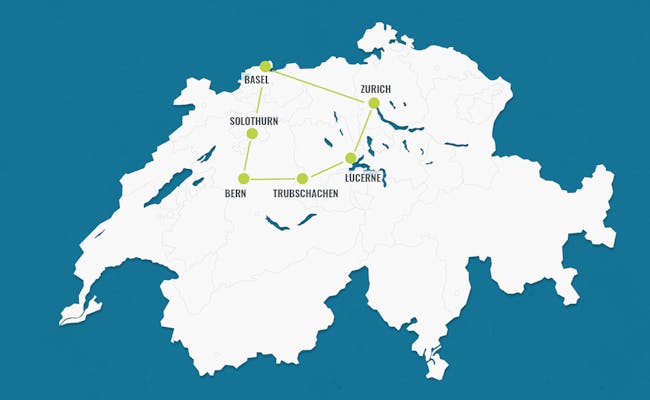
- Visit a total of five Swiss cities - Zurich, Lucerne, Bern, Solothurn and Basel
- Enjoy the fascinating scenery on the Rigi and on Lake Lucerne
- Ride through the picturesque Entlebuch region
- Fill your belly with delicious Kambly biscuits and Cailler chocolate
- Visit the old town of Bern (UNESCO)
- Discover Solothurn, the most beautiful baroque town in Switzerland
- Explore the vibrant cultural city of Basel
- Day 1: Zurich - Mount Rigi - Vitznau - Lucerne
Leave Zurich first thing in the morning and catch the train to Lucerne. Store your luggage either at the train station or at your accommodation and take the next train to Arth Goldau. From here, the Rigibahn – a cog railway that’s been around for over 150 years – takes you on a 45-minute ride to the top station Rigi Kulm.
Provided Mount Rigi isn’t veiled in clouds, you’ll be presented with spectacular views over the Alps, Lake Lucerne and other surrounding lakes. Just follow the signs to the viewing point after getting off at Rigi Kulm.
Once you’ve snapped enough photos, either take a break at the restaurant, catch the train down to Vitznau or go for a hike. With over 120 kilometres (75 miles) of hiking trails at your feet, you’re spoiled for choice here.
Upon arrival in Vitznau, the passenger ship to Lucerne will be waiting for you. Keep your camera within reach because this scenic and peaceful ride offers some more stunning views.
Back in Lucerne, spend the rest of the evening exploring the city or find a cosy spot by the lake to relax.
- Mount Rigi Guide
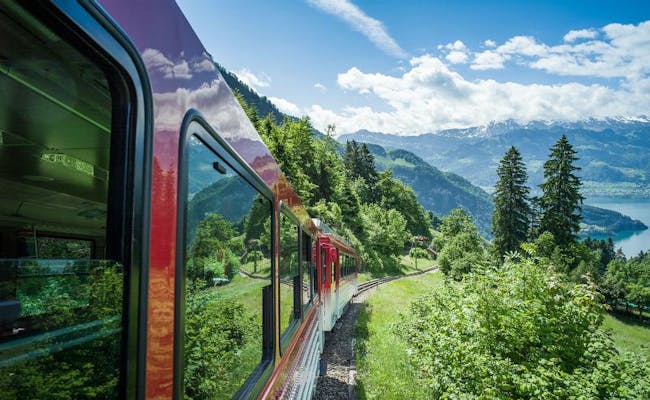
- Day 2: Free day in Lucerne
Lucerne has an abundance of activities to offer. One of the most obvious picks is to catch the world’s steepest cog railway to Mount Pilatus, Lucerne’s backyard mountain. This railway only leaves from Alpnachstad during summer, while the cable car from Kriens takes you up to Mount Pilatus all year round.
Speaking of mountains: Mount Titlis is another landmark in the area worth visiting. From Engelberg, you’ll reach the top by catching two gondolas. One of them is the world’s first revolving aerial cableway. So expect some impressive 360-degree views at the top.
For an easy hike, including a ride on a 152.8 metres-high rocket-like outdoor elevator, catch the passenger ship or the bus to Kehrsiten-Bürgenstock.
And let’s not forget Stanserhorn, a mountain close to Lucerne that is accessed by a fancy double-deck cable car. The best way to take this trip is by catching the passenger ship to Stansstad. From there, catch the funicular railway for the first leg and get on the open-air gondola for the final part to Stanserhorn.
Technically, you could even visit Interlaken for the day. Leave Lucerne on the Golden Pass Line in the morning, spend the day exploring the photogenic region around Interlaken and head back to Lucerne in the evening.
Another great way to spend the day around Lucerne is on Lake Lucerne. Several steamboats and passenger ships operate on the Lake and take you on the most stunning journeys.
As you can see, Lucerne has plenty to offer on a sunny day. But in reality, the weather isn’t always too promising. In this case, here are some cool indoor options for you.
For one, there’s Aeschbach’s Chocoworld in Root. Getting there by bus takes around 30 minutes. Nothing brightens up a rainy day like some delicious chocolate, does it?
In Hergiswil, not far from Lucerne, you’ll find what the Swiss affectionately call the Glasi. Hergiswil Glassworks runs you through the process of glass-making, lets you watch the pros in action and even offers the opportunity to give glassblowing a shot. When’s the last time you made your own glass?
Another bad-weather option is the Museum of Transport. As the name suggests, this museum covers every means of transport throughout history. From bicycles to astronautics, they’ve got it all.
- Best things to do in Lucerne
- Mount Pilatus Guide
- Mount Titlis Guide
- Mount Stanserhorn Guide
- Boat trips on Lake Lucerne
- Aeschbach chocolate factory
- Museum of Transport Lucerne
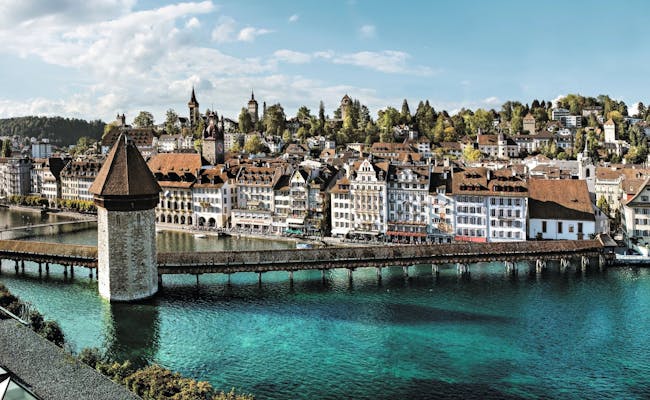
- Day 3: Lucerne - Kambly - Bern
Luckily, you don’t have to leave Lucerne until lunchtime today. So spend the morning doing whatever you didn’t get to do yesterday. Whatever you do, make sure you work up an appetite and don’t grab too big a lunch for your ride to Trubschachen. You’ll need every free inch in your stomach for the biscuit-feast awaiting you.
Once you’re ready to move on, catch the train to Trubschachen. But watch out. This train gets split up along the way and only the front part travels through the picturesque Entlebuch region to the Kambly factory. When you’re at the platform in Lucerne, please check the display to make sure you get on the right half of the train.
The Kambly factory store right next to Trubschachen station is free to visit. In here, you can spend as much time as you like tasting up to 100 types of delicious biscuits. Unfortunately, you can’t visit the factory and watch the production of this iconic Swiss biscuit. However, they do have a cinema at the shop where they give you some more insight into this traditional family business.
After reaching the point of explosion, or maybe two biscuits before, move on to Bern. To digest your Kambly overdose, go for a walk in Switzerland’s capital city. For an impressive night view over Bern, we recommend heading up to Rosengarten.
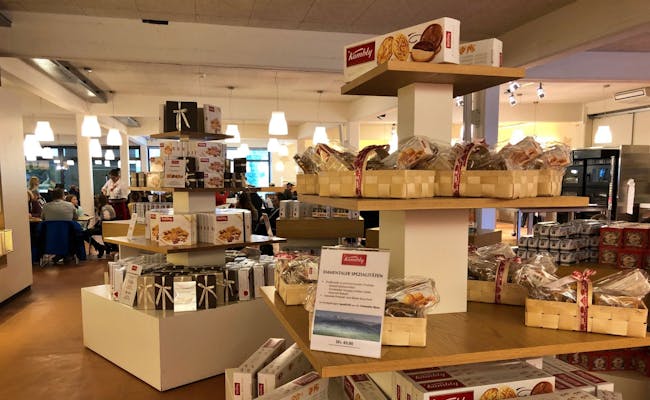
- Day 4: Free day in Bern
In this beautiful UNESCO listed town, you’ve got plenty of activities to choose from. Join a guided city tour or explore Bern on your own. Take a stroll through the old town, head to the bear park, check out the Bundeshaus (House of Parliament) and walk back up to Rosengarten for more views.
You can also visit Gurten – Bern’s backyard mountain – see some animals at Dählhölzli wildlife park or visit the botanical garden. Alternatively, catch the elevator at the train station to hang out at Grosse Schanze or go for a swim either in the River Aare or at Weyermannshaus.
Bern is also conveniently located in close proximity to a variety of breathtaking destinations. So you can easily go on a daytrip from here. For one, there’s Thun and Interlaken, which are two wonderful places to visit for some spectacular lake and mountain views.
If you’re into mountain lakes, you’re in luck, too. Lake Oeschinensee and Blausee are both within reach from Bern and more than worth a trip. The crystal clear water in both lakes will leave you breathless.
Only half an hour west of Bern lies the mediaeval city of Fribourg. If you decide to head over there, follow the citywalk signs leading you through this mighty old town. The signs will lead you up and down some very steep alleyways, across ancient wooden bridges, down to the River Saane and past the city’s very own funicular. For an even better view of your surroundings, tackle the 365 steps to the tower of the Cathedral. The River Saane at the bottom of the city is a great spot to stretch your legs and treat yourself to a snack.
Technically, you could take this even further and head to Gruyères and Broc for some typical Swiss cheese and chocolate. Whatever you end up doing today and whenever you’re ready, head back to Bern for your last night in the city.
You should definitely find enough things to keep you busy for a day.
- Best things to do in Bern
- Best things to do in Fribourg
- Best things to do in Thun
- Lake Thun - best attractions and prices
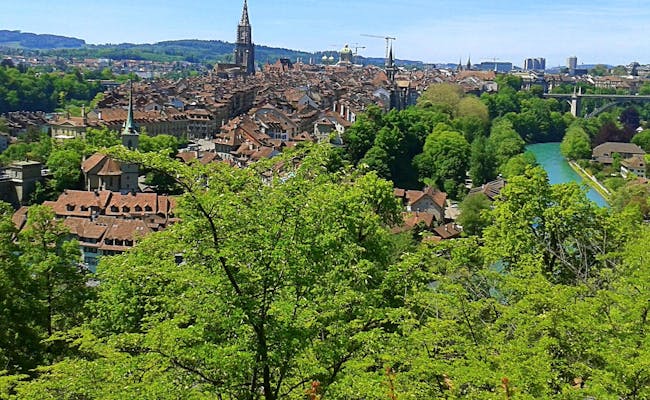
- Day 5: Bern - Solothurn
If there’s anything you wanted to do in Bern yesterday but ran out of time, get that over with in the morning and leave for Solothurn whenever you’re ready.
Solothurn is commonly known as “Switzerland’s most beautiful baroque city”. Take a stroll through this pretty old town and get ready to spend a full day in the area tomorrow. Also, go ahead and treat yourself to a few scoops of ice cream at Vitaminstation – one of the ice cream places ever – and have it while sitting on the stone wall along the River Aare.
You’ll fit right in with the locals in doing so.
Seraina’s Tip: My two absolute favourite places for food in Solothurn are Pittaria and Vitaminstation. Anyone that likes a good falafel or hummus is going to love Pittaria. And Vitaminstation makes some of the best ice cream I’ve ever tasted in Switzerland.
- Day 6: Free day in Solothurn
Although Solothurn is by no means a big city, there’s still plenty to see and do in the area. One activity we particularly recommend is going on a hike in the Jura mountains. This high plateau is a wonderful area to visit all year round.
One option to reach the top with its countless walking trails is by cable car from Oberdorf to Weissenstein. Feel free to walk as long and as far as you like before hiking back down or catching the cable car to Oberdorf.
A very popular hike is the round trip from Solothurn via Balmberg and Weissenstein. Catch the Postauto in Solothurn, get off at Balmberg, walk along the crest to Weissenstein and head back down to Oberdorf by cable car. From Oberdorf, the train will take you back to Solothurn.
This is an easy walk and takes you into the Jura without too much effort. During your hike, you’ll also enjoy the view over the Alps, including Eiger, Mönch and Jungfrau.
Another place you can visit is Verena Gorge. You can walk along the creek through the forest in the gorge until you reach the little hermitage at the end. The walk takes roughly 45 minutes return and is super peaceful.
Alternatively, hop on the passenger ship to Biel. How long you stay on it really depends on your preferences. You can go all the way to Biel – which takes around three hours – or get off anywhere along the way and catch the train back to Solothurn.
One of the highlights on this tour will be Switzerland’s largest stork station in Altreu, which you’ll pass about 45 minutes into the journey. In 1950, when storks were nearly extinct in Switzerland, Max Bloesch started his reintroduction project to save our storks. Thanks to him, around 40 breeding pairs can be seen soaring through the air, strutting across the fields and clattering on the rooftops around Altreu these days.
Only in spring and summer, though. They travel to warmer territories in autumn until winter is over.
If you continue your journey onward to Biel, the views of the Jura mountains and the Swiss Central Plateau will accompany you all the way. After passing through a watergate, you’ll arrive at the port in Biel, which is only a short walk from the train station.
From there, heading back to Solothurn will take 15 minutes by train.
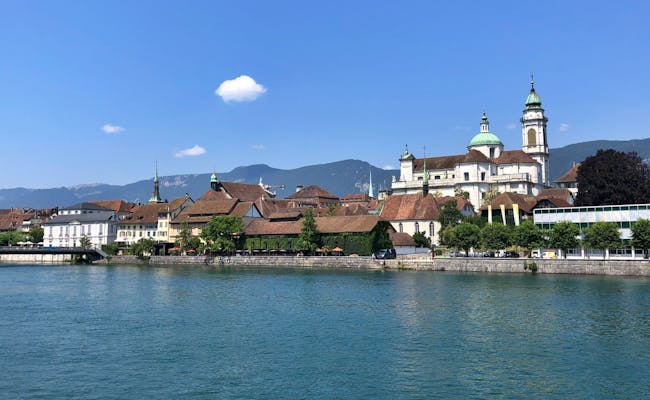
- Day 7: Solothurn - Basel
If you’d like to cover some more ground in Solothurn this morning, stick around as long as you need to before moving on to Basel. The train ride takes just under an hour. Basel is a vibrant city right on the German and French border. It offers several walking tours at various times throughout the week. Pick a tour or just head out into the city on your own.
Stop by the Pfalz – the perfect viewing platform to snap some postcard-quality photos – walk along the River Rhine to watch the big cargo ships enter and leave the harbour, pass by the Cathedral or geek out in one of the many museums.
During the warmer summer months, an activity you might enjoy is joining the locals for a swim in the River Rhine. Before hopping into the water and letting the current take them downstream, they usually pack their clothes into a so-called Wickelfisch. This dry-bag comes in the shape of a fish and is iconic to Basel.
- Best things to do in Basel
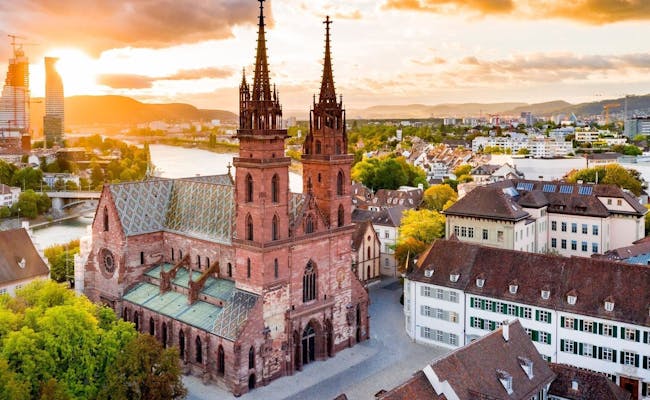
- Day 8: Basel - Zurich
If there’s something you didn’t get to do in Basel yesterday, today’s your day. But in case you’ve seen enough of the city already, you can always hop across the border and visit Weil am Rhein in Germany or St. Louis in France.
Technically, you could even visit three countries in one day. Switzerland, Germany and France. That’s completely doable in Basel and might be something you don’t get to experience every day. Especially if you’re from a country that requires you to get on a plane to cross the nearest border within a reasonable amount of time.
Whenever you’re ready to leave Basel, head back to Zurich and spend the rest of the day exploring Switzerland’s largest city. Since you didn’t have any time to hang out here, you might like to do some sightseeing.
If time allows, visit the Lindt chocolate factory to end this itinerary. Right next to Zurich, in Kilchberg, you’ll find the brand new Lindt visitors’ centre, which opened their doors in September 2020 to the public. If you’ve never tried a roasted cocoa bean before, eaten as many Lindor balls as you can or enjoyed some quality time with the world’s tallest chocolate fountain, this is your chance.
- Lindt Home of Chocolate
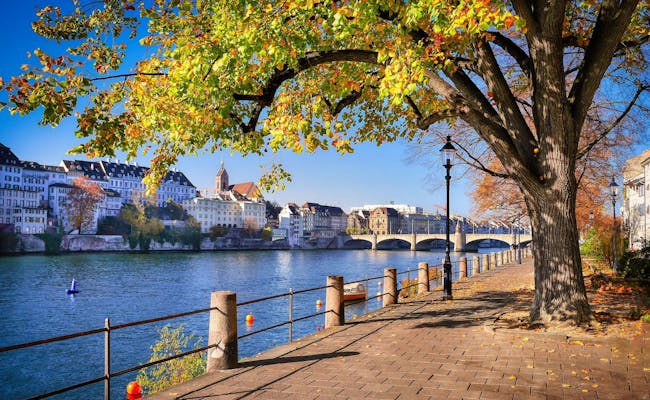
- Additional tips and information for itinerary 2
- On your way down from Mount Rigi to Vitznau, try to sit on the right side of the train for better views of Lake Lucerne.
- If you travel with an Interrail or Eurail Pass, you’ll receive a 50% discount on the Rigibahn as well as the passenger ship from Vitznau to Lucerne. If you travel with a Swiss Travel Pass or the National Day Pass, all rides are fully covered.
- The passenger boat between Solothurn and Biel runs three times a day from May to October. Please check the timetable to find your connection.
- If you are travelling with a Swiss Travel Pass, all journeys are fully covered. If you are travelling with an Interrail or Eurail Pass, you will receive a 50% discount on the boat trip from Solothurn to Biel.
- When in Altreu, look out for pooping (excuse the expression) storks. They usually don't hold back and you wouldn't be the first person to get splashed with, well... you know what, when you get off the boat.
- If you want to take a trip to Germany or France, don't forget to exchange a few euros. And don't forget to take your passport. As Switzerland is not part of the European Union, you will have to show your passport when leaving the country.
- When you check in at your accommodation in Basel, you will receive a guest card that allows you to use local public transport for free.
3. Itinerary across the Alps to the sunny south in Ticino with two panoramic train rides
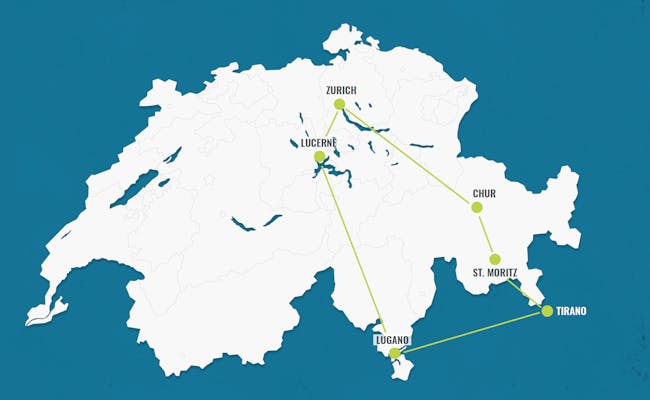
- Discover the sights in Zurich, Switzerland's largest city
- Walk through Chur, the oldest city in Switzerland
- Visit St. Moritz, the place where the rich and famous hang out
- Ride the Bernina Express across the Alps to Lugano
- Visit one of the popular Maggia or Verzasca river valleys
- Take a day trip across the border to Como in Italy
- Cross the Alps again on the Gotthard Panorama Express
- Spend a whole day in Lucerne
- Day 1: Zurich - Chur - St. Moritz
In the morning, explore Zurich on your own, borrow a free bike with «Züri rollt» or join a guided city tour. After the tour, grab some take-away lunch and have it on the train to Chur.
For better views of Lake Zurich and Lake Walensee on your way to Chur, we recommend grabbing a seat on the left when you get on the train. Spend an hour or two strolling through Chur – the capital of the Grisons – and get ready for the clean alpine air awaiting you in St. Moritz.
To get to St. Moritz, catch the train in Chur. Make sure you have your camera ready because you’ll be spoiled with panoramic views from start to finish. The Landwasser Viaduct and the curvy Albula Line are two highlights on this leg.
Spend the rest of the day hanging out in St. Moritz. If you find yourself feeling unusually sleepy tonight, thank the high altitude of 1822 metres (5977 feet) above sea level for that. It usually takes people a day or two to get accustomed to the thin air.
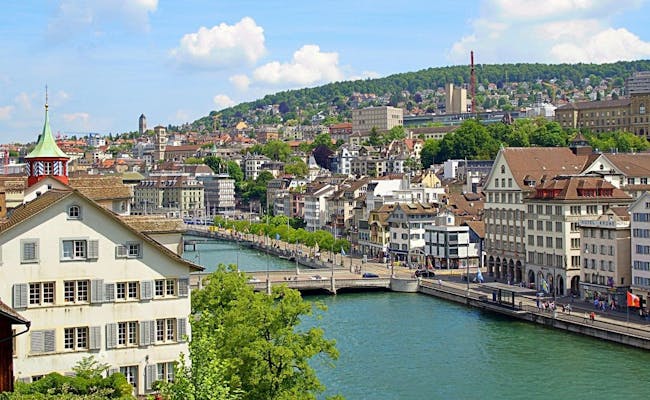
- Day 2: Free day in St. Moritz
St. Moritz is all about the outdoors. Summer and winter. Whether you’re into biking, hiking, stand up paddling, swimming, windsurfing, skiing, snowboarding, snowshoeing, cross-country skiing or just going for a walk, you’ll find your fix.
Only a short ride from St. Moritz lies Lake Silvaplana, a stunning place to cover some of those activities.
Another place worth visiting, since you have a full day in St. Moritz, is Ospizio Bernina. With 2253 metres (7397 feet) above sea level, this little railway station is the highest spot of the Bernina Express Line. Trains from St. Moritz leave every hour and lead you past several good-looking spots with lakes, glaciers and towering mountains.
On the culinary side, we recommend two things in the Grisons. Firstly, don’t miss out on a bowl of Bündner Gerstensuppe. This barley soup with vegetables and meat is iconic to the Grisons. It warms you up like nothing else on a chilly day.
Secondly, treat yourself to a slice of Engadiner Nusstorte. This heavy, delicious pastry puts the calories right back where you’ve been trying to lose them. But it’s so worth it.
Back in St. Moritz, spend the rest of the day strolling through the town. It’s not as charming and mystical as other villages in the area like Samedan or La Punt. But it’s great for window shopping and maybe, if you’re lucky, you’ll even spot a celebrity or two.
- Best things to do in St. Moritz
- Best things to do in the Engadine
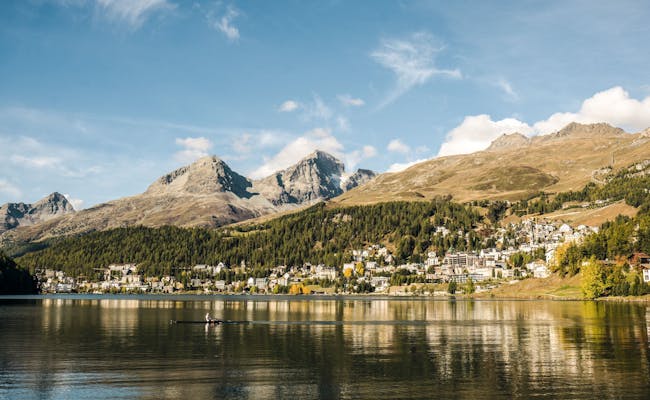
- Day 3: St. Moritz - Tirano - Lugano
Today, you’ll be spending quite a few hours travelling across the Alps from St. Moritz all the way to Lugano. Your journey will take you up to the highest point of the Bernina Express Line, past glistening glaciers and crystal clear mountain lakes, down to the southern part of Switzerland and across a spectacular viaduct before crossing into Italy.
And eventually back to Switzerland...
The first leg of this scenic train ride takes you to Ospizio Bernina, the highest point of today’s journey. This little railway station isn’t far from St. Moritz and lies 2253 metres (7391 feet) above sea level. It’s all downhill from here. Figuratively speaking, of course. As you make your way down toward Italy, you cross the circular viaduct in Brusio. Here, the train takes a full 360-degree turn to overcome the altitude.
At this point, you’ll have lost quite some altitude and the outside temperature will be a lot warmer than it was just a couple of hours ago. The last leg of the journey starts in Tirano, right next to the Swiss-Italian border. From Tirano, the Bernina Express Bus takes you through the impressive Valtellina wine region.
Before crossing back into Switzerland, you’ll drive past Lake Como, the place where George Clooney and many other celebrities got married.
After this long day, you might like to stretch your legs at the promenade of Lake Lugano. Enjoy the view, grab a few scoops of ice cream and take a stroll through Lugano.
You’ve earned it.
Since you’re staying in the Ticino for the next three nights, you’re entitled to a Ticino Ticket. You’ll receive it when you check in to your accommodation. This fantastic travel pass lets you use public transport for free all across the Canton of Ticino. It also gives you numerous discounts on other local attractions and activities.
- Bernina Express
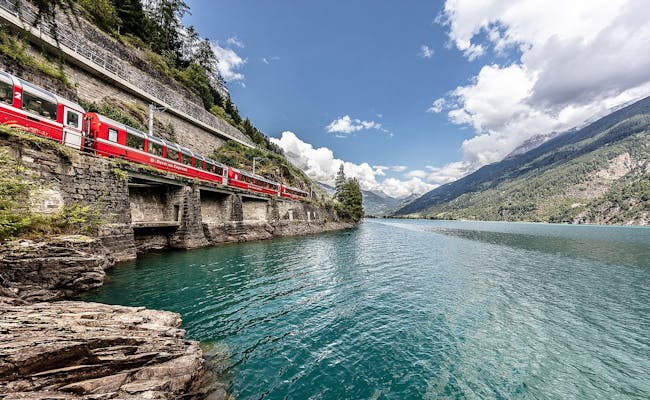
- Day 4: Free day in the Canton of Ticino
Also, don’t forget to bring your picnic on this journey. You’ll find countless opportunities to take a break in both valleys. Our favourite place is right below the famous stone bridge in Lavertezzo.
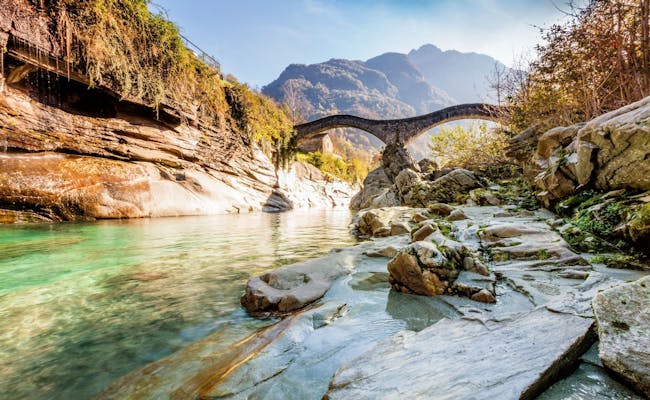
- Day 5: Free day in the Canton of Ticino
Knock yourself out doing whatever you missed out on yesterday. The list should be long enough to keep you busy for another day. Alternatively, you have the option to head across the border to Italy.
At the end of the day, head back to Switzerland and spend whatever time you have left hanging out in Lugano before moving on to Lucerne tomorrow.
- Day 6: Lugano - Lucerne
If you’re visiting Switzerland between April and October, you have the opportunity to travel back across the Alps on the Gotthard Panorama Express.
On the first leg of this journey, a panoramic train will take you through the old Gotthard tunnel to Flüelen. Before Gotthard-Basistunnel opened in 2016, this was the only way to reach Ticino by rail. Nowadays, since the opening of the world’s longest tunnel, the old one is only used for tourist purposes.
From Flüelen, a steamboat will take you on a three-hour ride across Lake Lucerne. You’ll arrive in Lucerne around 3 pm, right next to the train station. This will leave you with plenty of time to explore this stunning city and its surroundings. If you can’t travel to Lucerne on the Gotthard Panorama Express, simply catch the regular train instead.
- Gotthard Panorama Express
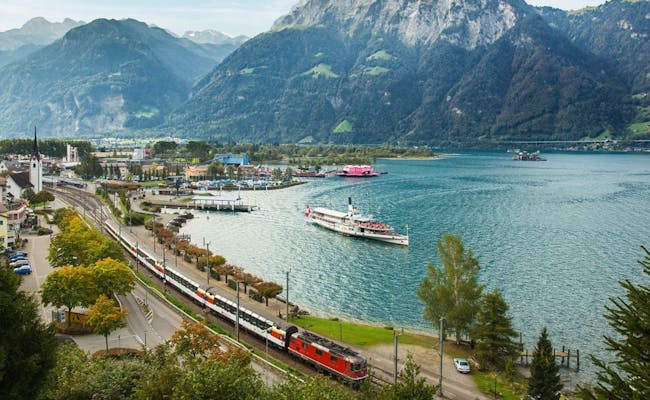
- Day 7: Free day in Lucerne
- Mount Pilatus
- Mount Titlis
- Mount Stanserhorn
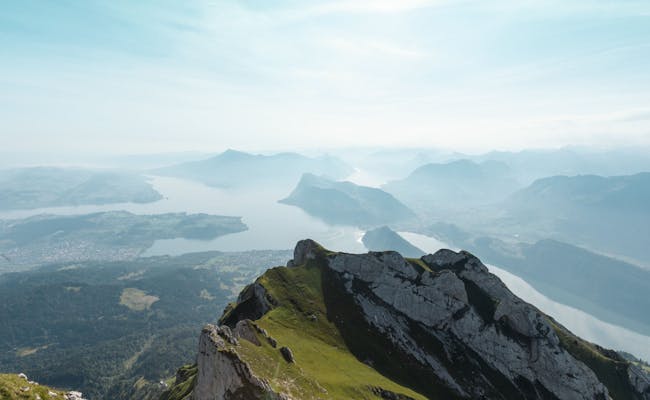
- Day 8: Lucerne - Zurich
Luckily, you don’t have to leave Lucerne until the afternoon or even evening today. So spend the day doing whatever you didn’t get to do yesterday.
A popular day trip from Lucerne is heading up to Mount Rigi. To get there, store your luggage either at your accommodation in Lucerne or at the train station and take the train to Arth Goldau. From here, the Rigibahn – a cog railway that’s been around for over 150 years – takes you on a 45-minute ride to the top station Rigi Kulm.
Once you’ve snapped enough photos, either take a break at the restaurant, catch the train down to Vitznau or go for a hike. With over 120 kilometres (75 miles) of hiking trails at your feet, you’re spoiled for choice here. Upon arrival in Vitznau, the passenger ship to Lucerne will be waiting for you. Keep your camera within reach because this scenic and peaceful ride offers some more stunning views.
Back in Lucerne, grab your bags and head back to Zurich.
- Additional tips and information for itinerary 3
- The Bernina Express timetable changes depending on the season. To find your connection and make a reservation, visit the RhB website. The Bernina Express bus between Tirano and Lugano only runs from May to November.
- The Gotthard Panorama Express only runs from April to October, from Tuesday to Sunday. If you travel outside these months or on a Monday, take the regular train from Lugano to Lucerne instead. You need a reservation for the train between Lugano and Flüelen.
- If you are travelling with an Interrail or Eurail Pass, only the train journey from Lugano to Flüelen on the Gotthard Panorama Express is fully covered. The steamboat trip costs extra.
- When you check in at your accommodation in Lugano, you will receive a Ticino Ticket. With this ticket, you can use public transport throughout the canton of Ticino free of charge for the duration of your stay.
- The tranquillity of the Verzasca and Maggia valleys can be deceptive. As soon as it starts raining higher up in the mountains, these rivers become a dangerous force of nature. Please check the weather forecast before setting out. If it rains higher up, keep a safe distance from the water and don't take a nap on one of the cosy boulders in the river. Visitors have already been surprised by the enormous water masses and died. We don't want you to have to be one of them.
4. Itinerary to the Swiss National Park and Europe’s largest waterfall
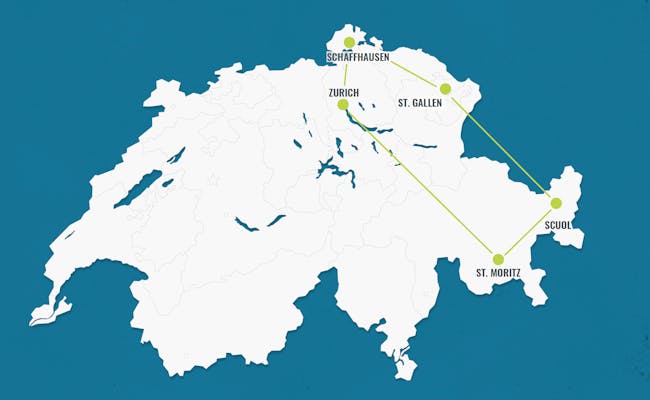
- Visit the Rhine Falls, the largest waterfall in Europe
- Take a stroll through the pretty old town of Schaffhausen
- Admire the Abbey District in St. Gallen (UNESCO)
- Enjoy the impressive Alpstein Mountains
- Spend the night in the Swiss National Park
- Enjoy a few days in the spectacular Engadine
- Day 1: Zurich - Schaffhausen
In the morning, explore Zurich on your own, borrow a free bike with «Züri rollt» or join a guided city tour. After the tour, grab some take-away lunch and have it on the train to Schaffhausen.
Head straight to Neuhausen next to Schaffhausen, where the mighty Rhine Falls attract visitors from all over the world. Access to the falls is free from the northern shore, while seeing them from Laufen Castle in the south costs 5 CHF. Spend however long you like getting soaked in the mist of the Rhine Falls before moving on to Schaffhausen.
Schaffhausen has a charming old town with an impressive total of 171 bay windows, which is more than any other Swiss city can account for. Once you’re done chasing them all down and exploring the rest of Schaffhausen, head up to Munot and enjoy the view over the city.

- Day 2: Schaffhausen - St. Gallen
After breakfast, grab your bags and catch the train to St. Gallen. You’ve got all day to explore the city and its surroundings in all its glory. With the UNESCO listed Abbey District, its towering Cathedral and the impressive Abbey Library, St. Gallen has quite a few things to offer.
While you’re here, make sure you don’t miss a trip to the recreational area of Drei Weieren. To get there, either catch the Mühleggbahn or take the stairs. Alternatively, visit the wildlife park Peter & Paul or still your cultural thirst at one of the many museums.
By far the best place to relax is at Drei Weieren. Go for a refreshing swim to recover from the many steps you took up here or go for a stroll in the forest. You also get a fantastic view over the whole city, Lake Constance and all the way to Germany.
- Best things to do in St. Gallen
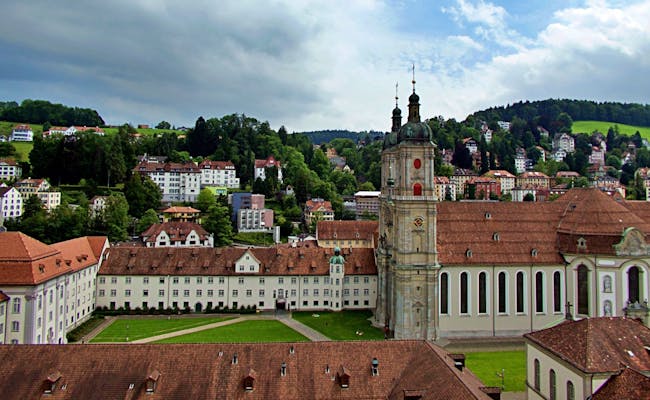
- Day 3: St. Gallen - Alpstein - St. Gallen
Today, you’re in for some serious hiking and a ton of impressive mountain views. In the morning, catch the train to Wasserauen and hike up to Seealpsee, one of the three lakes in the Alpstein mountain range. Spend some time in this peaceful spot before moving on to Ebenalp.
On your way to Ebenalp, you’ll pass by a place you might have seen before. The famous Äscher restaurant. Ever since it was featured on National Geographic and on Ashton Kutcher’s Instagram, it‘s been completely overrun by its success. This sadly caused it to lose some of its former charm. However, it’s still a worthwhile place to snap a few photos and take a break.
At Ebenalp, you can choose between hiking back to Wasserauen or catching the cable car. If you still have it in you after this long day, you might like a quick stopover in Appenzell on your way to St. Gallen.
In case you hop off in Appenzell and are feeling brave, visit the little cheese store at Hauptgasse 13. But be warned, those smelly cheese fumes will knock your socks off the second you enter the store. There’s no way your feet will be able to compete with that odour. Not even after a full day of being trapped inside your trekking boots... 🙂
Oh, and don’t miss out on a piece of Appenzeller Biber, an iconic local sweet treat made of gingerbread and a honey almond filling. And before you ask: Nope. This Biber doesn’t have any famous Canadian relatives...
Also, if you’re a beer-lover, make sure to stop by the Locher brewery. They brew the popular Quöllfrisch beer that is consumed all across Switzerland.
In the evening, head back to St. Gallen and enjoy sleeping like a baby tonight. Fresh mountain air has a tendency to leave you peacefully exhausted.
As an alternative to hiking and crawling around in the Alpstein, you can head to Lake Constance instead and enjoy some downtime by the lake.
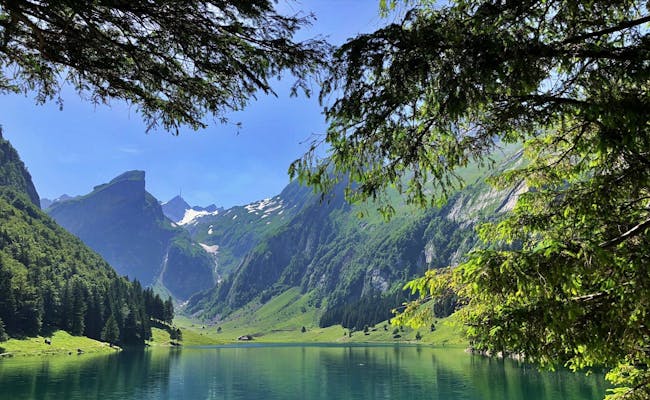
- Day 4: St. Gallen - Scuol
What time you continue your journey today is entirely up to you. The train ride to Scuol takes just under three hours and even if you stick around in St. Gallen until the afternoon, you can still make it to Scuol in time.
So catch the train whenever you’re ready and travel to the marvellous Engadine region in the Canton of Grisons. The Engadine has to be one of the most magical places in Switzerland. Especially during autumn, when the leaves turn yellow, orange and red. But throughout the rest of the year, it’s just as fantastic a place to visit.
Enjoy the rest of your day exploring Scuol and get ready for a few days of being surrounded by mountains, forests, rivers, lakes and plenty of Swiss wildlife.
Ever seen a marmot? Chances of seeing one in the near future are pretty good.
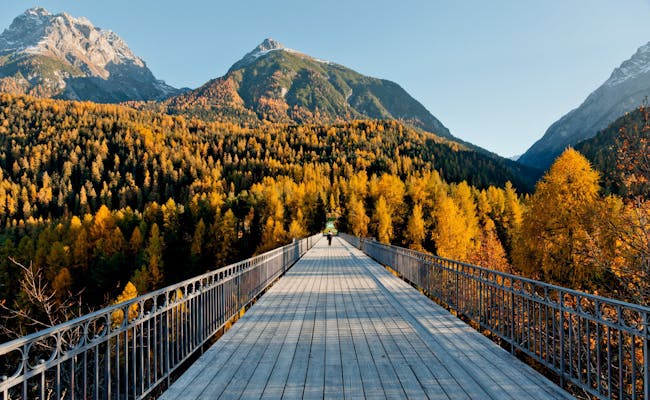
- Day 5: Scuol - Chamanna Cluozza
These next two days, you’re going to explore Switzerland’s only national park in all its glory. Leave your luggage in Scuol and only take what you need for your hiking excursion. If you ask nicely, they might let you leave your luggage at your accommodation in Scuol until you come back from the mountains tomorrow night.
The rules that apply when visiting Switzerland’s only National Park are pretty strict. There’s no leaving the marked trails, no taking plants with you, no making fires and so on. Once you arrive at the gates of the park, please read the signs or stop by the visitor centre in Zernez to make sure you’re prepared.
What you probably weren’t expecting is that visiting the park is free. Everything in Switzerland seems to be more expensive than anywhere else in the world. And yet, while you pay an entrance fee to pretty much every National Park in the world, ours is free. Pretty cool, right?
Since the only place to spend the night inside the Swiss National Park is a mountain hut called Chamanna Cluozza, you’ve got one task to accomplish today. Get to Chamanna Cluozza.
One hike we recommend starts half an hour from Scuol, in the village of Zernez. From there, you’ll spend a good three hours until you reach your camp for the night. The hike isn’t too straining. And if you’re not the most experienced hiker, just give yourself enough time and you should be alright.
Enjoy this evening far away from civilisation without phone reception and sitting around a table chatting to strangers. You’ve earned it.
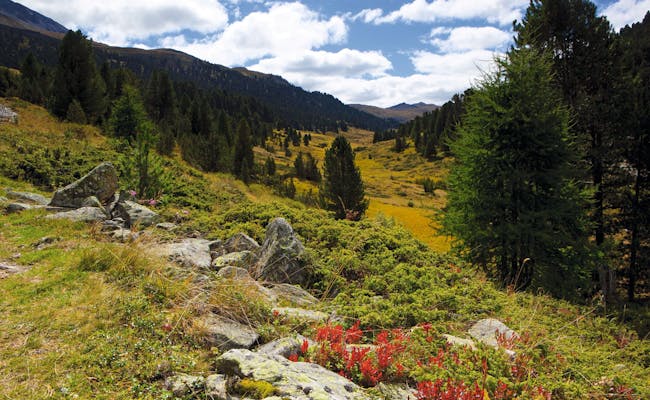
- Day 6: Chamanna Cluozza - Scuol
If you haven’t planned out today’s hike yet, ask the owners of Chamanna Cluozza for their recommendations. You have several further options of different difficulty levels to explore the National Park.
Or you can make your way straight back to Scuol after breakfast if you’ve had enough. It’s entirely up to you. If you’re looking for some relaxing alternatives to climbing up and down those steep mountains, the Engadine certainly has you covered.
For one, there are the hot springs in Scuol. Depending on how sore your legs are from your National Park endeavours, a few hours in this relaxing setting might just be what you need.
Otherwise, we suggest heading to one of the nearby villages. Like for instance Guarda or Sent. The stone houses you’ll encounter are characteristic to this part of Switzerland. And while you’re walking by those mighty buildings, keep an eye out for a bakery.
The Engadine is where the iconic Engadiner Nusstorte comes from. If you have a sweet tooth, we highly recommend you don’t leave before grabbing a slice or two. It’s heavy and rich. And it’s worth every single calorie.
- Best things to do in Scuol
- Day 7: Scuol - St. Moritz
After breakfast, leave Scuol and head to St. Moritz. You’ve got all day to explore this fancy mountain town today. St. Moritz is all about the outdoors. Summer and winter. Whether you’re into biking, hiking, stand up paddling, swimming, windsurfing, skiing, snowboarding, snowshoeing, cross-country skiing or just going for a walk, you’ll find your fix.
Another place worth visiting, since you have plenty of time in St. Moritz, is Ospizio Bernina. With 2253 metres (7397 feet) above sea level, this little railway station is the highest spot of the Bernina Express Line. Trains from St. Moritz leave every hour and lead you past several good-looking spots with lakes, glaciers and towering mountains.
On the culinary side, we recommend grabbing a bowl of Bündner Gerstensuppe. This barley soup with vegetables and meat is iconic to the Grisons. It warms you up like nothing else on a chilly day.
Back in St. Moritz, spend the rest of the day strolling through the town or hanging out by the lake. It’s not as charming and mystical as other villages in the area like Samedan or La Punt. But it’s great for window shopping and maybe, if you’re lucky, you’ll even spot a celebrity or two.
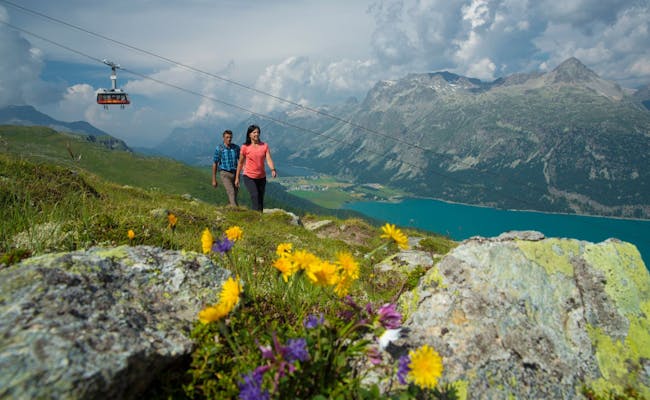
- Day 8: St. Moritz - Zurich
If there’s anything you didn’t get to do yesterday, today’s your chance. The train ride back to Zurich takes just over three hours so there’s no rush to leave just yet. However, if you’ve seen it all and you’re ready to move on, you’re welcome to hop on the train and spend some time anywhere along the way between St. Moritz and Zurich.
One place you might like is the dreamy village of Bergün with its impressive stone buildings that are iconic to this area. You’ll arrive in Bergün right after navigating the confusing Albula Line, the part where the train overcomes the altitude by taking a few loops and tunnels through the mountains. As you look out the window, you’ll notice the train crosses sides of the valley while spiralling down the mountains.
Another place you might enjoy between St. Moritz and Zurich is Walenstadt. Or more precisely, Lake Walensee. This beautiful lake is the perfect stopover. It’s a stunning and mystical lake and, depending on the weather and the light reflection, it sometimes reminds you of a Scottish loch.
Spend the rest of the evening in Zurich and snack on some more Engadiner Nusstorte by the lakeshore or at Lindenhof.
- Additional tips and information for itinerary 4
- Keep your eyes open for wildlife on your hikes. The chances of seeing some marmots, chamois or even ibex are pretty good.
- If you're staying at the Chamanna Cluozza, be sure to book in advance. Use the booking page to make a reservation.
- This itinerary is best in summer or autumn. Especially if you plan to spend some time in the National Park. Of course, you can also visit in winter. But that would mean skipping the Chamanna Cluozza and spending more time in the snow in Scuol. Not a bad alternative either...
- If you want to get off in Walenstadt, you have to be careful not to catch the express train to Zurich. It doesn't stop in Walenstadt.
5. Itinerary with the complete Golden Pass Line, two stop-overs in the Swiss Alps and Swiss chocolate

- Take in the fascinating scenery on Mount Rigi and on Lake Lucerne
- Enjoy the view of the mountains of the Jungfrau region in Interlaken
- Ride the complete Golden Pass Line, one of Switzerland's panoramic trains
- Venture onto the Peak Walk at Glacier 3000, a suspension bridge between two peaks
- Visit Maison Cailler and fill your belly with delicious Swiss chocolate
- Walk along the shores of Lake Geneva
- Day 1: Zurich - Mount Rigi- Vitznau - Lucerne
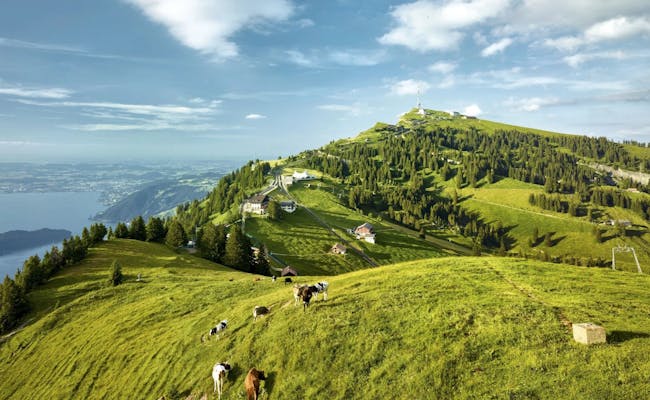
- Day 2: Lucerne - Interlaken
You’ve got all day to explore Lucerne and its surroundings today. For a more detailed list of things to see and do, turn back to day 2 in itinerary No. 2.
In case you’re staying in the city, there are quite a few options as well. Either join a guided city tour, take a stroll through the old town, walk across the Kapellbrücke, hang out by the lake or visit the Glacier Garden with its famous Lion Monument. Leave for Interlaken on the Golden Pass train whenever you’re ready.
The Golden Pass Line is a popular scenic train route from Lucerne to Montreux and is served by several train companies. It connects the centre of Switzerland with the shores of Lake Geneva.
This panoramic journey leads past eight lakes, rides through six different cantons (the Swiss version of states), crosses three mountain passes and connects two language regions. Today’s leg between Lucerne and Interlaken is run by Zentralbahn and takes just under two hours.
Once you arrive in Interlaken, spend the evening in this popular yet very touristy town. Activities here are endless and if you want to enjoy this region to its fullest, you’ll be happy you have two full days here. So get ready for some action.
- Golden Pass Line
- Day 3 and 4: Free days in Interlaken
You’ve got more activities to choose from these next two days than you can wrap your head around. It all depends on your budget, but in an adrenaline-packed place like Interlaken, the sky’s the limit.

- Day 5: Interlaken - Zweisimmen - Gstaad
You’re in for plenty more scenic treats today. Once you leave Interlaken and head toward Zweisimmen, you’ll have Lake Thun to your right. For the best lake views, we recommend grabbing a seat on the right when you get on the train.
Just over one hour into the journey, you’ll need to transfer to a different train in Zweisimmen. That’s where the climb through the Bernese Oberland towards Gstaad begins. This region is an absolute dream for mountain-lovers and pretty much sums up what Switzerland is about. Lakes, mountains, lush meadows with grazing cows, glaciers, tons of hiking trails, wonderful landscapes and cute little villages are abundant in this area.
In Gstaad, you have several options to spend the afternoon. Since this area is a hiker’s paradise, you’re spoiled for choice here. One hike takes you to Lake Lauenensee, a mountain lake surrounded by moorland.
A trip that is easily doable from Gstaad is a visit to the impressive Glacier 3000. After a 35-minute bus ride to Col du Pillon, you’ll find yourself at the base of the cable car. Hop on the gondola and enjoy the ride. At the top, you’ll be presented with the most astonishing 360-degree views across the Alps.
On a clear day, you can see several huge players in the alpine scene like the Matterhorn, the Mont Blanc massif and the popular mountain-trio Eiger, Mönch and Jungfrau. If you’re brave enough, tackle the Peak Walk to Scex Rouge. This is the world’s first suspension bridge connecting two peaks. You’ll also find other activities on Glacier 3000 like the mountain coaster or a walk across the glacier.
In the evening, if you decide to wander through Gstaad, keep your eyes peeled for celebrities. This place is a playground for the rich and famous. Much like St. Moritz.
- Glacier 3000
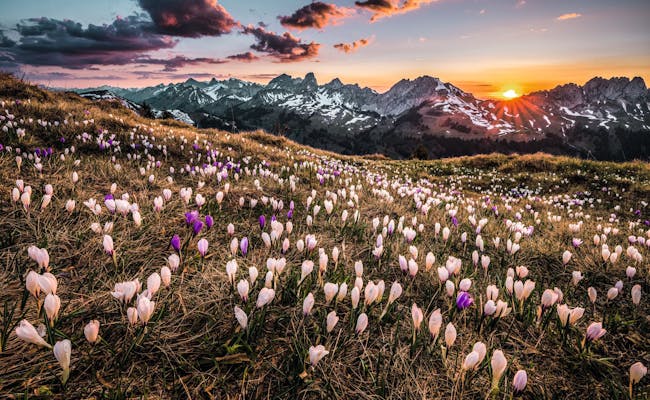
- Day 6: Gstaad - Montreux
Time to say goodbye to this beautiful region already. Catch the Golden Pass train again after breakfast and continue your scenic journey. After leaving the Bernese Oberland and coming down the hills, you’ll arrive in the French-speaking part of Switzerland.
Bienvenue...
The Golden Pass Line terminates in Montreux, where you’ll be spending the night. Enjoy the day in this wonderful area on the shores of Lake Geneva. Walk to the Promenade and check out the Freddie Mercury statue just outside the market hall.
In case you’re interested in castles, don’t miss out on visiting the famous Chillon Castle. To get there, either follow the Promenade by foot, catch a bus or take one of the regularly departing passenger ships.
Even if you’re not keen on going into the castle, we still recommend heading out there and spending some time by the lake. It’s a great place to hang out and take a bunch of jealousy-inducing pictures.
Alternatively, head in the opposite direction toward Vevey, where you’ll find a stunning riviera and many interesting museums. Only a short train ride west of Montreux, you’ll find the famous Lavaux vineyards, a UNESCO World Heritage site.
To fully experience the gorgeous views, get off in Cully or Epesses and follow the signposted footpath through the vineyards.
- Best things to do in Montreux
- Chillon Castle
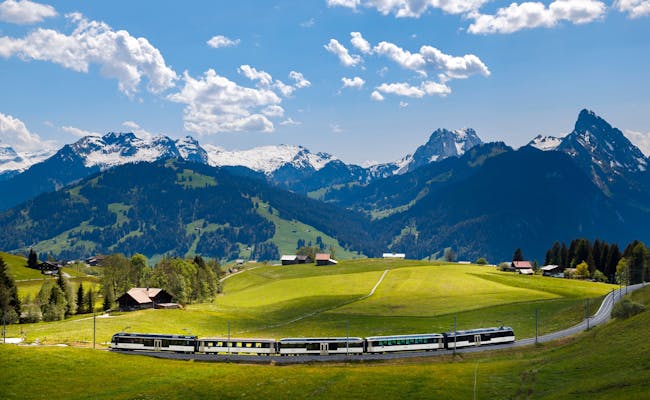
- Day 7: Montreux - Gruyères / Broc - Montreux
Today is all about cheese and chocolate. After all, that’s what Switzerland is famous for. So catch the train to Gruyères and get ready for some culinary and mediaeval action.
The Gruyère cheese factory is right behind the train station. For a small entrance fee, you can watch how the iconic Gruyère cheese is being made. Samples and tasting opportunities are included.
Once you’re done snacking, either catch the bus uphill or follow the path until you reach the village centre of Gruyères. This walk should take you around 20 minutes.
The main attraction in Gruyères is probably the castle, which is open to the public and costs 12 CHF to enter. But the hidden cobblestone alleys and the countless souvenir shops also tend to have people stick around longer than they expected.
After exploring Gruyères, and maybe grabbing a souvenir or two, you have the option to head to Broc and visit La Maison Cailler. Their visitor centre teaches you everything you need to know about Switzerland’s oldest chocolate brand. At the end of the tour, you’ll get to taste a lot of free samples.
More than you thought you could handle.
On your train ride back to Montreux, try to digest your cheese and chocolate overdose. Spend the rest of the day hanging out in Montreux.
- Gruyères Cheese Factory
- Cailler Chocolate Factory
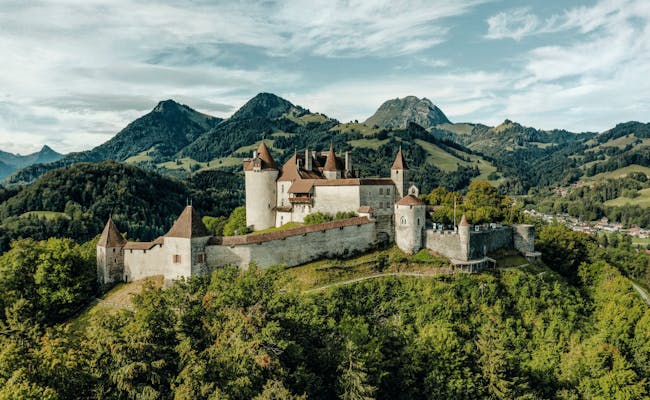
- Day 8: Montreux - Lausanne - Geneva / Zurich
Leave Montreux after breakfast and head to Lausanne. This picturesque old town is built on three hills and surrounded by numerous vineyards. You should definitely find enough to keep you busy for a few hours.
In case you would have liked to visit the Lavaux vineyards the day before yesterday but ran out of time, today’s another chance to give it a go.
Toward the end of the day, either head back to Zurich or travel on to Geneva. Whichever city it is you’re leaving Switzerland from.
- Additional tips and information for itinerary 5
- Upon check-in at your accommodation in Lucerne, Interlaken and Montreux, you’ll receive a Transport Card that lets you use local transport for free.
- On the way from Rigi to Vitznau, try to sit on the right side of the train to get a better view of Lake Lucerne.
- If you travel with an Interrail or Eurail Pass, you get a 50% discount on the Rigi Railway and on the passenger boat from Vitznau to Lucerne.
- If you travel with the Swiss Travel Pass or the SBB Day Card, all journeys are covered.
- You can make the journey with the Golden Pass without a reservation. However, Golden Pass Customer Service recommends reserving a seat for the section between Zweisimmen and Montreux, as it can get quite crowded in high season.
- Access to Chillon Castle is free if you have a Swiss Travel Pass. And even if you’re not keen on going into the castle, seeing it from the outside is still worth the trip.
6. Itinerary with four city trips, Mount Titlis, Lake Constance and a night in the Alps
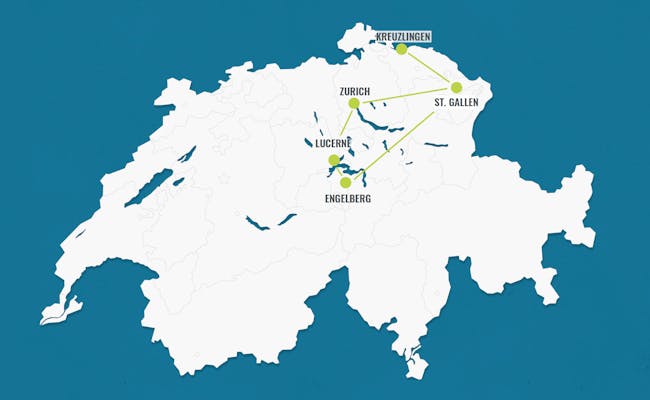
- Spend a night in the Alpstein mountain range
- Hang out by Lake Constance
- Ride the Voralpen-Express, a scenic train ride from St. Gallen to Lucerne
- Walk across the famous Kapellbrücke in Lucerne
- Enjoy the mountain views from Mount Titlis
- Discover the charming mountain village of Engelberg
- Day 1: Zurich - St. Gallen
In the morning, explore Zurich on your own, borrow a free bike with «Züri rollt» or join a guided city tour. After the tour, grab some take-away lunch and have it on the train to St. Gallen.
Spend the afternoon exploring the old town of St. Gallen. With the UNESCO listed Abbey District, its towering Cathedral and the impressive Abbey Library, this city has quite a few things to offer.

- Day 2: St. Gallen - Alpstein
The following two days are fully dedicated to exploring the Alpstein mountain range. Leave whatever luggage you won’t need in St. Gallen and get ready for some serious hiking.
The hiking options are absolutely endless in this mountain range. Whether you’d like to catch a glimpse of the famous Äscher restaurant or go for a swim in the charming Seealpsee, you’ll find your match.
Since you’ve got two days to spare, we’ll run you through one of our favourite hikes in this area. It starts in Brülisau, includes two mountain lakes, some fresh milk and cheese, maybe a night in a stable above the cows and definitely a pair of sore calves.
Firstly, make your way to Brülisau in the Canton of Appenzell Innerrhoden. From here, start your walk to the restaurant Ruhesitz, which you’ll reach halfway up a mountain called Hoher Kasten. From Ruhesitz, follow the signs pointing you toward Lake Sämtisersee. By now, you might be ready for a break. Spend as much time as you like hanging out by or inside this beauty.
From Sämtisersee, keep going until you reach Bollenwees by Lake Fälensee. If you’re looking for comfort, this mountain inn is where you can spend the night. They offer private rooms or dorms with showers as well as a restaurant. The views over the lake are unparalleled and after this long day of hiking, you’ll probably be more than happy to just stretch your legs and take in the stunning backdrop.
However, if you’re up for a bit of an adventure, keep going. Follow Lake Fälensee to the end and you’ll bump into Fälenalp, a little Alp where a farmer’s family takes their cows, goats and pigs to spend the summer. They offer beds in a big dorm in a stable above the cows and cook a rustic farmers’ dinner for you.
Everyone looking for a place to forget about this busy world out there will love coming here. In case you decide to stay at Bollenwees, we still recommend you walk to Fälenalp to see this magical place and to try their fresh goat cheese. Either today after settling in at Bollenwees or tomorrow before heading back to St. Gallen.
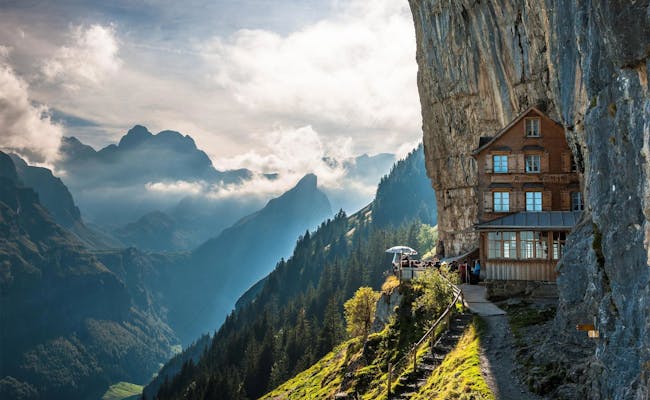
- Day 3: Alpstein - St. Gallen
Wherever you spent last night, we hope you slept well in this fresh mountain air. You can head straight back to St. Gallen after breakfast, but it’s really up to you how you plan out your day. You haven’t exhausted your hiking options by far, so keep going for as long as you please.
One option is to climb to Bogartenmannli and terminate your hike in Wasserauen after passing Seealpsee. This should put you on the train to St. Gallen some time in the afternoon. Or you can just walk back to Brülisau via Sämtisersee and Brüeltobel. The world is your oyster here.
On your way back to St. Gallen, you might like a quick stopover in Appenzell, the charming capital of the Canton of Appenzell Innerrhoden. In case you’re feeling brave, visit the little cheese store at Hauptgasse 13. But be warned, those smelly cheese fumes will knock your socks off the second you enter the store.
There’s no way your feet will be able to compete with that odour. Not even after two full days of being trapped inside your trekking boots... 🙂
In the evening, head back to St. Gallen and enjoy sleeping like a baby tonight. Spending a day or two in the mountains has a tendency to leave you peacefully exhausted.
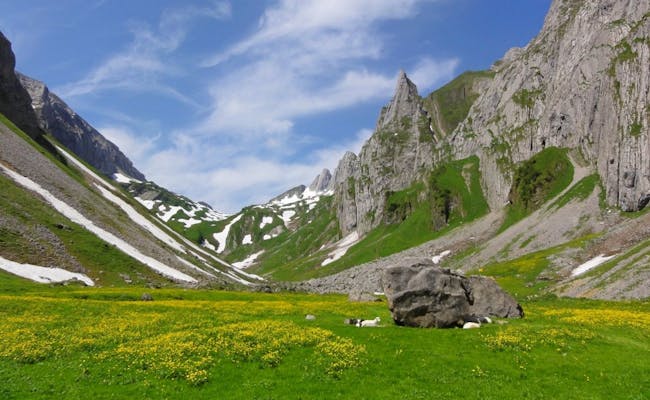
- Day 4: St. Gallen - Lake Constance - St. Gallen
It’s time to take it down a notch today. After two intense and possibly exhausting days in the Alpstein, take a relaxing trip to Lake Constance.
This lake is 63 kilometres (39 miles) long, up to 14 kilometres (8.7 miles) wide and shares its shores with Germany, Austria and Switzerland. It’s one of Europe’s biggest lakes and is very easy to reach from St. Gallen by train.
This tri-national area offers a considerable amount of sights and activities for you to discover. For one, there’s the picturesque town of Constance in Germany that’s just within walking distance from Kreuzlingen. Most Swiss go there for its cheap shopping, but Constance has more to offer than low-priced stores.
With its charming old town, a wide array of cafés, restaurants, ice cream places and peaceful spots to hang out by the lake, Constance certainly manages to attract visitors throughout the warmer months.
If you’re into fish and other creatures that live and dwell under water, the Sea Life is always a potential bad weather option.
Of course, you don’t need to leave the country to enjoy Lake Constance to its fullest. Visit one of the many beaches, go for a swim, catch a passenger ship, rent a stand up paddleboard, grab a bike and follow the trails or go for a walk along the lakeshore.
The Canton of Thurgau, which makes up most of the Swiss part along Lake Constance, is famous for its apple trees. One of the walks we recommend in this area is the Altnauer Apple Trail. It’s particularly idyllic when the trees bloom in April and May or then again during harvest time in autumn. The trail is basically divided into three separate trails, which all contain informative signs addressing different topics. Combine all three trails and you’ll know everything there is to know about apples. Oh, and options to buy and taste a selection of apple products are plentiful along the way, too.
Additional places of interest by Lake Constance are the towns of Romanshorn, Rorschach and Kreuzlingen. Once you’re done exploring the area, catch the train back to St. Gallen for one last night.
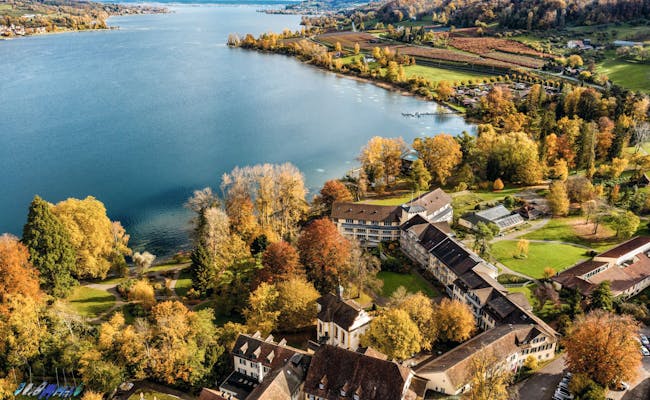
- Day 5: St. Gallen - Lucerne - Engelberg
You’ve probably seen enough of St. Gallen by now so grab your bags in the morning and catch the Voralpen-Express to Lucerne. Out of the many scenic train rides in Switzerland, this is one of the less touristy ones. It doesn’t come with fancy panorama windows and there’s no friendly voice pointing out what viaduct you just crossed.
But that doesn’t make it any less worth riding.
We recommend breaking up your journey halfway in and getting off in Rapperswil, a real hidden gem of a city. Head up to the castle, spend some time with the deer in the castle’s garden, go for a swim in Lake Zurich and walk along the idyllic esplanade. An excellent spot to relax is the lawn behind OST, the technical college of Rapperswil. You can’t miss it when you head toward the lake after leaving the train station.
If you’re looking for an easy walk, follow the wooden footbridge and the connecting walkway across the lake to Pfäffikon. In doing so, you’ll be completing three kilometres (1.8 miles) of the Camino de Santiago trail, a pilgrim route leading from different places across Europe to Santiago de Compostela in Spain.
Once you’re ready to move on, catch the next train to Lucerne and transfer to the train to Engelberg. This versatile mountain village is situated about 25 kilometres (15 miles) south of Lake Lucerne and lies at an altitude of 1.013 metres (3.323 feet) above sea level. At 3.239 metres (10.626 feet), towering over the other peaks surrounding Engelberg, is mighty Mount Titlis.
Since you’ll arrive in Engelberg mid- or late afternoon, there won’t be enough time to head up there right away. So let’s leave that until tomorrow to make sure you don’t feel rushed. Instead, what you can do this afternoon is check out the centre of Engelberg. Or more specifically, the Benedictine monastery.
This ancient monastery, which was founded in 1120, is still inhabited by 30-odd monks. You can either visit the premises on your own or join a guided tour.
- Day 6: Free day in Engelberg
Like so many places in the Swiss Alps, Engelberg has its focus on the outdoors. Unarguably the most popular destination in this area is Mount Titlis. From Engelberg, you’ll reach the top by catching two gondolas. One of them being the world’s first revolving aerial cableway. Expect to be presented with some impressive 360-degree views at the top. Alongside an impressive glacier cave and the exciting Titlis Cliff Walk by Tissot.
The hiking options in the area around Engelberg are also seemingly endless and cater to all kinds of preferences. One recommended hike is the so-called “Kitzelpfad” in Brunni. What literally translates to “tickle-path” requires you to take off your shoes and walk across different types of soil. And whilst your feet get tickled by nature, you’ll also be able to enjoy the perfect views of Mount Titlis.
Now what would a proper hike be without coming across a mountain lake or two...?
A slightly more advanced hike called Four-Lakes hike takes you past – you might have guessed it – four mountain lakes. Since this excursion takes almost five hours to complete, we recommend you only opt for it if you’re feeling fit enough.
For a more relaxing and less straining day, you might prefer the wheelchair accessible path around Engelberg. This two-hour walk starts at the monastery in the centre of Engelberg and leads all the way to the picturesque River Aa and back. Even though this walk doesn’t take you up into the peaks, it still comes with some pretty acceptable mountain views.
During winter, Engelberg turns into an absolute heaven for snow lovers. Whether you’re into skiing, snowboarding, snowshoeing, hiking, cross-country skiing, ice skating or sledging, you’ll have your expectations met. Engelberg is especially popular among freeriders.
- Best things to do in Engelberg
- Brunni Engelberg
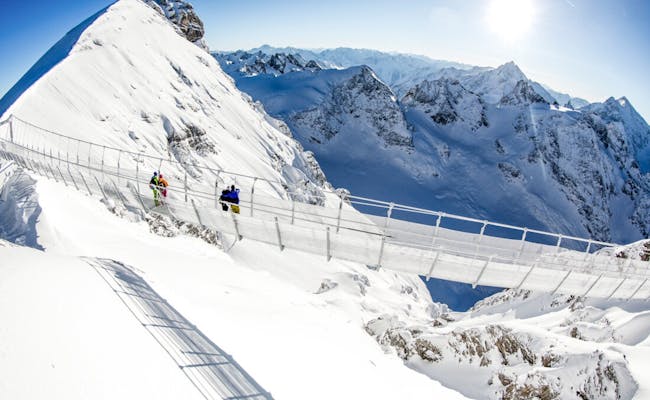
- Day 7: Engelberg - Lucerne
If there’s anything you wanted to do in Engelberg yesterday but ran out of time, get that over with in the morning and leave for Lucerne afterwards. Travelling from Engelberg to Lucerne takes less than an hour and is very straightforward.
Once you arrive, store your bags at the train station and spend a few hours exploring this charming city. Walk across the Kapellbrücke, take a stroll through the old town, hang out by the lake or visit the Glacier Garden with its famous Lion Monument.
You’ve got all day here so take your time. For more ideas of things to do in Lucerne, turn back to day 2 on itinerary No. 2.
- Additional tips and information for itinerary 6
- In the Alpstein you will always come across alpine huts where you can buy fresh products such as milk, cheese and bread. By the way, milk never tastes better than straight from the cow or goat. And after you've dragged your body up a steep mountain for a few hours, you'll love the refreshment.
- There's a lot going on in Alpstein, especially in summer. If you can, you should plan your hike on a weekday, as there are usually fewer people out then.
- If you want to stay overnight on the Fälenalp, you should call ahead to make a reservation. Ask either at your accommodation in St. Gallen or at the tourist information if they will call for you. The same applies to Bollenwees. Book your bed online or call directly.
- In case you decide to take a trip across to Constance in Germany, don’t forget to exchange some Euros. And make sure to bring your passport, too. Since Switzerland isn’t part of the European Union, you have to show your passport when leaving the country.
- The Voralpen-Express is included with the Interrail, Eurail and Swiss Travel Pass.
7. Itinerary for mountain lovers with the Glacier Express Line and lots of outdoor activities
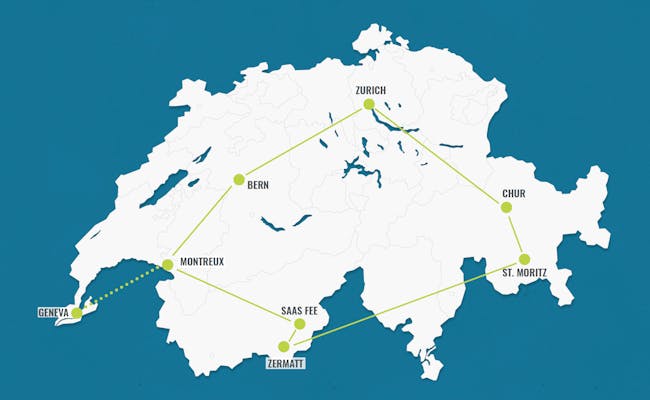
- Ride the entire Glacier Express panoramic train - the slowest express train in the world
- Hike at the foot of the famous Matterhorn
- Ski or hike in Saas-Fee - the pearl of the Alps
- Stroll along the promenade in Montreux on Lake Geneva
- Visit the old town of Bern - the capital of Switzerland
- Best things to do in Chur
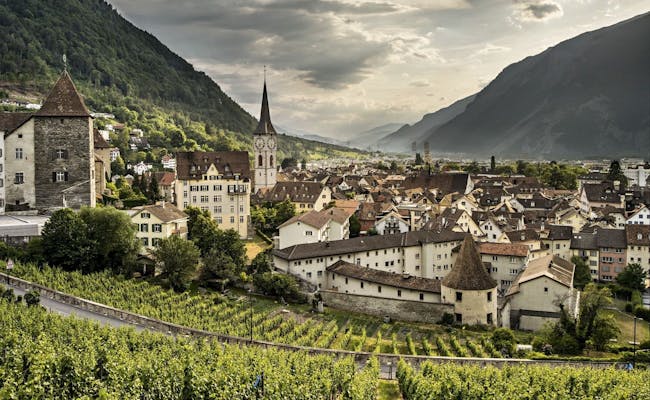
Like Zermatt and Saas-Fee, St. Moritz is all about the outdoors. Summer and winter. Whether you’re into biking, hiking, stand up paddling, swimming, windsurfing, skiing, snowboarding, snowshoeing, cross-country skiing or just going for a walk, you’ll find your fix.
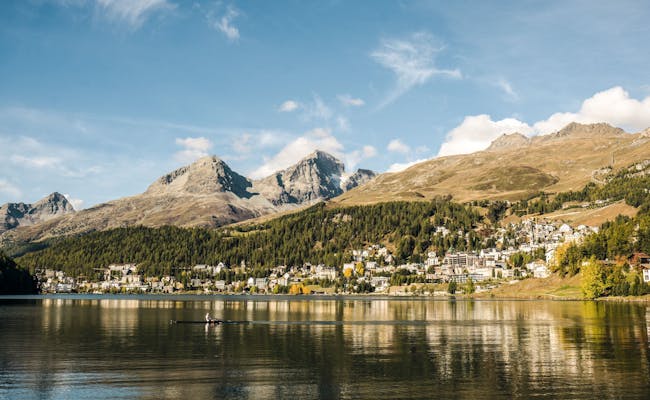
- Day 3: St. Moritz - Zermatt
Today, you’re going to complete the full Glacier Express from St. Moritz to Zermatt. This ride on “the world’s slowest express train” is a once in a lifetime experience and will spoil you with the best views the Alps have to offer.
The train leaves St. Moritz twice a day, with both trains departing in the morning. The schedule changes throughout the year and there are certain trains that don’t do the full journey between St. Moritz and Zermatt. To find your connection, please make sure you consult their current timetable.
There’s a reason why the Glacier Express is one of the most popular scenic railway routes in Switzerland. What makes this journey so memorable are the fantastic views you get left, right and centre throughout the whole ride. The train takes you across 291 bridges, through 91 tunnels, three cantons and two language regions.
It takes just over 8 hours to complete and depending on what time you leave St. Moritz, you’ll arrive in Zermatt between 5 and 6 pm. Whenever you do arrive, spend the rest of the day strolling through this little mountain town and enjoy the sight of the mighty Matterhorn.
Provided it’s not veiled in clouds.
- Glacier Express - What to expect on this scenic train journey
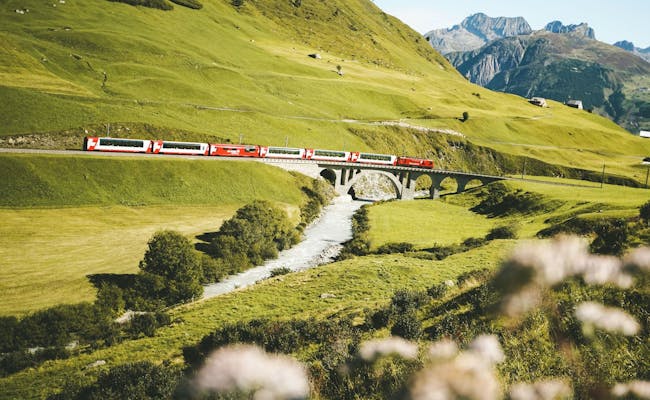
- Day 4: Free day in Zermatt
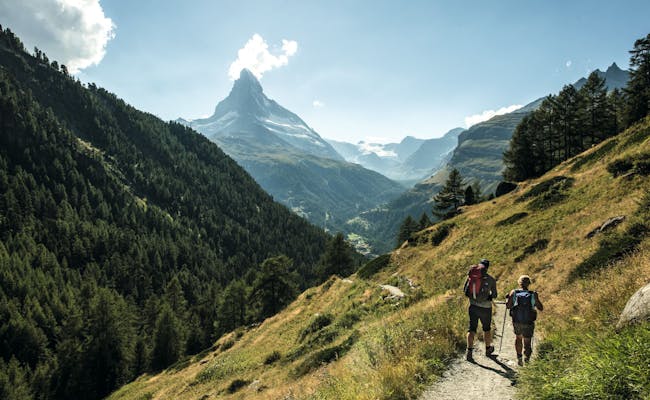
- Day 5: Zermatt - Saas-Fee
Get ready for some more mountain action today. Whenever you’re done exploring Zermatt, catch the train and bus to Saas-Fee.
Saas-Fee, also known as the “pearl of the Alps”, is surrounded by Switzerland’s tallest mountains. As you arrive in this miraculous alpine village, you’ll find yourself in the midst of 13 mountains that are all over 4000 metres (13.120 feet) above sea level.
This can only mean one thing. You have to love the outdoors to come up here… If you’re visiting during summer, your hiking options are nearly infinite. Over 350 kilometres (217 miles) of hiking trails take you places you never even knew existed.
And while we’re at it, don’t forget to look out for marmots during your hike. Your chances of spotting a couple of those cute, chubby alpine inhabitants aren’t too slim up here.
But Saas-Fee isn’t only interesting during hiking season. If you’re here in winter, you can absolutely ski or snowboard yourself silly. And with Saas-Fee being at such high altitude, you’ll partially be skiing on top of a glacier. Not something you get to do every day.
Over 150 kilometres (93 miles) of prepared slopes will keep you busy for as long as you please. And while other ski resorts have been struggling with a lack of snow these past few years due to global warming, you’re almost certain to find enough snow in Saas-Fee due to its high altitude.
Knock yourself out enjoying the mountain views, the snow, the hikes, the marmots and the fresh air.
- Best things to do in Saas-Fee
- Day 6: Saas-Fee - Montreux
There’s certainly more than one day’s worth of things to do and see in Saas-Fee. Which means today is the perfect time to tick off anything you didn’t get to yesterday.
Once you’re ready to leave, catch the train and head to Montreux by Lake Geneva. Go to the Promenade and check out the Freddie Mercury statue just outside the market hall. If you’re keen on visiting the famous Chillon Castle, follow the Promenade to the castle or catch a bus. Passenger ships also take you there on a regular basis.
Alternatively, visit the famous Lavaux vineyards, a UNESCO World Heritage site. To fully experience the gorgeous views, get off in Cully or Epesses and follow the signposted footpath through the vineyards.
We’re aware that this is quite a full schedule for today and we don’t encourage you to try and cover it all. But now that you know your options, you’re flexible and can plan your day according to your preferences.
And maybe the weather... Plus, you’ve got all day tomorrow around here so take your time.
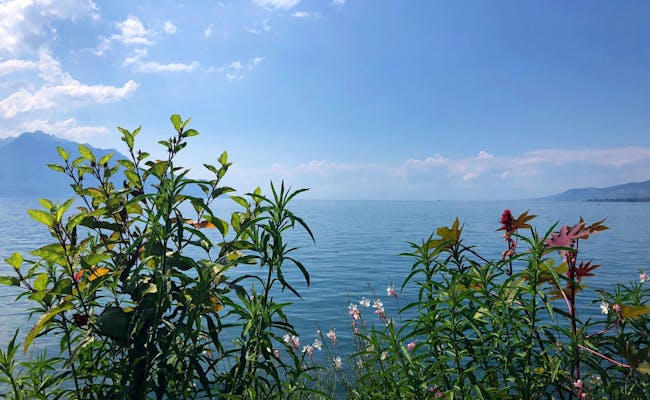
- Day 7: Free day in Montreux
Can you hear Lake Geneva calling your name? Follow that call today and tick off whatever’s left from yesterday’s list. Like visiting Château de Chillon, the Promenade in Montreux and of course the mind-blowing Lavaux vineyards.
Also, the city of Lausanne is fairly close to Montreux. The train ride takes less than half an hour and we recommend you go pay it a visit if you have time. Its picturesque old town is built on three hills and surrounded by numerous vineyards. This city right by Lake Geneva is home to the International Olympic Committee, as well as Switzerland’s only metro.
Since you’re spending today right by Switzerland’s largest lake, you also have the option to go on a boat cruise. Spending a few hours on Lake Geneva is the perfect way to wind down and not rush from one place to another for a change.
Another pretty promising option for today is to pay Gruyères and Broc a visit for some serious cheese and chocolate action. If this is something you’d be interested in, turn back to day 7 on itinerary No. 5. Just make sure you leave for this trip on an empty stomach.
As you can see, there are plenty of activities in the area to keep you busy for a day before you settle down in charming Montreux for another night.
- Best things to do in Lausanne
- Day 8: Montreux - Bern - Zurich / Geneva
It’s time to say goodbye to the wonderful Lake Geneva region already and get a move on to Bern. Before finishing your trip in Zurich (or Geneva) tonight, you’ve got a day to explore Switzerland’s capital.
Store your luggage at the train station in Bern. After that, you’ve got a few hours to explore this UNESCO certified city. Join a guided city tour or explore Bern on your own. Take a stroll through the old town, head to the bear park, check out the Bundeshaus (House of Parliament) and walk back to Rosengarten for the views.
Toward the end of the day, catch the train to Zurich or Geneva. Whichever city it is you’re leaving Switzerland from.
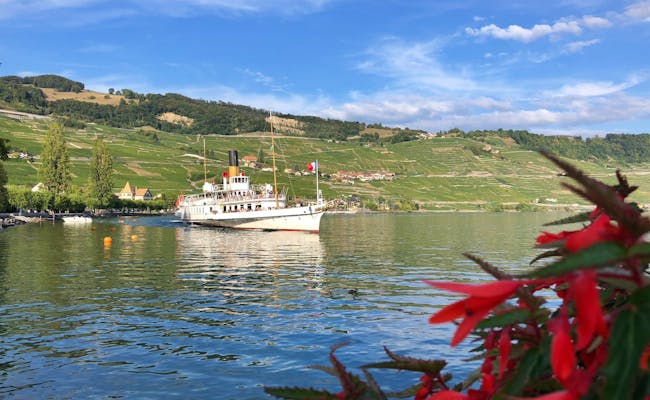
- Additional tips and information for itinerary 7
- While you explore Chur, you can leave your luggage in a locker at the train station in Chur.
- The Glacier Express is covered by all major travel passes such as the Swiss Travel Pass and Interrail and Eurail passes. However, you still need to make a reservation even if you have a passport.
- In winter, Zermatt is a very popular but expensive ski resort. Be sure to book your accommodation in advance during the high season.
- Access to Chillon Castle is free if you have a Swiss Travel Pass. Even if you don't want to visit the castle, it's worth seeing it from the outside.
8. Itinerary with the highlights of western Switzerland and a trip into the Bernese Alps

- Discover the charming towns of Nyon, Lausanne and Montreux on Lake Geneva
- Treat yourself to a glass of wine in the wine terraces of the Lavaux region (UNESCO)
- Hike to Dent de Vaulion for sweeping views from the Jura Mountains
- Visit the historic city centre of Bern (UNESCO)
- Take a stroll through the picturesque old town of Morat
- Go on a day trip from Bern to Interlaken or to the crystal clear Lake Oeschinensee
- Spend a night in Gstaad in the Bernese Alps
- Venture on the Peak Walk on the Glacier 3000 between two mountain peaks
- Day 1: Geneva - Nyon - Lausanne
In the morning, explore Geneva on your own, borrow a free bike with «Genève Roule» or join a guided city tour. After the tour, buy some take-away lunch and have it on the train to Nyon.
This mediaeval town by the shore of Lake Geneva is surrounded by a couple of charming vineyards. Follow the path through the vineyards to Nyon Castle to take in the view. After your lunch break, catch the train to Lausanne. Check in to your accommodation and make the most of your free Lausanne Transport Card.
Lausanne’s picturesque old town is built on three hills and surrounded by numerous vineyards. It’s home to the International Olympic Committee, as well as Switzerland’s only metro.
To hear something interesting, head to the Cathedral between 10 pm and 2 am and observe the tower. Night guards have been shouting out the current time in the middle of the night from up there since 1405.
- Best things to do in Geneva
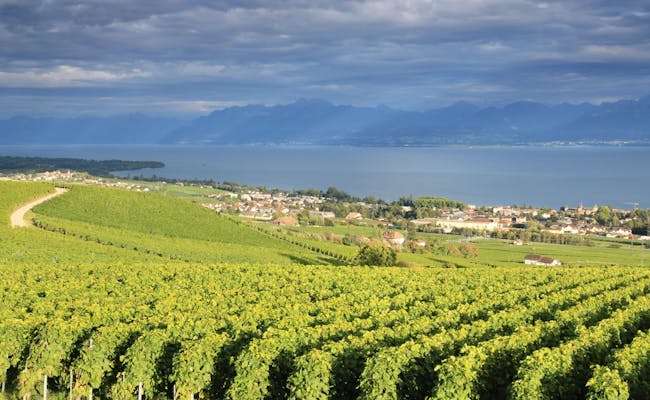
- Day 2: Lausanne - Lac de Joux / Creux du Van - Lausanne
After breakfast, buy enough food for the day and head straight to Le Pont, a village in the Valleé de Joux. The train ride from Lausanne to the valley takes roughly an hour. Vallée de Joux is part of the Jura mountains and offers countless hiking options. In the centre of the valley, you’ll find a peaceful lake called Lac de Joux.
By far the most popular spot in the area is the distinctive mountain of Dent de Vaulion. Hiking the circular path from Le Pont takes around three hours. The views from Dent de Vaulion across the Vallée de Joux, all the way to Lake Geneva and way into France, make this place extra special.
Since you’ve got all day up here, spend as much time in the area as you like. Hang out by Lac de Joux, walk the path around the lake or do whatever else your heart desires. Whenever you feel like it, catch the train back to Lausanne and spend the rest of the day exploring the city.
If you’re in for a bit of a challenge, we recommend hiking to Creux du Van instead. This natural, one-kilometre wide amphitheatre got its shape from constant erosion by water and ice. Marmots, mountain goats, deer and various birds inhabit this area.
The starting point of the hike is in Noiraigue, a village that takes roughly an hour and a half to reach from Lausanne. Hiking to Creux du Van is pretty tough and will take up to five hours. Spend as much time as you like at the amphitheatre before heading back to Noiraigue and Lausanne.
Of course, Switzerland gets its fair share of bad weather and we don’t suggest you do this hike if it’s raining. The rocks can get slippery and dangerous when they’re wet and we don’t want you to get hurt!
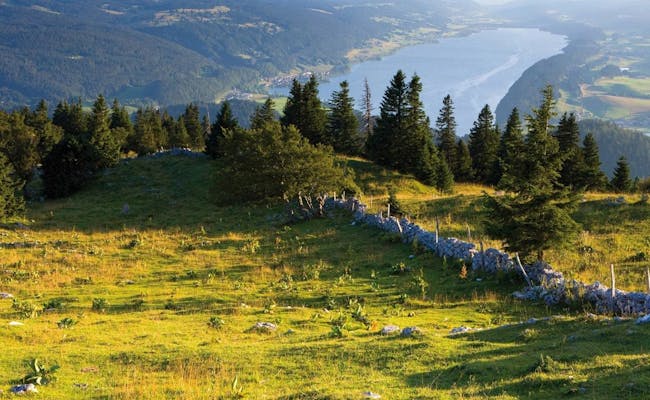
- Day 3: Lausanne - Lavaux - Bern
In the morning, cover some more ground in Lausanne. Before you leave for Bern, make sure you spend some quality time in one of our favourite spots in Switzerland. Only a short train ride east of Lausanne, you’ll find the famous Lavaux vineyards, a UNESCO World Heritage site.
To fully experience the gorgeous views, get off in Cully or Epesses and follow the signposted footpath through the vineyards. The views across Lake Geneva are unparalleled and will take your breath away.
After your little excursion, go back to Lausanne to pick up your luggage. From there, a direct train takes you to Bern in just over an hour. You’ve got the rest of the day to roam the streets of our capital city. Take a stroll through the old town, head to the bear park, check out the Bundeshaus (House of Parliament) and walk up to Rosengarten for the views.
You can also visit Gurten – Bern’s backyard mountain – see some animals at Dählhölzli wildlife park or visit the botanical garden. Alternatively, catch the elevator at the train station to hang out at Grosse Schanze or go for a swim either in the River Aare or at Weyermannshaus. In the evening, we recommend you walk (or catch the bus) back up to Rosengarten for some impressive night views.
- Day 4: Bern - Morat - Neuchâtel - Bern
After breakfast, catch the train and venture to the quaint little town of Morat. This ride will only take you half an hour and you won’t even need to transfer. Morat itself is tiny and won’t take you long to figure out. Spend a few moments strolling through its historic town centre and stretch your legs by the lake.
This area is perfect for biking, hiking, swimming or just hanging out by the lake as well.
By the way, you’ll find Europe’s longest freshwater beach at Lake Morat in Salavaux. This might not impress anyone who grew up by the sea, but for a land-locked country like Switzerland, this is a big deal...
Once you’ve seen enough of Morat, travel on to Neuchâtel. Spend the afternoon exploring this beautiful city with its lake views and steep alleyways. For some additional great views, head up to Chaumont, Neuchâtel’s backyard mountain.
The funicular leaves from Le Coudre and takes you to the summit. From the summit, you can hike down to Cressier via Trois Cheminées. From Cressier, the bus will take you back to Neuchâtel. Alternatively, go for a walk around Chaumont and catch the funicular back down.
Toward the end of the day, make your way back to Bern and enjoy another night in Switzerland’s capital.
- Best things to do in Morat
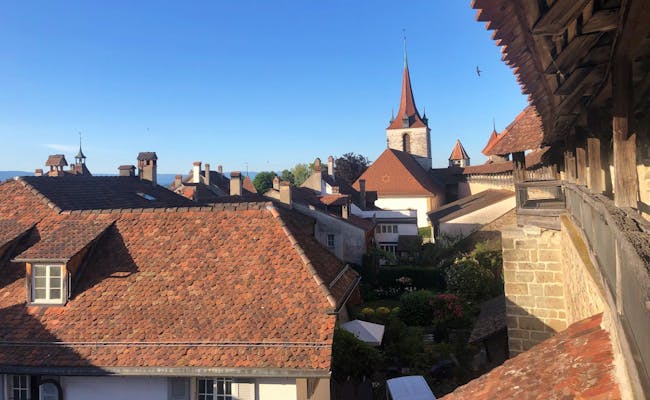
- Day 5: Day trip from Bern
Bern is conveniently located in close proximity to a variety of breathtaking destinations. For one, there’s Thun and Interlaken, which are two wonderful places to visit for some spectacular lake and mountain views.

- Day 6: Bern - Gstaad
You’re probably ready to leave Bern by now. So grab your bags in the morning and hop on the train to Gstaad. You’re in for plenty of scenic treats today. From Spiez to Zweisimmen and onward to Gstaad, you’ll be travelling on the Golden Pass Line. This popular scenic train route connects the centre of Switzerland with the shores of Lake Geneva.
After your second transfer in Zweisimmen, the climb through the Bernese Oberland towards Gstaad begins. This region is an absolute dream for mountain-lovers and pretty much sums up what Switzerland is about. Lakes, mountains, lush meadows with grazing cows, glaciers, tons of hiking trails, wonderful landscapes and cute little villages are abundant in this area.
This is why you’ll be spending two nights up here. Get off in Gstaad, check into your accommodation and head out to explore the Alps. Your hiking options are endless. Find a hike that suits your fitness level and enjoy the views. By the way, Lake Lauenensee is only one of the popular places you can visit up here.
- Day 7: Gstaad - Glacier 3000 - Gstaad
If there was ever a day when you needed your camera, it’s today. The mountain panorama awaiting you at your destination is unparalleled, so make sure your battery is fully charged.
The destination we're talking about is the impressive Glacier 3000, which is very easy to access from Gstaad. After a 35-minute bus ride to Col-du-Pillon, you’ll find yourself at the base of some seriously impressive mountains.
Hop on the cable car and enjoy the ride. At the top, you’ll be presented with the most astonishing 360-degree views. On a clear day, you can see several huge players in the alpine scene like the Matterhorn, the Mont Blanc massif and the popular mountain-trio Eiger, Mönch and Jungfrau.
If you’re brave enough, tackle the Peak Walk to Scex Rouge. This is the world’s first suspension bridge connecting two peaks. Crossing this bridge is an experience you’ll likely never forget.
Depending on what time you arrive back in Gstaad, spend a couple more hours strolling through the town or set out on another hike before enjoying one more night in the Bernese Alps.
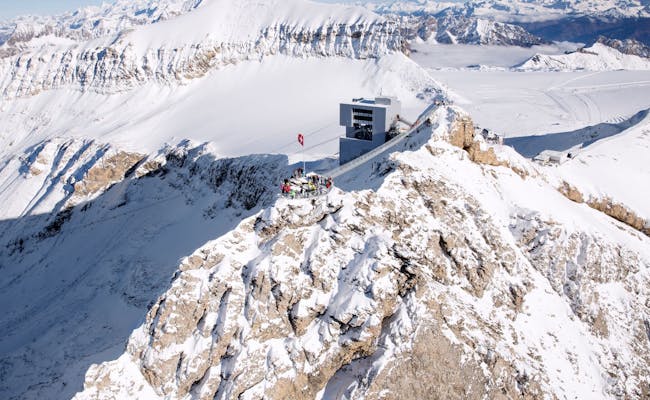
- Day 8: Gstaad - Montreux - Geneva
Time to say goodbye to this beautiful region. Catch the Golden Pass train after breakfast and continue your scenic journey to Montreux, where you have a couple of hours before travelling back to Geneva. Head to the Promenade of Montreux and check out the Freddie Mercury statue just outside the market hall.
Head back to Geneva toward the end of the day and spend the evening in Switzerland’s second largest city.
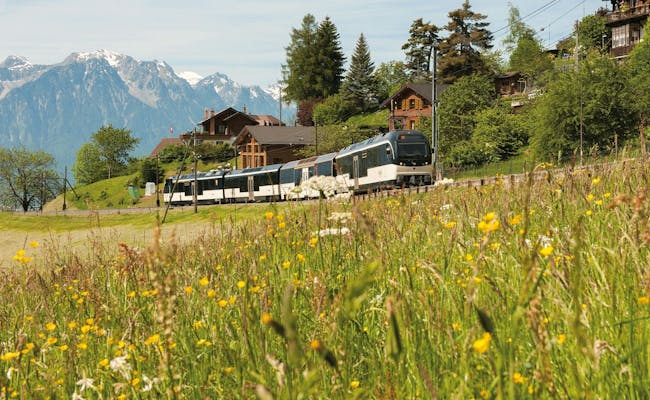
- Additional tips and information for itinerary 8
- Upon check-in at your accommodation in Lausanne and Bern, you’ll receive a Transport Card that allows you to use local transport for free.
- The Golden Pass Line is fully covered by the Interrail, Eurail and Swiss Travel Pass.
9. Itinerary across all of Switzerland from Lake Geneva to Lake Constance in eight days
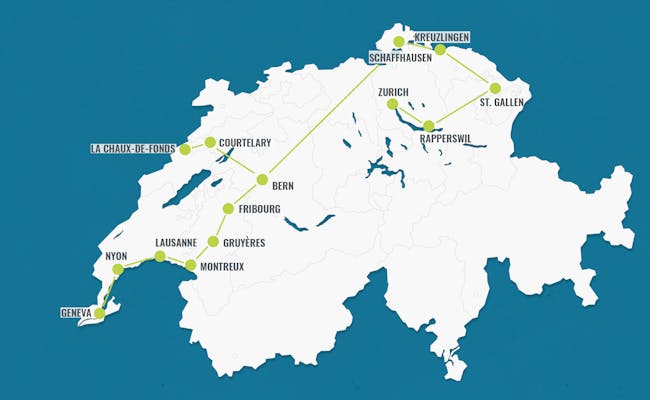
- Visit Maison Cailler and Camille Bloch to fill your belly with delicious Swiss chocolate
- Check out the historic city centre of Bern (UNESCO)
- Travel to La Chaux-de-Fonds, the cradle of the Swiss watchmaking business (UNESCO)
- Marvel at the Rhine Falls, the largest waterfall in Europe
- Spend some time by Lake Constance
- Ride on the Voralpen-Express to Rapperswil
- Discover the highlights of Zurich - Switzerland’s largest city
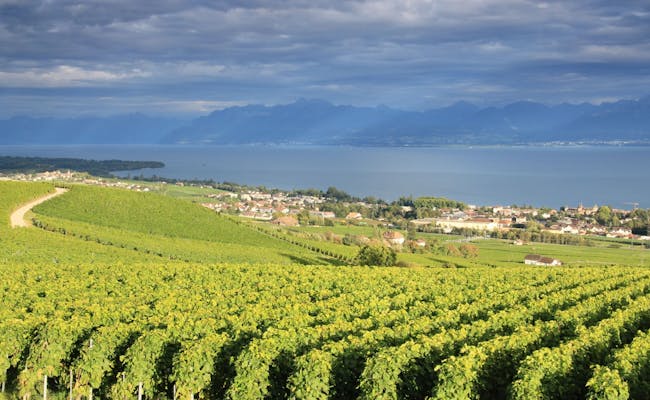
- Day 2: Lausanne - Montreux - Gruyères - Lausanne
After breakfast, catch the train and head to Montreux, where you spend a couple of hours exploring the town, walking along the Promenade or visiting Château de Chillon. Around lunchtime, travel to the very touristy yet wonderful, quaint little village of Gruyères. The ride between Montreux and Montbovon is served by regular regio trains as well as the famous Golden Pass Line.
Since Gruyères is highly popular with tourists, it can sometimes get a bit crowded. But like with every busy place, there’s a reason. And in this case, the reason is a mediaeval village and cheese.
Lots of cheese!
The Gruyère cheese factory is right behind the train station and for a small entrance fee, you get to watch how the iconic Gruyère cheese is being made. Samples and tasting opportunities are included.
Once you’re done snacking, either catch the bus uphill or follow the path until you reach the village centre of Gruyères. This walk should take you around 20 minutes. After exploring the hidden cobblestone alleys, checking out the castle and maybe grabbing a souvenir or two, you have the option to head to Broc and visit La Maison Cailler.
Their visitor centre teaches you everything you need to know about Switzerland’s oldest chocolate brand and at the end of the tour, you’ll get to taste a lot of free samples.
On your train ride back to Lausanne, try to digest your cheese and chocolate overdose and get ready to spend the night by Lake Geneva.
- Day 3: Lausanne - Fribourg - Bern
Spend the morning covering some more ground in Lausanne or visit the stunning nearby Lavaux vineyards. Whenever you’re ready to move on, catch the train to Fribourg. In Fribourg, follow the city-walk signs leading you through this mighty old town. The signs will lead you up and down some very steep alleyways, across ancient wooden bridges, down to the River Saane and past the city’s very own funicular.
For an even better view of your surroundings, tackle the 365 steps to the tower of the Cathedral. The River Saane at the bottom of the city is a great spot to stretch your legs and treat yourself to a snack.
Getting to Bern from Fribourg takes less than half an hour. Spend the rest of the evening strolling through the UNESCO listed old town of Bern. For an impressive night view over Bern, we recommend heading up to Rosengarten.
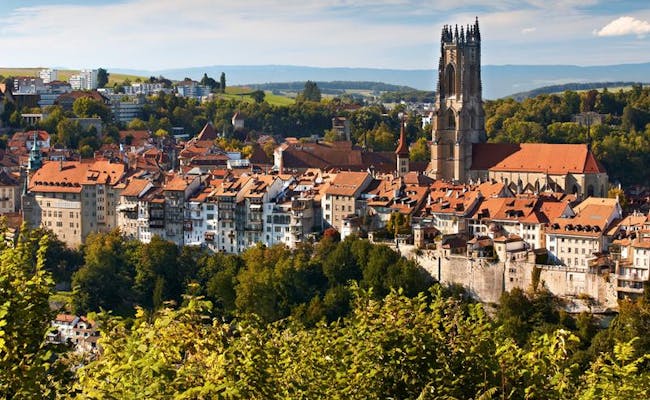
- Day 4: Bern - La Chaux-de-Fonds - Bern
Today, it’s time to travel north and check out the Cantons of Neuchâtel and Jura. After breakfast, head straight to La Chaux-de-Fonds in the Canton of Neuchâtel. Le Corbusier, one of the most influential architects of the 20th century, was born here. And since this city was the centre of the Swiss watchmaking industry for over 100 years, it only makes sense for the International Clock Museum to be up here.
Another characteristic element to La Chaux-de-Fonds, apart from clocks and watches, is its chessboard-shaped outline. When the city was destroyed by a fire in the 19th century and they had to rebuild it from scratch, they introduced the unusual framework you’ll find today. Unusual for Switzerland, that is.
On your way back to Bern, make sure you stop over in Courtelary, a tiny little place in the Canton of Jura. This inconspicuous village is by no means as innocent as it seems. It’s home to Camille Bloch, the company behind two absolute Swiss favourite chocolate brands.
Ragusa and Torino.
Their visitors’ centre is a fantastic place to buy all different kinds of their delicious chocolate creations. And their exhibition doesn’t stop at telling you about the ups and downs of this family business since its early beginnings in 1926.
It also includes a mouth-watering demo station where two chocolatiers make Ragusa and Torino bars right in front of you. Needless to say you’ll be able to taste their mouth watering outcome only minutes after it’s cooled off.
Take your time enjoying some of the best chocolate before you head back to Bern.
- Camille Bloch Chocolate Factory
- Day 5: Bern - Rhine Falls - Schaffhausen
Since you haven’t had too much time to hang out in Bern yet, give yourself a few hours to explore our capital city before travelling to Schaffhausen.
Join a guided city tour or explore Bern on your own. Take a stroll through the old town, head to the bear park, check out the Bundeshaus (House of Parliament) and walk up to Rosengarten for the views.
Around lunchtime, catch the train to Schaffhausen and drop your bags at your accommodation before you head out again. The main attraction in the area are the mighty Rhine Falls. They attract visitors from all over the world and are one impressive force of nature. Access to the falls is free from the northern shore, while seeing them from Laufen Castle in the south costs 5 CHF. Spend however long you like getting soaked in the mist of the Rhine Falls before moving on to Schaffhausen.
- Best things to do in Schaffhausen

- Day 6: Schaffhausen - Stein am Rhein - Kreuzlingen
After breakfast and maybe spending some more time strolling through Schaffhausen, hop on the train and visit the picture-perfect old town of Stein am Rhein. This little town is where Lake Constance ends and the River Rhine begins.
Small yet incredibly charming, Stein am Rhein is the ideal place to spend some time admiring those beautifully painted houses. Once you’ve seen enough, embark on a journey up the River Rhine and back to Schaffhausen. This boat trip takes roughly two hours and is said to be one of the prettiest in Switzerland.
Back in Schaffhausen, grab your luggage and move on to Kreuzlingen by Lake Constance.
Fairly big Lake Constance is 63 kilometres (39 miles) long, up to 14 kilometres (8.7 miles) wide and shares its shores with Germany, Austria and Switzerland. This tri-national area offers a considerable amount of sights and activities for you to discover.
For one, there’s the picturesque town of Constance in Germany, which is within walking distance from Kreuzlingen. Most Swiss go there for its cheap shopping, but Constance has more to offer than low-priced stores.
With its charming old town, a wide array of cafés, restaurants, ice cream places and peaceful spots to hang out by the lake, Constance certainly manages to attract visitors throughout the warmer months. If you’re into fish and other creatures that live and dwell under water, the Sea Life is always a potential bad weather option.
- Lake Constance
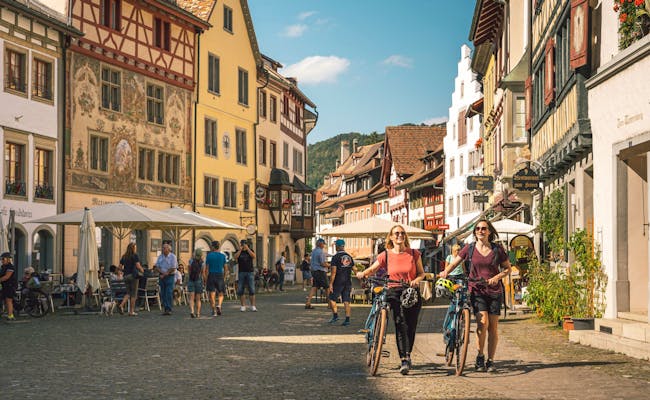
- Day 7: Kreuzlingen - Rapperswil
Spend as much time in the Lake Constance area today as you please. The train ride to Rapperswil, your next destination, takes two hours so you’ve got pretty much all day out here.
The Canton of Thurgau, which makes up most of the Swiss part along Lake Constance, is famous for its apple trees. One of the walks we recommend in this area is the Altnauer apple trail. It’s particularly idyllic when the trees bloom in April and May or then again during harvest time in autumn. The trail is divided into three separate trails, which all contain informative signs addressing different topics. Combine all three trails and you’ll know everything there is to know about apples. Options to buy and taste a selection of apple products are plentiful along the way, too.
Additional places of interest by Lake Constance are the towns of Romanshorn, Rorschach and of course Kreuzlingen, where you spent last night.
Once you’re ready to leave and continue your journey, catch the train to Rapperswil. Travel to St. Gallen and get on the Voralpen-Express, a scenic train connecting St. Gallen with Lucerne. Get off halfway in Rapperswil, where you’ll be spending the night. We’re assuming you won’t have too much left of the day after your arrival. Just relax in this pretty town by the shores of Lake Zurich. Head up to the castle, spend some time with the deer in the castle garden, go for a swim in Lake Zurich and walk along the idyllic esplanade.
- Voralpen-Express
- Best things to do in Rapperswil
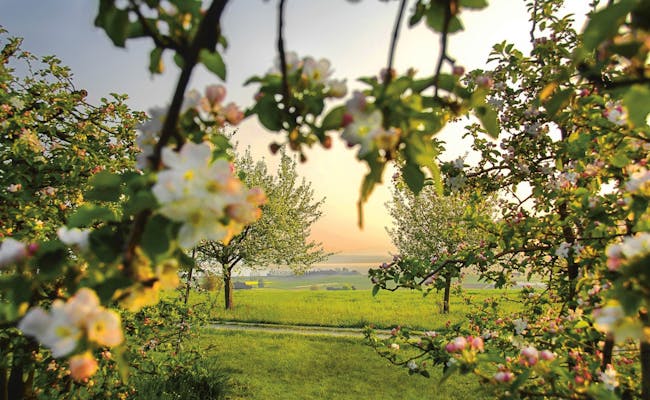
- Day 8: Rapperswil - Zurich - Geneva
If you’re looking for an easy walk after breakfast, follow the wooden footbridge and the connecting walkway across the lake to Pfäffikon. In doing so, you’ll be completing three kilometres (1.8 miles) of the Camino de Santiago trail, a pilgrim route leading from different places across Europe to Santiago de Compostela in Spain. In case you’d rather not walk both ways, frequently leaving trains will take you back across the dam from Pfäffikon to where you started.
Back in Rapperswil, grab your luggage and embark on a short train ride to Zurich. Or, instead of travelling by train, you also have the option to hop on the passenger ship. The ride takes roughly two hours and might be a great way to take some speed out of your travels.
You can either head out to explore Zurich on your own, borrow a free bike with «Züri rollt» or join a guided city tour. In the afternoon, catch the train back to Geneva. Depending on what your plans in Geneva are tonight, you have a few hours to explore before terminating your trip.
- Additional tips and information for itinerary 9
- The passenger ship between Stein am Rhein and Schaffhausen doesn’t run all year round. Please check their timetable to plan your journey accordingly. If you’d rather skip this part, catch the train back to Schaffhausen instead.
10. Itinerary for culture and nature lovers with six city trips and three free days in Interlaken
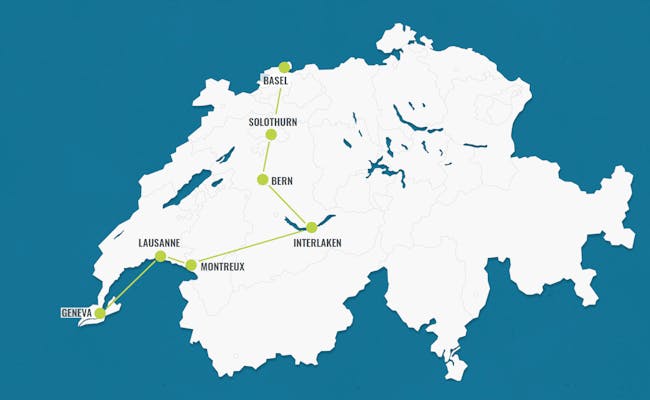
- Discover the charming cities of Lausanne and Montreux on Lake Geneva
- Ride parts of the Golden Pass panoramic train between Montreux and Interlaken
- Discover everything that Switzerland stands for in Interlaken: lakes, mountains, rivers and fantastic landscapes
- Check out Solothurn, Switzerland’s most beautiful baroque city
- Geek out in one of the many museums in Basel
- Day 1: Geneva - Lausanne - Montreux
In the morning, explore Geneva on your own, borrow a free bike with «Genève Roule» or join a free walking tour. After the tour, buy some take-away lunch and have it on the train to Lausanne.
This picturesque old town was built on three hills and is surrounded by countless vineyards. It’s home to the International Olympic Committee, as well as Switzerland’s only metro. Move on to Montreux whenever you’re ready, drop your bags at your accommodation and spend the rest of the day exploring Montreux.
Alternatively, head over to Lavaux. Only a short train ride west of Montreux, you’ll find the famous Lavaux vineyards, a UNESCO World Heritage site. To fully experience the gorgeous views, get off in Cully or Epesses and follow the signposted footpath through the vineyards.
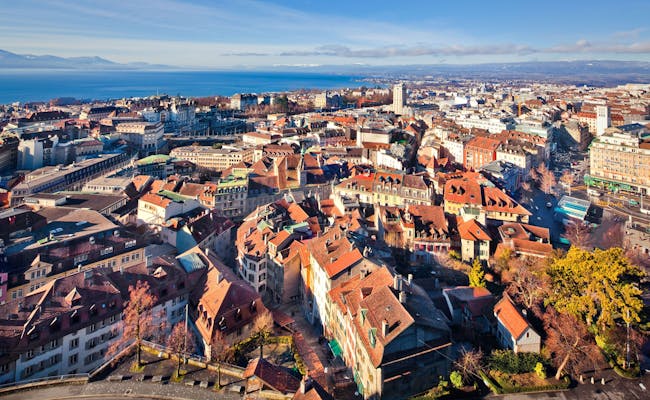
- Day 2: Montreux - Interlaken
You’re in for plenty of scenic treats today. Spend a few more hours in and around Montreux in the morning before moving on. Leave the Lake Geneva region and start your climb up into the Alps on the Golden Pass Line. After a couple of tunnels, you’ll arrive in the Bernese Oberland, our favourite part of the whole train journey.
This region is an absolute dream for mountain-lovers and pretty much sums up what Switzerland is about. Lakes, mountains, lush meadows with grazing cows, glaciers, tons of hiking trails, wonderful landscapes and cute little villages are abundant in this area.
Even if you don’t have enough time to get off along the way, the ride through this picturesque area is something you probably won’t forget anytime soon. After leaving the Bernese Oberland and coming down the hills, you’ll arrive in Zweisimmen, where you’ll need to transfer to another train.
The last leg of the journey takes you past Spiez and Lake Thun before you finally arrive in Interlaken. Spend whatever you have left of the day exploring this popular town and get ready for a couple of days in this adrenaline and scenery-packed destination.

- Days 3, 4 and 5: Free days in Interlaken
You’ve got more activities to choose from these next three days than you can wrap your head around. It all depends on your budget, but in an adrenaline-packed place like Interlaken, the sky’s the limit.
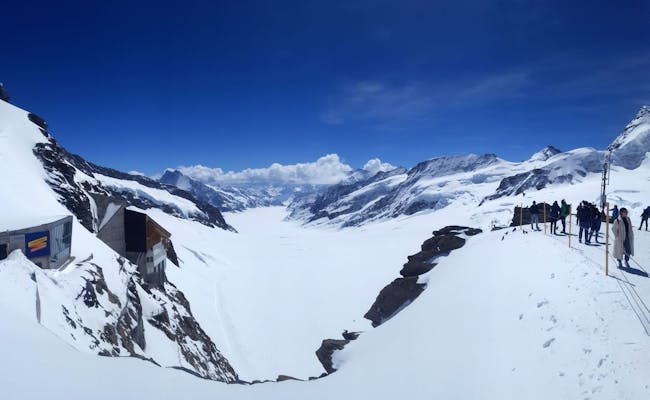
- Day 6: Interlaken - Bern - Solothurn
We’re assuming you’ve had enough time to tick off all your must-dos in Interlaken these past three days and are ready to see Bern now. In this charming UNESCO listed city, you’ve got plenty of activities to choose from as well.
Join a guided city tour or explore Bern on your own. Take a stroll through the old town, head to the bear park, check out the Bundeshaus (House of Parliament) and walk back to Rosengarten for the views.
You should definitely find enough things to keep you busy for a while. Whenever you feel like you’re ready to leave Switzerland’s capital, hop on the train for a short ride to Solothurn, commonly known as Switzerland’s most beautiful baroque city.
You might not have much time to discover Solothurn tonight. So treat yourself to a few scoops of ice cream at Vitaminstation – one of the ice cream places ever – and have it while sitting on the stone wall along the River Aare.
- Best things to do in Solothurn
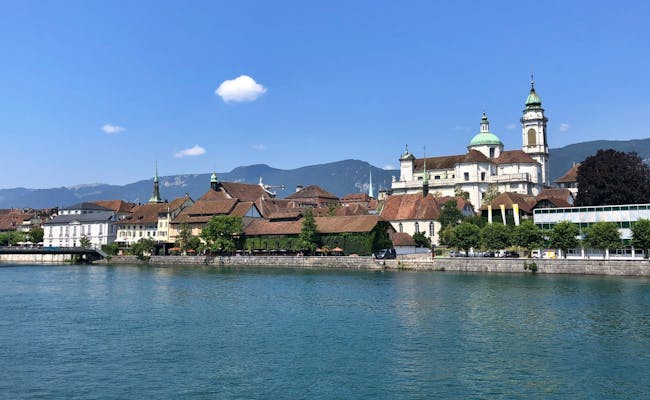
From there, heading back to Solothurn will take 15 minutes by train. Back in Solothurn, grab your bags and hop on another train that will take you to Basel within just an hour.
- Day 8: Basel - Geneva
Basel is a vibrant city right on the German and French border. It offers several walking tours at various times throughout the week. Pick a tour or just head out into the city on your own.
Alternatively, you can always hop across the border and visit Weil am Rhein in Germany or St. Louis in France. Technically, you could even visit three countries in one day: Switzerland, Germany and France. That’s completely doable in Basel and might be something you don’t get to experience every day. Especially if you’re from a country that requires you to get on a plane to cross the nearest border within a reasonable amount of time.
Whenever you’re ready to leave Basel, head back to Geneva and spend the rest of the day exploring Switzerland’s second largest city.

- Additional tips and information for itinerary 10
- Upon check-in at your accommodation in Montreux, Interlaken and Basel, you’ll receive a Transport Card that lets you use local transport for free.
- When in Altreu, look out for pooping (excuse the expression) storks. They usually don't hold back and you wouldn't be the first person to get splashed with, well... you know what, when disembarking.
And this concludes our collection of eight-day itineraries for Switzerland. We hope you’ve been able to find the Switzerland itinerary to your taste. Have fun planning your trip.
Table of contents
Discover leisure activities, top destinations.
- Lauterbrunnen
Top Activities
Top attractions.
- Harder Kulm
- Jungfraujoch
- First Cliff Walk
- Museum of Transport
- Lake Lucerne
- Eiger Glacier
- Schynige Plate
- Lake Geneva
- Glacier Gorge Grindelwald
- St. Beatus Caves
Check in Price
Travel Economics for Expats and Travelers
Geneva or Zurich? Which is the best city to visit?
Geneva or zurich, which is the best city to visit this guide will provide insights on the nightlife, sightseeing, cost of travel and other aspects of visiting these two swiss cities..
Travelling to Switzerland soon but can’t decide which city you want to visit? A choice that a lot of people are faced with is whether to visit Geneva or Zurich. The two biggest cities in this landlocked Alpine country have a lot to offer tourists, and both boast beautiful Old Towns and lakeside locations. But is Geneva or Zurich better?
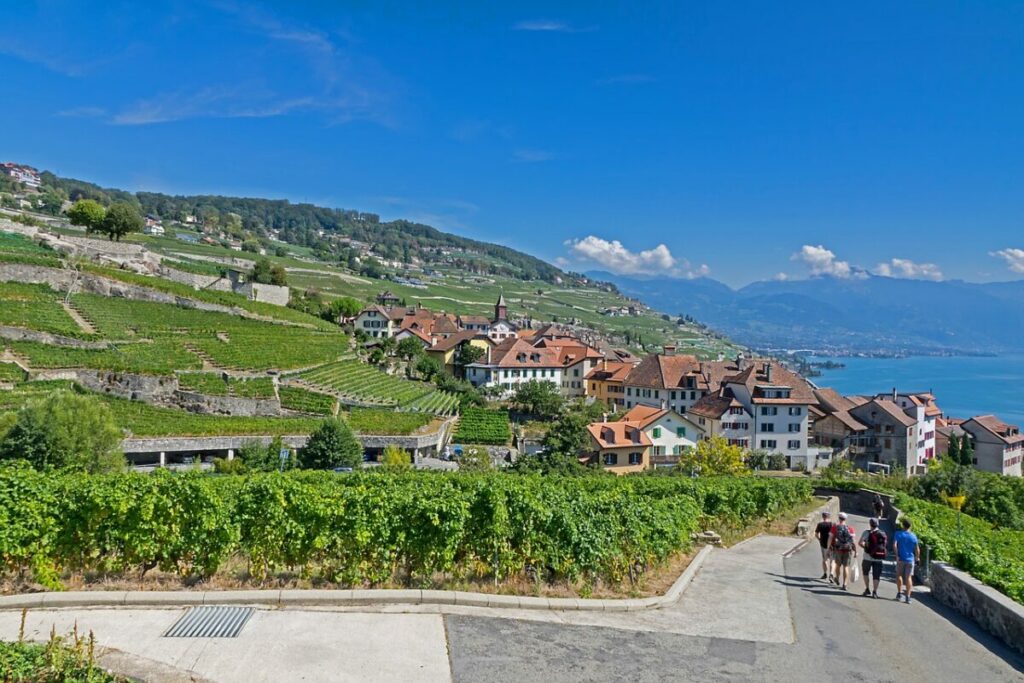
If you’ve already travelled to both, you probably already have a clear idea of which you prefer. But how can a first-time traveller decide between Geneva and Zurich? It would be great to visit both, but most people won’t have the budget or time for that. This article will focus on important holiday aspects of both cities so you can make an informed decision on which is the best city out of Geneva and Zurich.
Overview of Geneva
Surrounded by the Alps and on the southern shore of one of Europe’s largest freshwater lakes, Geneva is certainly picturesque. You can even see Europe’s highest mountain, Mont Blanc from here. Although French is the first language here, it’s a truly global hub with over 190 language spoken in total. The Red Cross and European UN have their headquarters in Geneva.
Overview of Zurich
German speaking Zurich is the largest city in Switzerland. It’s also a world capital when it comes to finance and banking. It’s currently ranked as the city with the best quality of life in the world. Zurich has Alpine views, just like Geneva. As well as being famed for banking and finance, it’s one of Switzlerand’s cultural hubs. There are over 50 museums and 100 art galleries in town.
Geneva vs Zurich: Nightlife
Zurich has plenty of choice when it comes to nightlife, with the bulk of it being located along the Niederdorf . As well as underground bars and clubs, there’s a thriving techno scene too. Geneva is quieter and although there is nightlife on offer too, it’s expensive and many people prefer nearby Lausanne. Because Niederdorf offers some fun and vibrant places to party, Zurich wins.
Verdict: Zurich
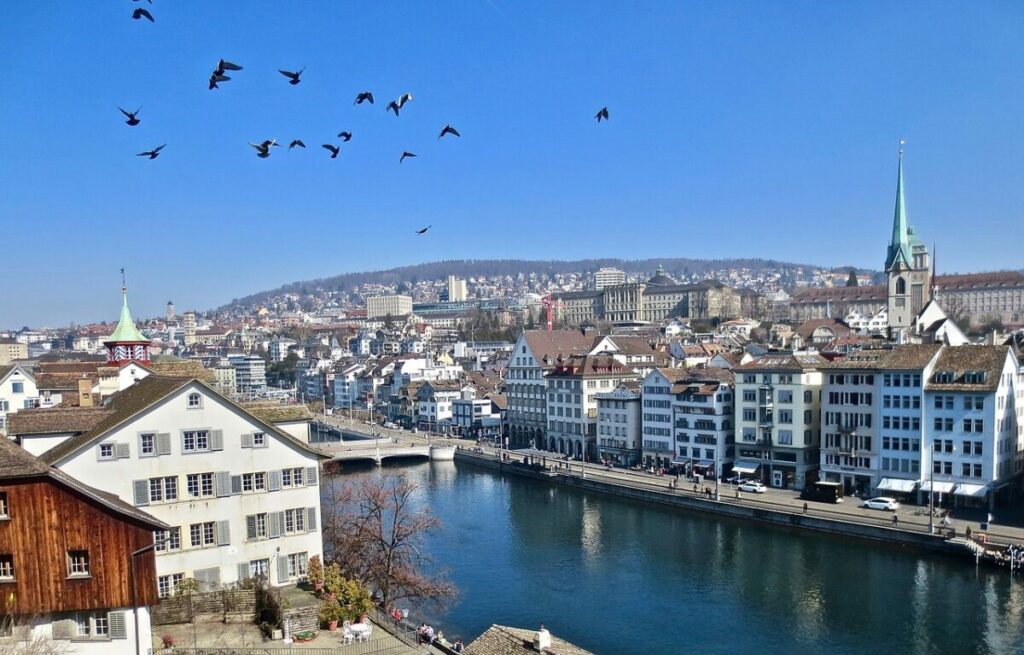
Geneva vs Zurich: Sightseeing
Zurich has some of the best museums and galleries in Switzerland and you shouldn’t miss the Landesmuseum . It has several important art collections. Bahnhofstrasse is a great place to walk through and take in the expensive designer shops.
There are lots of day trips close to Zurich too, including Uetliberg and Mount Titliss. Geneva offers some grand and imposing attractions, like the Jet d’Eau fountain and the Broken Chair. There are more unique museums here including the Red Cross and Red Crescent Museums too. Day trips include the Mont-Saleve Cable Car . It’s a tough pick, but Geneva edges it!
Verdict: Geneva
Geneva vs zurich: old town.
Geneva’s Old Town has lots of character and an intriguing history. There are plenty museums, shopping, and of course, cafes for peoplewatching. Don’t miss the old Roman marketplace right in the centre Bourg-de-Four square. Zurich’s Old Town is also worth a trip – Lindenhof Hill is a public park within the city walls listed as a Swiss Heritage site. There are several historic buildings including the 14 th century Brunnenturm. It’s a draw!
Verdict: Draw
Geneva vs zurich: cost of travel.
Geneva and Zurich are two of the world’s most expensive cities , so this is like choosing between a Lamborghini and a Ferrari. The reality is if you can afford to travel well in either city, you probably won’t notice a difference. Geneva is slightly cheaper than the European banking capital, so unless you’re opening an account, Geneva is the winner.
Geneva vs Zurich: Food and Restaurants
Both cities offer plenty of opportunities to try traditional Swiss food like fondues. In Zurich, the best local cuisine is on Niederdorf and in the Old Town, hidden away in quaint alleys. Thanks to Geneva’s international influence you can eat pretty much anything here. So, once you’re sick of raclette, fondue, and schnitzel, you’ll easily find an international alternative. Geneva wins!
Geneva vs Zurich: Transportation
Zurich has a network of trams, buses, and local trains which is free with a Swiss Travel Pass. You can get a Zurich Card which means free travel inside the city walls too. Geneva’s public transport system is called UNIRESO and it’s also free to use with a Geneva Transport card. Zurich wins as it covers a larger area.
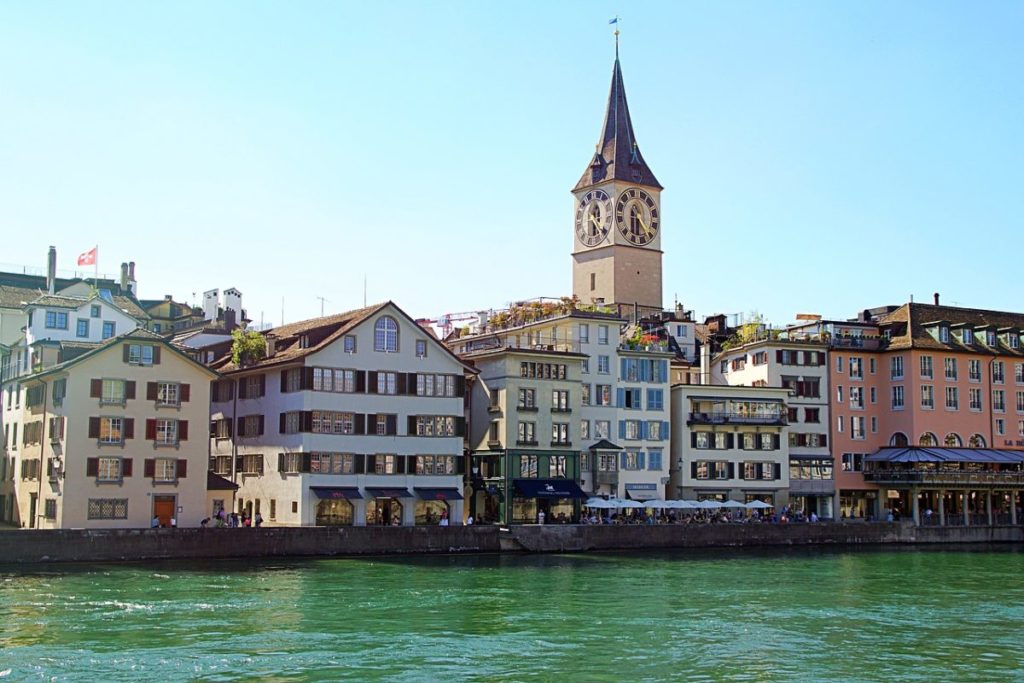
Geneva or Zurich: Weather
Both cities have mild weather. Winters are relatively cold and don’t get much sun, whereas summers are hot and sunny. Geneva is drier than Zurich, which is a little more humid. Geneva wins as it has perfect conditions for winter sports at the nearby ski resorts.
Geneva or Zurich: Verdict
Verdict: With a score of 4-2 and one draw, Geneva is the winner! However, both cities are great places to visit and offer plenty to see and do.
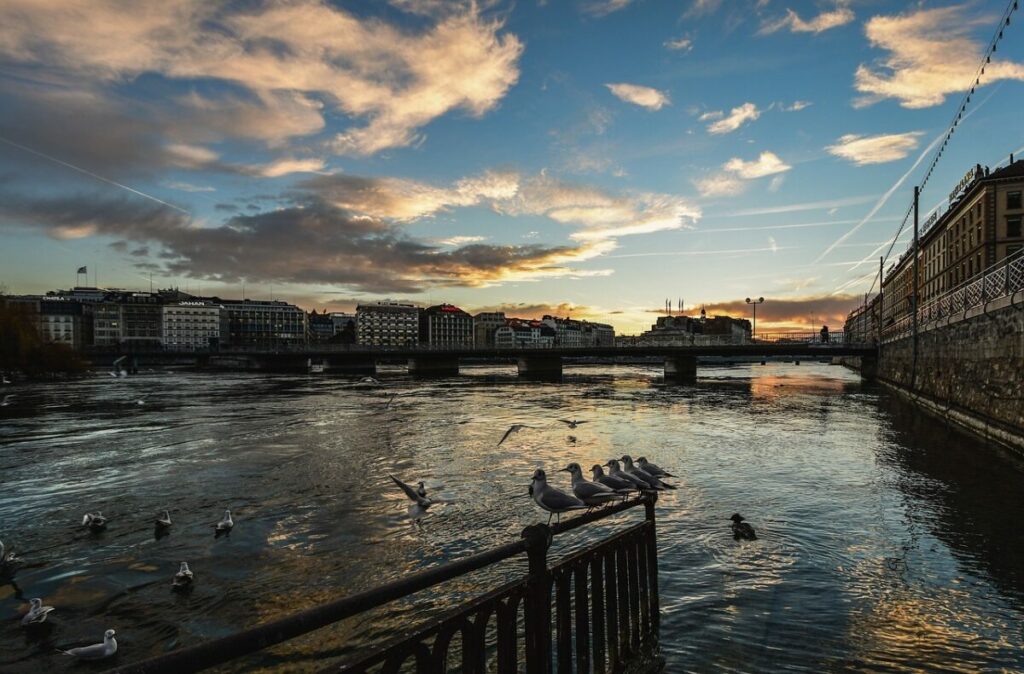
Hotels in Zurich
Hotel Arlette Beim Hauptbahnhof – This hotel is even closer to the main railway station. You will be in the very heart of Zurich meters away from the Limmat river.
Sorell Hotel Rütli – A great accommodation option, located at a walking distance to the ETH University. This mid-sized property is ideal to enjoy all the aspects of the old town without worrying about transportation.
Hotels in Geneva
Hotel Les Arcades – A great choice in one of the best places to stay in Geneva. Good breakfast and quite close to the Cointrin train station.
Hotel International & Terminus – Another great option to stay in the center of Geneva, with easy access to public transport.
Other resources for travelling in Geneva and Zurich
If you traveling in Switzerland you might want to check some of our other guides to this small and alpine European country. Check the best places to stay in Zurich and our guide to where to stay in Geneva.
For those considering to focus your visit on Zurichh you might want to check our post on the cost of living in Zurich , and the how to get from Zurich to Liechtenstein .
Already in Zurich or Geneva? Leave your thoughts and questions in the comment box below.

Best City to Visit in Switzerland: Geneva, Zurich or Bern
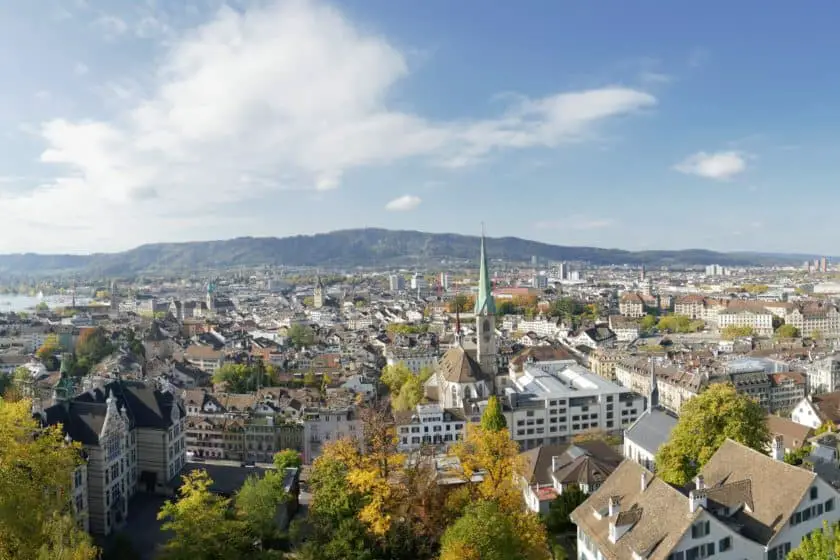
If you are trying to decide what is the best city to visit in Switzerland, you are probably considering Geneva , Zurich , and Bern . These three cities are three of the four largest cities in the country. Each one offers incredible sights and quite different cultures. If you are trying to decide what is the best city to visit in Switzerland, here is the ultimate guide to help you decide which city to visit.
Table of Contents
Geneva or Zurich or Bern Overview
Geneva is the 2 nd largest city in Switzerland with just over 200,000 residents. Most of Switzerland speaks German but since Geneva is so close to France, most of the locals speak French as their main language.
Geneva is often referred to as the “Peace Capital” of the world because it hosts the most international organizations in the world. The United Nations and the Red Cross both have headquarters here. Being the 7 th most expensive city in the world, you have to remember that Switzerland as a whole is an expensive place to visit.
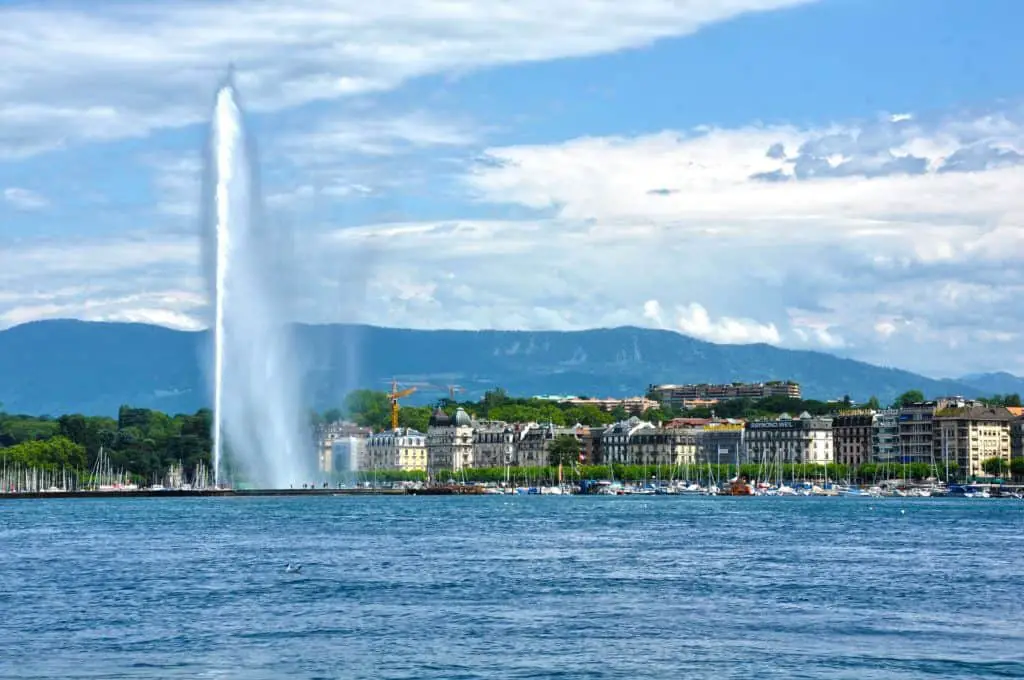
Zurich is the largest city in Switzerland with 435,000 residents. The city has been around since 15 BC when the Romans founded it. The main language spoken here is German but most of the locals speak multiple languages including French, Italian, and English.
In recent years, Zurich has been ranked as having the highest quality of living in the world. They have also been ranked as the happiest people in the world, in years passed. Zurich is one of the world’s largest centers for finance. Every August, Zurich hosts the Street Parade which is Europe’s largest techno parade and one incredible party.
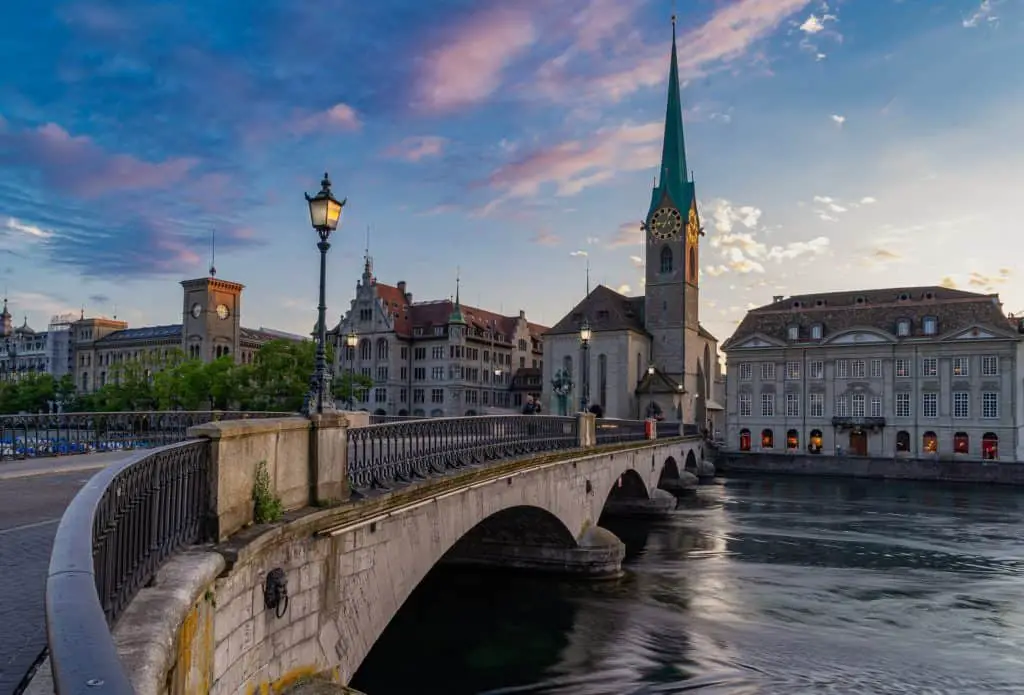
Bern is considered the capital of Switzerland even though there is no official capital city. It is the 5 th largest city in the country with 140,000 residents. The historic Old Town of Bern was declared a UNESCO World Heritage Site . Bern is 542 meters above sea level making the 3 rd highest capital city in Europe.
The Aare River winds its way through the city, adding to the beautiful landscape that the city was built on. Bern is known as the “City of Fountains” because of the vast amount of fountains scattered throughout the city. Einstein also used to call Bern home.
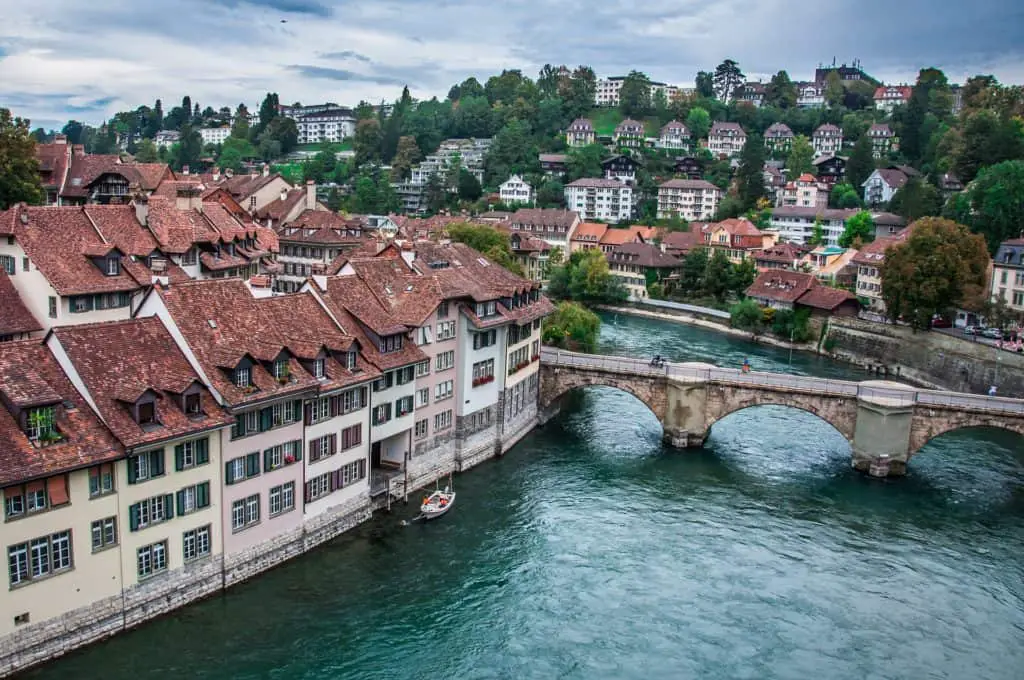
Places to See
The Geneva Fountain is one of the most iconic landmarks in Geneva.

The United Nations Palace is the second largest of the 4 major official offices of the United Nations. It is only smaller than the headquarters in New York City.

The University of Geneva was founded in 1559 and founded by John Calvin.

St. Pierre Cathedral was originally a Roman Catholic Cathedral. It became the Reformed Protestant Church of Geneva during the Reformation.

Lake Zurich is a large lake that has the city sitting on its northern banks.

Grossmünster is a Protestant church that was built in 1100.

Bahnhofstrasse is the main street in Zurich. It is one of the world’s most expensive shopping avenues in the world.

Altstadt is the Old Town of Zurich.

The Zurich Opera House has been open since 1891. It was the first theater in Europe with electrical lighting.

The Old Town of Bern has the river winding around it making it quite beautiful.

Zytglogge is a medieval tower built in the 13th century.

The Bern Cathedral is a Gothic-style cathedral in the center of the city. Construction started in 1421 but was not completed until 1893.

Bundeshaus , or The Federal Palace, is a massive palace that is home to the Federal Assembly and Federal Council.

The Rosengarten is a park across the river from the Old Town that has panoramic views of the city.

Getting Around
The center of Geneva is very pedestrian-friendly. Some of the most popular attractions, like the United Nations Palace or the Pâquis Baths, might require you to use public transportation. The main form of public transportation in Geneva is the network of trams or buses. Though there are buses that run in the city, they might take you longer to reach your destination.
The network of trams seems to be the most efficient way to get around the city on the outskirts of the city. One of the unique things about Geneva is if you are staying in a hotel, hostel, or campsite, you are typically given a Geneva Transport Card. The Geneva Transport Card gives you free, unlimited access to public transportation in Zone 10 which is the greater part of Geneva.
Most of the major sights in the city are able to be seen on foot. The furthest the major attractions get from each other is less than 2km which can easily be walked if took your time. If you want to see some of the attractions outside of the city center, like the Zurich Zoo or Le Corbusier House, you will want to use public transportation. If you buy the Zurich Card you will have access to all public transportation, free exhibitions, and you can get special treatment at certain restaurants.
The Old Town in Bern is not very big so you can easily explore it on foot. If you book any accommodation within the city of Bern, you will automatically have access to the Bern Ticket . The Bern Ticket gives you free access to the public transportation network in Bern. Once you check into the place you are staying you have to open the Bern App and use your booking confirmation number to get your Bern Ticket. You can also use the bike-sharing system and E-bike sharing.
Though Geneva is not typically known as a city to party, there is still a pretty lively nightlife here. The old town has many bars and pubs. Old Town is considered to be a little more laid back but there are a few places where you can hit the dance floor. If you want to go to the bigger nightclubs in Geneva, you will have to go outside of the center of the city. Some of the biggest and most popular nightclubs in Geneva are Le Zoo , Motel Campo , and Bypass .
The nightlife in Zurich is one of the best in Europe which seems to surprise people. Zurich has more bars per capita than anywhere else in Europe . Niederdorf in the old town and Zurich West are the best places to find nightlife in Zurich. With a vast number of bars, there is also a ton of nightclubs you can choose from.
Langstrasse is a street that is sometimes regarded as Zurich’s red-light district. Frieda’s Büxe , Hive , Supermarket , and Space Monki are some of the best clubs in the city but most of the clubs here are a good time regardless of the one you choose. Since you’re in Switzerland, you can expect prices to be rather high during your night out.
Bern is not known for its nightlife. There are quite a few bars you could choose from in the center of the city. There are dozens of bars in the Old Town that you can go bar hopping to. If you want a night out, you can still have a good time in Bern but don’t expect it to be as crazy as Zurich.
Chamonix is only an hour away from Geneva by train making it the perfect day trip. It sits at the base of Mont Blanc, the highest summit in the Alps.

Annecy is only 42km south of Geneva. Annecy is known for its Old Town which has beautiful buildings and cobbled streets.

Lausanne is only a 40-minute train ride from Geneva. The city is known for having beautiful vistas and medieval architecture.

Jungfraujoch is part of the Bernese Alps that connects the peak of Jungfrau and Monch. The Sphinx Observatory, one of the world’s highest observatories, is located here.

Lucerne is one of the most visited cities in Switzerland. It sits on the banks of Lake Lucerne.

Liechtenstein is a small country to the east of Switzerland. It is one of the smallest countries in the world.

Chateau de Chillon is a castle located on a small island in the eastern part of Lake Geneva.

Interlaken is a popular tourist destination because it is considered to be the gateway to the Swiss Alps.

Lauterbrunnen is one of the most picturesque villages in all of Europe. It is one of the main tourist destinations in Switzerland.

Lucerne sits between Zurich and Bern so it could be a great home base in Switzerland or a great trip to make if you decide to visit Bern or Zurich .
Geneva, Zurich, and Bern are three of the four largest cities in Switzerland. All three cities offer very unique experiences compared to each other. Geneva is home to some of the world’s largest international organizations, is mainly influenced by the French, and has a beautiful setting on Lake Geneva. Zurich is the largest city in Switzerland, is one of the most expensive cities in the world, and has the best nightlife in Switzerland. Bern is the unofficial capital of the country and is quite laid back compared to Geneva or Zurich.
If you are trying to decide what is the best city to visit in Switzerland, all three cities will impress you. Ultimately, you need to decide which aspects of a city intrigue you the most in order to make the choice best for you.
Recent Posts
Dublin or Belfast: Which City to Visit
Should I Visit Dublin or Belfast? Dublin and Belfast are the two largest cities on the island of Ireland and two of the most visited cities in the British Isles. Dublin is the capital city of...
Galway or Limerick: Which City to Visit
Galway and Limerick are the two largest cities in West-Central Ireland which always sparks the debate of which one is better to visit. Here is the ultimate guide to help you decide whether to visit...
- Travel Planning Guide
A Travel Price Comparison for Switzerland Zurich vs. Geneva for Old Town, Attractions, Food, and Nightlife

- Pros & Cons
- Attractions
- Backpackers
- Public Transit
- Walkability
- More time in Zurich or Geneva?
- Which is Cheaper, Zurich or Geneva? (Travel Cost Comparison)
Which is Bigger, Zurich or Geneva?
- When to Visit Zurich or Geneva?
Should you visit Zurich or Geneva?
Which is cheaper to visit which is more expensive for vacation.
Which city should you visit? Read on to compare the activities as well as the prices of travel for Zurich and Geneva. We'll break down costs for accommodation, food, transportation and more to help you learn more about these two destinations. Then, you can figure out if either of these two places are accessible based on your travel budget, schedule, and interests. So, let's dig into it.
Zurich is a liberal, beautiful, and historic city. This is also a very beautiful destination which attracts plenty of visitors. It's also known for live music, food, and shopping.
Geneva is a diverse, international, and professional city. Travelers will also find plenty of sights and attractions here, as it's a big city that attracts lots of visitors. It's a beautiful place to visit, too. And you can't forget about the nightlife, food, and shopping.
Zurich and Geneva: Pros and Cons
- Popular museums and historical sights
- Active nightlife
- Good music scene
- Scenic old town
- Family-friendly
- Good for couples and romance
- Good for backpackers and budget travelers
- Impressive beauty
- Big city activities
- Less popular old town
- Less popular with backpackers
Is there more to do in Zurich or Geneva?
Visitors will generally find more to do in Geneva than Zurich. While Zurich is larger than Geneva, Geneva has more sights, attractions, and activities for tourists. Geneva is very popular for its big city activities, while Zurich attracts visitors for its nightlife, music, historical sights, and impressive beauty. Zurich is more touristy than Geneva and is known for its beautiful setting on Lake Zurich as well as its cafes, restaurants, and high prices. Geneva is famous for its role as a global hub for the United Nations, the Red Cross, and the World Health Organization. It is also well known for The Geneva Water Fountain (The Jet d'Eau).
How is Zurich different from Geneva?
Which is better for a holiday.
Let's take a look at the differences and similarities between Geneva and Zurich. Then, you can decide for yourself which place is better for your next trip.
Are the Museums and Historical Sights Better in Zurich or Geneva?
Plenty of people visit the excellent sights and museums in both Zurich and Geneva.
Visitors can fill many days exploring the museums and attractions around Zurich. Make sure you check out the Museum of Fine Arts, the Fraumünster, as well as the Swiss National Museum.
Geneva offers many unique museums, sights, and landmarks that will make for a memorable trip. Famous sights and landmarks include the spectacular Water Jet, St Pierre Cathedral, and the Palais des Nations. There are also impressive art and history museums in the city.
Is the Food Better in Zurich or Geneva? Which Destination has the Best Restaurants?
Both Zurich and Geneva offer a number of excellent restaurants to choose from.
Eating is part of the travel experience when you visit Zurich. Many restaurants have a strong German influence, but you'll also find traditional Swiss dishes such as cheese and chocolate fondue. There are also several Michelin star restaurants in town.
Geneva has a number of nationally recognized food spots and restaurants. The city has an amazing mix of traditional Swiss restaurants as well as diverse ethnic options. Traditional dishes include fondue and raclette, both of which involve the decadent Swiss cheese.
Is Zurich or Geneva Better for Nightlife?
Zurich is a great destination for nightlife. Also, Geneva is still popular, but not quite as popular for nightlife and partying.
The people in Zurich know how to have a good time. The city has some of the best nightlife in Switzerland. There are a high concentration of bars and clubs around town, or you could check out one of the badis, which are pools that also act as bars during the summer months. They're usually located by the lake.
If you're looking for night time activities Geneva has a few options to choose from. During the day the city is all business, but at night the professionals, interns, students, and NGO workers all come together to enjoy a drink at a bar or dance at one of the city's diverse clubs.
Is Zurich or Geneva Better for Music?
Zurich is a great destination for live music. However, Geneva is not a live music destination.
Zurich has become a hotbed of musicians and artists. There are many nightclubs that offer a variety of music types including electronic music, rock, and even reggae.
Geneva is not a live music destination.
Is Zurich or Geneva Better for its Old Town?
Zurich is an unbeatable place for its historic old town. Also, Geneva is still popular, but not quite as popular for its old town.
With a famous historical old-town, Zurich offers plenty to see. The city has an old town that is split into two parts on each side of the Limmat River. The historic districts are filled with churches, squares, and charming areas that are fun to explore. Walking tours are the best way to explore the old town.
Plenty of visitors enjoy exploring the old town in Geneva. The Old Town offers a number of charming streets where you can wander as well as historical buildings including St. Pierre Cathedral.
Is the Shopping Better in Zurich or Geneva?
Both Zurich and Geneva are terrific shopping destinations.
The abundance of shops in Zurich make it a world-class shopping destination. Visitors often buy chocolate, watches, and jewelry in this city. You'll find brand names and luxury items that are of high quality. Each neighborhood has its own character with stores ranging from traditional to international.
Many people travel to Geneva specifically to go shopping. Famous for its posh shops and luxury brands, this city is a popular shopping destination. From chic boutiques to deluxe toy stores, you'll find something for everyone. In particular, the city is known for its Swiss watches, Swiss Army knives, chocolate, and wine.
Is Zurich or Geneva Better for Families?
Zurich is a great destination for its family-friendly activities. Also, Geneva is still popular, but not quite as popular for its kid-friendly activities.
Zurich is a very family-friendly place to visit. It's a surprisingly mellow city with a relaxing vibe that makes it easy to explore with kids. Popular family-friendly activities include swimming in the Limmat River, sailing on Lake Zurich, and visiting Josefwiese park, which has a large playground.
Geneva offers lots of family activities. This diverse city has a number of chocolate shops, toy stores, and parks where kids can play. They'll be impressed by the Water Jet and there are few places where you can swim in the lake when the weather is warm.
Is Zurich or Geneva Better for Couples?
Zurich is a great destination for romance. Also, Geneva is still popular, but not quite as popular for its romantic activities.
Couples visit Zurich frequently as it offers plenty of romantic activities. One of the most romantic experiences you can have in town is visiting the Zurich Thermal Baths and Spa. There's an outdoor rooftop thermal pool as well as many ways that you can pamper yourselves.
Geneva makes for a fun place to visit for a couple. Wandering Old Town, sampling Swiss chocolate, and enjoying one of the many ethnic restaurants around town all make for great date activities. Fondue in a traditional restaurant is also a not to be missed experience.
Is Zurich or Geneva Better for Backpackers and Budget Travelers?
Zurich is a good destination for backpackers. However, Geneva is a city with minimal options for backpackers and budget travelers.
Plenty of backpackers visit Zurich . The city has a number of hostels to choose from, but, like most of Switzerland, the city is expensive in general.
Geneva is a challenging destination for budget travelers and backpackers due to the higher prices. The city is often overlooked by backpackers as it is pretty expensive. Many hotels cater to the business traveler crowd, but there are a few hostels to choose from.
Is Zurich or Geneva Better for Students?
Zurich is an unbeatable place for students. Also, Geneva is still popular, but not quite as popular for its student-friendly activities.
Zurich is a very popular place to visit for students. The city offers a number of unique experiences for international students. The academics are good and the university campuses are nice.
Geneva is a very popular city for students and younger travelers. The University of Geneva attracts many international students and the city is quite diverse. It feels like a mixing bowl of cultures, so students will feel very welcomed and comfortable here.
Is Zurich or Geneva Better for Public Transit? Which Is Easier to Get Around Without a Car?
Geneva is a must-visit destination for its public transit. Also, Zurich is not as famous, but is still a good city to visit for times when you don't have a car.
Geneva has a world-class public transit network to take passengers everywhere in the city. The very comprehensive system includes trams, buses, and boats.
The public transit in Zurich can get you to most places easily. The system is made up of streetcars and buses.
Is Zurich or Geneva a more walkable city?
Zurich and Geneva both are excellent when exploring on foot.
Zurich is a very walkable city. There are paths that lead along the rivers and the lake connecting the old town areas to other parts of the city.
Geneva is a very walkable destination. Most areas where visitors spend their time can be easily explored on foot.
For even more information, also check out Is Zurich Worth Visiting? and Is Geneva Worth Visiting? .
Should I spend more time in Geneva or Zurich?
How long in zurich or geneva.
Visitors can find plenty of fun things to do in both Zurich and Geneva. With generally more activities and things to do, visitors tend to spend more time in Zurich than in Geneva . Usually, 2-5 days is a good amount of time for Zurich, and 1-3 days is enough time in Geneva.
Families should spend more time in Zurich than Geneva. Because of the many family-friendly attractions and fun things to do for kids in Zurich, it's a great place to visit with the whole family.
Couples should spend more time in Zurich than Geneva. You'll find plenty of romantic sights and fun activities in Zurich that are great for a weekend getaway or a longer couple's trip.
Backpackers and budget travelers should spend more time in Zurich than Geneva if your budget allows for it. With a larger number of budget-friendly sights, good nightlife, and active things to do, anyone traveling on a budget would have a good time in Zurich.
- How many days in Zurich or Geneva? Ideal Length of Stay Zurich 2-5 Geneva 1-3
One day in Zurich or Geneva?
Many travelers enjoy the food and shopping when visiting the destination of Zurich. The old town is one of the main draws for visitors. But since there are so many activities, you'll likely want to spend more than one day exploring.
Geneva is a bustling city that offers something for everyone. One day is often enough time to do most activities.
A weekend in Zurich or Geneva?
Zurich is a great place to explore. It is common to spend a weekend here. Don't miss the shopping, as that's what most people do. With all of its activities, you can easily fill a weekend here. Your budget might influence how long you stay.
Geneva is a great place to explore. It is common to spend a weekend here. Don't miss the shopping, as that's what most people do. With all of its activities, you can easily fill a weekend here. Your budget might influence how long you stay.
Five days in Zurich or Geneva?
It's hard to know how much time to spend in Zurich. Don't miss the shopping, as that's what most people do. For many, it makes a great getaway for five days. Make sure you visit the old town while you're here. With all of its activities, you can easily fill five days here. It has many unique tourist attractions and fascinating things to do.
It's hard to know how much time to spend in Geneva. Don't miss the shopping, as that's what most people do. Five days may feel like too much time unless you plan to do a lot of relaxing. It has many unique tourist attractions and fascinating things to do.
A week in Zurich or Geneva?
Travelers enjoy the nightlife and live music when visiting the beautiful destination of Zurich. This city offers a variety of activities to choose from. Most visitors spend time around the old town while in the area. Most people find that one week is more than enough time to see everything.
Travelers enjoy the shopping and museums when visiting the professional big city of Geneva. This city offers a variety of activities to choose from. Most people find that one week is more than enough time to see everything.
For some great organized tour ideas, see The Best Sightseeing Tours in Switzerland , The Best Romantic Tours for Couples in Switzerland , The Best Luxury Tours to Switzerland , and The Best Tours for Seniors to Switzerland .
Which place is cheaper, Geneva or Zurich?
These are the overall average travel costs for the two destinations.
- Zurich Prices Switzerland Prices Geneva Prices Switzerland Prices
- Average Daily Cost Per person, per day Zurich $ 275 Geneva $ 215
The average daily cost (per person) in Zurich is $275, while the average daily cost in Geneva is $215. These costs include accommodation (assuming double occupancy, so the traveler is sharing the room), food, transportation, and entertainment. While every person is different, these costs are an average of past travelers in each destination. What follows is a categorical breakdown of travel costs for Zurich and Geneva in more detail.
Accommodation
- Accommodation Hotel or hostel for one person Zurich $ 174 Geneva $ 148
- Accommodation Typical double-occupancy room Zurich $ 348 Geneva $ 296
Compare Hotels in Zurich and Geneva
Looking for a hotel in Zurich or Geneva? Prices vary by location, date, season, and the level of luxury. See below for options and compare which is best for your budget and travel style.
Hotels in Zurich
Hotels in Geneva
Kayak helps you find the best prices for hotels, flights, and rental cars for destinations around the world. Compare prices for multiple destinations when planning your next trip.
Local Transportation
- Local Transportation Taxis, local buses, subway, etc. Zurich $ 37 Geneva $ 9.61
Typical Local Transportation Prices in Zurich
Below are a few samples from actual travelers for transportation costs in Zurich:
- City Pass (2) $ 29
Hired Cars and Shuttles in Zurich
Some specific examples of transportation prices in Zurich:
- Airport Zurich Transfer Mercedes S Class 3pax: $185
- Arrival Private Transfer from Zurich Airport ZRH to Zurich City by Luxury Van: $138
- Arrival Transfer: Zurich Airport ZRH to Zurich in Luxury Van: $96
- Arrival Transfer from Zurich Airport ZRH to Zurich City in Private Car/Van: $95
- Departure Private Transfer from Zurich to Zurich Airport ZRH by Luxury Van: $138
- Departure Transfer from Zurich City to Zurich Airport ZRH in Private Car/Van: $95
- From Zurich Airport: 1-Way Private Transfer To Zurich Hotel: $81
- ONE WAY: Zurich Airport (ZRH) to / from Zurich Private Transfer: $84
- Privat Airport Transfer to Lucerne - new Mercedes V Class: $448
- Privat Transfer Lucerne to Zurich Airport: $401
- Private Arrival Transfer: from Zurich Airport to Lucerne : $281
- Private Arrival Transfer: from Zurich Airport to Winterthur: $222
Hired Cars and Shuttles in Geneva
Some specific examples of transportation prices in Geneva:
- Geneva Int Airport (GVA) to La Clusaz - Arrival Private Transfer: $49
- Geneva Airport (GVA) to Lausanne - Arrival Private Transfer: $54
- Geneva to Geneva Airport (GVA)- Departure Private Transfer: $55
- Arrival Transfer from Geneva Airport GVA to Geneva by Sedan: $73
- VIP Transfer: $73
- Geneva Airport GVA to Val d'Isere Espace Killy Arrival Transfer: $76
- Private Transfer from Geneva Hotels to Geneva Airport: $86
- Private Transfer from Geneva Airport to Geneva Hotels : $86
- Geneva Passenger Transfer to Chamonix Mont Blanc: $87
- Geneva Airport Transfers : Geneva Airport GVA to Geneva City in Business Car: $87
- Geneva Departure Private Transfers from Geneva City to Geneva Airport GVA: $88
- Geneva Arrival Private Transfers from Geneva Airport GVA to Geneva City: $88
Is it cheaper to fly into Zurich or Geneva?
Prices for flights to both Geneva and Zurich change regularly based on dates and travel demand. We suggest you find the best prices for your next trip on Kayak, because you can compare the cost of flights across multiple airlines for your prefered dates.
- Food Meals for one day Zurich $ 63 Geneva $ 54
Typical Food Prices in Zurich
Some typical examples of dining costs in Zurich are as follows:
- Breakfast for 2 $ 14
Food Tours and Cooking Classes in Zurich
Also, here are some specific examples of food and dining related activities in Zurich.
- Zürich Food Tour: $101
- Culinary Tour from Zurich with Traditional Swiss Cheese Fondue Dinner: $166
Food Tours and Cooking Classes in Geneva
Also, here are some specific examples of food and dining related activities in Geneva.
- Geneva City Tour with Cooking Class: $149
Entertainment
- Entertainment Entrance tickets, shows, etc. Zurich $ 37 Geneva $ 31
Tours and Activities in Zurich
Some specific costs of activities, tours, and entrance tickets for Zurich are as follows:
- Winterthur Scavenger Hunt and Sights Self-Guided Tour: $16
- Zurich Altstadt 2 Scavenger Hunt and Sights Self-Guided Tour: $16
- Zurich Highlights Self guided scavenger hunt and city tour: $16
- (STTZ01) - Zurich Open Top Bus Sightseeing Tour : $25
- Zurich Old Town Walking Tour: $30
- City e-bike tour: $30
- FIFA Museum Tickets: $30
- Zurich City Tour with Audio Commentary: $40
- Christmas Walking Tour in Zürich: Exploring Holiday Charm: $46
- Morning group tour to Rhine falls : $51
- Zurich Highlights City Tour with Lake Cruise: $52
- Chocolarium and Appenzeller Schaukäserei Tour: $60
Tours and Activities in Geneva
Here are a few actual costs in Geneva for available activities, ticket prices, and tours:
- From Brunswick Monument to the Botanical Garden: A Self-Guided Audio Tour: $6.99
- Highlights of Dark History Quest Experience: $7.07
- A Self-Guided Audio Tour of Geneva’s Old Town: $9.99
- Self-Guided Audio Tour to the Many Faces of Geneva: $11
- Geneva (International District) City Sights Self-Guided Tour: $16
- Audioguided sightseeing cruise of Geneva: $22
- (STTG03)Geneva International Quarter & Lakeside Sightseeing Tour: $30
- (STTG04) - Sightseeing Cruise at Geneva with Wine and Aperitif: $33
- Private Tour to Discover Geneva by Tasting its Chocolates: $56
- The Highlights Tour in a TaxiBike: Geneva : $62
- Best of Geneva City Tour with optional boat cruise: $66
- Geneva Highlights 2-Hour Introductory Tour: $66
- Alcohol Drinks for one day Zurich $ 30 Geneva $ 23
Sample the Local Flavors in Zurich
Also in Zurich, these are the prices for nightlife and alcohol related activities from various tour providers:
- Informative wine tasting with Italian appetizers in the secure wine cellar: $161
Sample the Local Flavors in Geneva
Some specific costs for nightlife related activities in Geneva:
- Geneva Wine Tasting Tour: $178
When we compare the travel costs of actual travelers between Zurich and Geneva, we can see that Zurich is more expensive. And not only is Geneva much less expensive, but it is actually a significantly cheaper destination. So, traveling to Geneva would let you spend less money overall. Or, you could decide to spend more money in Geneva and be able to afford a more luxurious travel style by staying in nicer hotels, eating at more expensive restaurants, taking tours, and experiencing more activities. The same level of travel in Zurich would naturally cost you much more money, so you would probably want to keep your budget a little tighter in Zurich than you might in Geneva.
If you're trying to decide if either of these two destinations are within your price range, also see Is Zurich Expensive? and Is Geneva Expensive? .
Zurich has a larger population, and is about 86% larger than the population of Geneva. When comparing the sizes of Zurich and Geneva, keep in mind that a larger population does not always imply the destination has more attractions or better activities. So, always research the type of place that you want to visit along with the activities and attractions that interest you.
When is the best time to visit Zurich or Geneva?
Both destinations experience a temperate climate with four distinct seasons. And since both cities are in the northern hemisphere, summer is in July and winter is in January.
Should I visit Zurich or Geneva in the Summer?
The summer attracts plenty of travelers to both Zurich and Geneva. The summer months attract visitors to Zurich because of the music scene and the family-friendly experiences. Furthermore, the city activities and the family-friendly experiences are the main draw to Geneva this time of year.
In July, Zurich is generally around the same temperature as Geneva. Daily temperatures in Zurich average around 21°C (70°F), and Geneva fluctuates around 22°C (71°F).
People are often attracted to the plentiful sunshine in Geneva this time of the year. In Zurich, it's very sunny this time of the year. Zurich usually receives less sunshine than Geneva during summer. Zurich gets 241 hours of sunny skies, while Geneva receives 285 hours of full sun in the summer.
In July, Zurich usually receives more rain than Geneva. Zurich gets 89 mm (3.5 in) of rain, while Geneva receives 61 mm (2.4 in) of rain each month for the summer.
- Summer Average Temperatures July Zurich 21°C (70°F) Geneva 22°C (71°F)
Should I visit Zurich or Geneva in the Autumn?
The autumn brings many poeple to Zurich as well as Geneva. The shopping scene, the music scene, and the natural beauty of the area are the main draw to Zurich this time of year. Additionally, many travelers come to Geneva for the city's sights and attractions, the shopping scene, and the natural beauty of the area.
Zurich is around the same temperature as Geneva in the autumn. The daily temperature in Zurich averages around 13°C (56°F) in October, and Geneva fluctuates around 14°C (56°F).
In the autumn, Zurich often gets around the same amount of sunshine as Geneva. Zurich gets 120 hours of sunny skies this time of year, while Geneva receives 127 hours of full sun.
Zurich usually gets less rain in October than Geneva. Zurich gets 70 mm (2.8 in) of rain, while Geneva receives 78 mm (3.1 in) of rain this time of the year.
- Autumn Average Temperatures October Zurich 13°C (56°F) Geneva 14°C (56°F)
Should I visit Zurich or Geneva in the Winter?
Both Geneva and Zurich are popular destinations to visit in the winter with plenty of activities. Many travelers come to Zurich for the museums, the shopping scene, and the cuisine. Also, many visitors come to Geneva in the winter for the museums, the shopping scene, and the cuisine.
Geneva can get quite cold in the winter. Be prepared for some very cold days in Zurich. In the winter, Zurich is cooler than Geneva. Typically, the winter temperatures in Zurich in January average around 3°C (37°F), and Geneva averages at about 4°C (39°F).
Zurich usually receives less sunshine than Geneva during winter. Zurich gets 55 hours of sunny skies, while Geneva receives 62 hours of full sun in the winter.
In January, Zurich usually receives more rain than Geneva. Zurich gets 77 mm (3 in) of rain, while Geneva receives 55 mm (2.1 in) of rain each month for the winter.
- Winter Average Temperatures January Zurich 3°C (37°F) Geneva 4°C (39°F)
Should I visit Zurich or Geneva in the Spring?
Both Geneva and Zurich during the spring are popular places to visit. Many visitors come to Zurich in the spring for the natural beauty. Also, most visitors come to Geneva for the activities around the city and the natural beauty during these months.
In April, Zurich is generally around the same temperature as Geneva. Daily temperatures in Zurich average around 12°C (53°F), and Geneva fluctuates around 11°C (53°F).
In the spring, Zurich often gets less sunshine than Geneva. Zurich gets 150 hours of sunny skies this time of year, while Geneva receives 174 hours of full sun.
Zurich usually gets more rain in April than Geneva. Zurich gets 79 mm (3.1 in) of rain, while Geneva receives 65 mm (2.6 in) of rain this time of the year.
- Spring Average Temperatures April Zurich 12°C (53°F) Geneva 11°C (53°F)
Typical Weather for Geneva and Zurich
Related articles for zurich, related articles for geneva.

Subscribe to our Newsletter
By signing up for our email newsletter, you will receive occasional updates from us with sales and discounts from major travel companies , plus tips and advice from experienced budget travelers!
Some of the links on this website are sponsored or affiliate links which help to financially support this site. By clicking the link and making a purchase, we may receive a small commission, but this does not affect the price of your purchase.
- Privacy / Terms of Use
- Activities, Day Trips, Things To Do, and Excursions
How to plan a trip to Switzerland
Book your individual trip , stress-free with local travel experts
Select Month
- roughguides.com
- how-to-plan-a-trip-to-switzerland
Plan your tailor-made trip with a local expert
Book securely with money-back guarantee
Travel stress-free with local assistance and 24/7 support

written by Dre Roelandt
updated 21.06.2024
Planning a trip to Switzerland can be overwhelming. This country thrives on its unique Alpine landscapes, historical and modern cities, and world-class wellness facilities and ski resorts. With over 11 million visitors each year, it’s no secret that Switzerland has a lot to offer. But where to start when planning your trip when there’s so much to see?
Step 1 – When is the best time to go to Switzerland
Step 2 - determine your travel budget, step 3 - decide where to go in switzerland, step 4 - pre-book accommodation and attractions, step 5 - plan your switzerland itinerary, step 4 – get ready for departure, step 6 - leave time to seize the day, planning your switzerland trip let our local experts help, travel ideas for switzerland, created by local experts.

Special Golden Round Trip to Switzerland (small group or private)
Stay active on Switzerland's mountains with hikes and cable cars before indulging in delicious Swiss cheese and wines around Lausanne and Geneva. Is there a better way to get a taste of Switzerland than to actually taste it? Pricing is based on a small group tour, enquire for a private tour!
_listing_1640555873127.jpeg)
Unforgettable Switzerland
Discover Switzerland's real natural paradise. Enjoy 11 relaxed days of picturesque scenery, breathtaking views, romantic towns, eternal ice and snow, rural villages and historic buildings. Visit Zurich, Lucerne, Interlaken, Geneva and many other highlights.

Lakes and mountains for the whole family in Italy & Switzerland
Spend your first 3 nights at Lake Como in Italy, discovering the area by boat or foot, before heading to Zermatt in Switzerland. Zermatt with its peaceful nature is the ideal backdrop for strolls, hikes and other activities with the whole family.
_listing_1640541925318.jpeg)
Grand Circle of Switzerland
Switzerland may be small but is full of unique experiences. Take the scenic Glacier Express, visit the beautiful car-free village of Zermatt, visit the Matterhorn, the famous St Moritz and more on this Swiss highlight trip.

Scenic Trains, Mountains, Lakes and Chocolate
A Swiss adventure, exploring the panoramic trains, majestic mountains, and serene lakes. Savor chocolate delights and immerse yourself in the charm of Zermatt, St. Moritz, Grindelwald, and Montreux, discovering the diverse beauty of Switzerland at every stop.

Medieval Towns & Outdoor Fun - Switzerland and Italy Combo
Paraglide over Switzerland's landscape, join a night watchman on a mythical tour through Lucerne, explore Lake Como and Lake Maggiore, as well as cosmopolitan Zurich and Milan. This trip leaves nothing to be desired!
The very first step to planning a trip to Switzerland is to decide what is the time of year you’d like to visit.
Switzerland is a year-round destination, with each season bringing its own charm. Spring (March to May) is great because of pleasant weather, blooming flowers, and fewer tourists. It's a great time for hiking and exploring cities without the summer crowds.
Summer (June to August) is perfect for outdoor activities such as hiking, mountain biking, and swimming in lakes. The weather is warm, and many festivals take place during this time. Fall (September to November) is a good time to come and see beautiful fall foliage, with cooler weather and harvest festivals. This is great for those who enjoy wine tasting and quieter sightseeing.
Winter (December to February) is best for skiing and snowboarding — and Christmas markets make for a cozy atmosphere.

Rhine Falls and Schloss Laufen, Switzerland © maloff/Shutterstock
Now that you're set on what time of year you'll be headed to Switzerland, now comes the least fun part of planning a trip: deciding a budget.
How much will it cost?
Costs can really vary depending on where, when, and how you travel , as well as your personal preferences. Typically a trip to Switzerland will cost from $340 - $780 per day. Here are some average costs to help you plan your budget:
- Lodging costs: Budget options like hostels or budget hotels will run you $50 to $100 per night, while mid-range 3-star hotels cost between $150 and $250 per night. High-end hotels and resorts start at $300 per night.
- Food expenses: Budget meals at fast food joints or casual cafes cost around $10 to $20. Dining at mid-range restaurants typically costs $30 to $60 per meal, and fine dining experiences range from $70 to $150 per person.
- Travel costs: Public transport is convenient with a Swiss Travel Pass, offering unlimited travel on trains, buses, and boats, starting at around $250 for three days. Car rentals are about $50 to $100 per day, excluding fuel and parking fees.
- Attraction costs: You can enjoy free natural sites like hiking trails and public parks, but paid entries for museums, castles, and certain attractions range from $10 to $30. Mountain excursions, such as the Jungfraujoch, can cost over $100.

Abbey Cathedral of Saint Gall in Switzerland © Ruslan Kalnitsky/Shutterstock
With the nitty-gritty details sorted, it's time for the exciting part of planning your trip to Switzerland: deciding where to explore in Switzerland
Best cities to visit
Some Swiss cities boast sleek architecture, bustling business districts, and world-class shopping streets. On the other hand, others are more known for an old-world charm— with cobblestone streets, historic buildings, and cozy cafes that make you feel like you've stepped back in time .
Nestled among the Swiss Alps and beside Lake Lucerne , this city is a perfect blend of history, culture, and stunning landscapes. Must-sees include the iconic Chapel Bridge, the touching Lion Monument, and a relaxing boat cruise on the lake.
As Switzerland’s largest city, Zurich buzzes with finance, culture, and art. Shopaholics will love Bahnhofstrasse, history buffs can explore the Old Town (Altstadt), and art enthusiasts shouldn’t miss the Kunsthaus Zurich. At night, Langstrasse comes alive with vibrant nightlife.
Switzerland's capital city is known for its well-preserved medieval Old Town designated as a UNESCO World Heritage site. While here you can wander its charming and narrow streets lined with sandstone buildings, visit the Federal Palace, and catch views from the Rose Garden.
Geneva is a paradise for foodies, offering international cuisines from Michelin-starred restaurants to charming lakeside cafés serving Swiss delicacies. While here, visit the Jet d'Eau fountain, delve into the Red Cross Museum, and enjoy a leisurely boat cruise. Art lovers, don’t forget the Museum of Art and History for its impressive collection.
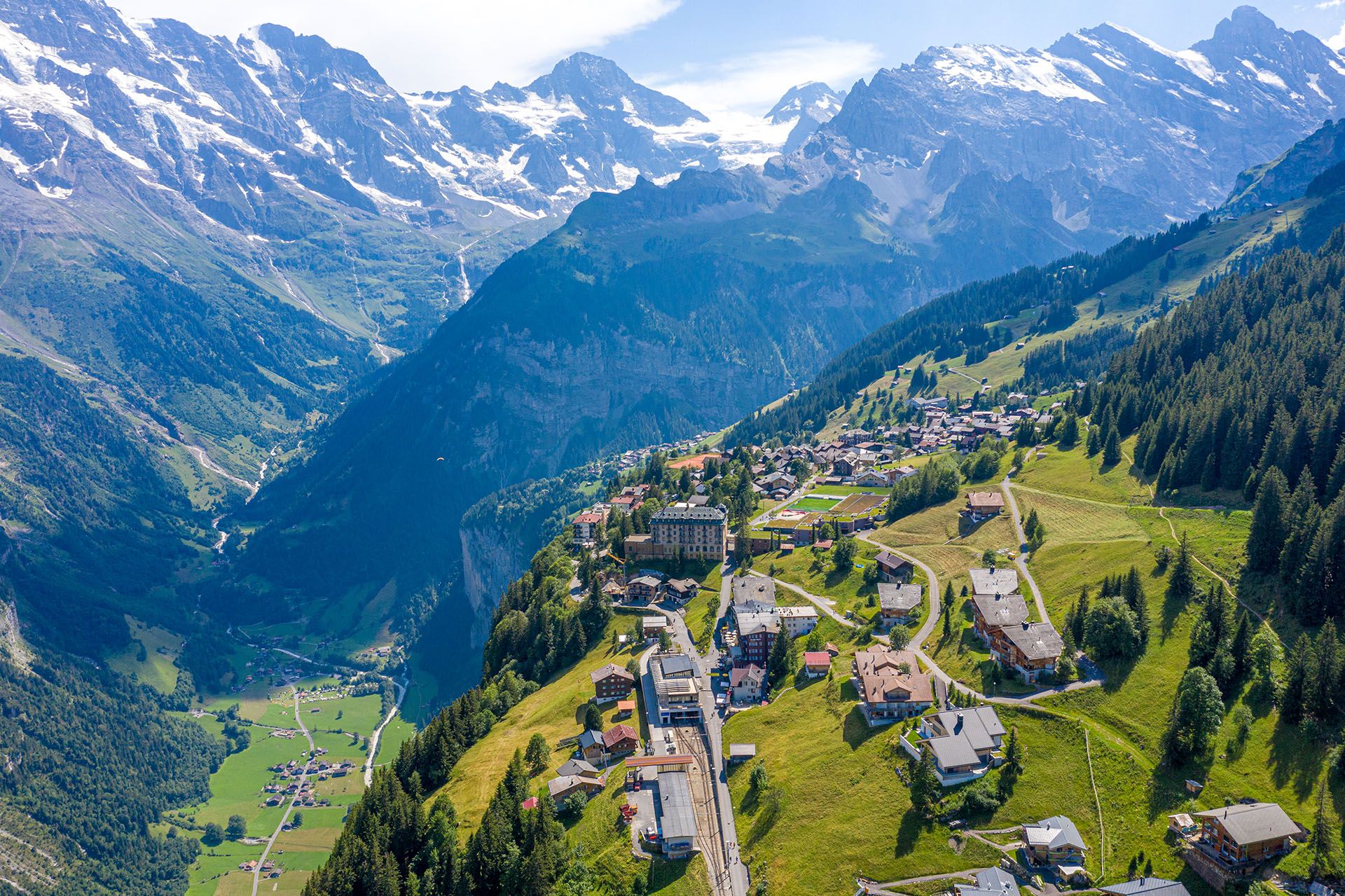
Amazing aerial view over the village of Murren in the Swiss Alps © 4kclips/Shutterstock
Best areas to visit
Each region of Switzerland has its own unique charm and activities.
Interlaken and the Jungfrau region
Nestled between Lake Thun and Lake Brienz, Interlaken is a gateway to the Jungfrau region . Adventure seekers can enjoy paragliding, skydiving, and hiking in the surrounding Bernese Oberland mountains.
Zermatt and Valais
Imagine a car-free Alpine village with the Matterhorn as its backdrop – that’s Zermatt . Skiing, hiking, and luxury resorts are the name of the game here. Hop on the Gornergrat Railway for jaw-dropping views of the Matterhorn and its Alpine companions. It’s worth the journey, trust us.
Lugano and Ticino
Ticino’s Italian-speaking gem, Lugano, is where Swiss precision meets Mediterranean flair. Here you’ll find palm-lined promenades, cute cafés by the water, and a buzzing cultural scene. Don’t miss relaxing at Parco Ciani or a boat ride on Lake Lugano – pure bliss.
Gruyeres and Fribourg
Gruyères is straight out of a fairy tale with its medieval castle and cheese factory tours. Wander the cobblestone streets, try local delicacies like fondue, and dive into surreal art at the HR Giger Museum in nearby Fribourg.
Gornergrat and the Swiss Alps
Gornergrat , accessed by the Gornergrat Railway from Zermatt, serves up jaw-dropping panoramas of the Monte Rosa massif and Gorner Glacier. Hike among alpine flowers or geek out at the Gornergrat Observatory – the stars here are seriously bright.

High angle view of Klosters in winter, Davos, Grisons, Switzerland © Altrendo Images/Shutterstock
Best lakes to visit
Switzerland's lakes are perfect for relaxing or indulging in outdoor activities . Here are five must-visit lakes:
- Riffelsee : Tucked away in the Swiss Alps near Zermatt, Riffelsee is a photographer’s dream come true. Here you can see the iconic Matterhorn mirrored perfectly in its clear waters. Accessible via the Gornergrat Railway and a short hike, this spot is best enjoyed at sunrise.
- Lake Constance : Bordering Switzerland, Germany, and Austria, Lake Constance is a sprawling beauty surrounded by charming towns. Sail its shimmering waters, cycle through picturesque landscapes, or delve into history at places like Stein am Rhein and the Zeppelin Museum in Friedrichshafen. A leisurely boat cruise is the perfect way to explore its shores.
- Lake Lucerne : Surrounded by stunning mountain scenery, Lake Lucerne is ideal for boat trips, swimming, and hiking. The nearby town of Lucerne features the famous Chapel Bridge and Water Tower. You can also take a paddle steamer across the lake or ride the world’s steepest cogwheel railway up Mount Pilatus.
- Lake Thun : Turquoise waters and medieval castles define Lake Thun in the Bernese Oberland. Sail across its tranquil surface, feel the wind while windsurfing, or delve into local history at Oberhofen Castle and Spiez Castle.
- Lake Geneva : This is one of the largest lakes in Europe. The lakeside city of Montreux is known for its jazz festival, while Geneva offers cosmopolitan charm and the iconic Jet d'Eau. Explore the medieval Château de Chillon, cruise along the lake’s shores, or unwind on its picturesque promenades.

Oberiberg in Switzerland with views on Grosser Mythen peak in background © Michal Stipek/Shutterstock
The next step is find what activities you'll do during your trip, and where you'd like to stay. It's best to book as much as possible in advance.
Major attractions
Switzerland offers a ton of attractions , here are some of our favorite highlights:
Natural sights
Switerland's nature is reason enough to buy tickets to this country. Here are some of the most iconic sights.
- The Matterhorn : Near Zermatt, this iconic mountain peak is a must-see. Whether you’re hiking in the summer or skiing in the winter, the views are unforgettable. Ride the Gornergrat Railway for stunning views or challenge yourself with a hike to the Hörnli Hut.
- Mt. Rigi : Known as the “Queen of the Mountains,” Mt. Rigi offers stunning panoramic views and is accessible by cogwheel train from Vitznau or Arth-Goldau. Enjoy a hike or a leisurely walk and relax in the Rigi Kaltbad mineral baths.
- Creux de Van : This natural rock amphitheater is a geological marvel located in the Jura mountains. Perfect for hiking and wildlife spotting, it's a scenic spot with a 4-kilometer-wide and 160-meter-deep limestone cirque.
- Rhine Falls : Europe's largest waterfall, located near Schaffhausen. Enjoy boat trips that take you close to the falls or visit the nearby medieval Laufen Castle for panoramic views.

Guarda, Lower Engadin, Grisons, Switzerland © Altrendo Images/Shutterstock
Cultural and historical sites
This country is known for its medieval towns, exciting festivals and extensive museums — far more than what we can list here, but here are some of our favorites.
- Stein am Rhein : A charming medieval town known for its well-preserved half-timbered houses and frescoed facades. Stroll through its narrow streets and visit the Hohenklingen Castle for panoramic views.
- Chateau de Chillon : A historic island castle on Lake Geneva near Montreux, offering tours that delve into its fascinating history. Explore its dungeons, towers, and grand halls.
- Abbey Library of Saint Gall : A UNESCO World Heritage site with a stunning Baroque library and rich history. The library houses a collection of medieval texts and beautifully decorated manuscripts.
- Montreux : Famous for its annual jazz festival, Montreux also features beautiful lakeside promenades and the nearby Rochers-de-Naye, where you can enjoy stunning views and visit a marmot zoo.
Unique experiences
Here are some things you truly can only see and do in Switzerland.
- Jungfraujoch Top of Europe : The highest railway station in Europe, offering incredible glacier views and activities like the Ice Palace and the Sphinx Observatory. Accessible via the Jungfrau Railway from Interlaken.
- Lindt Home of Chocolate : Located in Zurich, this attraction is a delight for chocolate lovers, featuring interactive exhibits and tastings. You can watch chocolate being made and enjoy delicious samples.
- St. Moritz : A luxurious resort town known for its winter sports, upscale shopping, and vibrant nightlife. It’s also famous for its annual polo and cricket matches on the frozen lake.

Madonna del Sasso Church over Lago Maggiore lake and swiss Alps mountains, Locarno, Switzerland © Boris Stroujko/Shutterstock
Accommodation
Switzerland is known for it's unique accommodations, and where you stay can really add something to your trip. Here are a few of our favorite places to stay.
- Rustic farmhouses : If you're craving a taste of traditional Swiss living, head to the mountains for cozy stays like Eiger Mürren Swiss Quality Hotel with its stunning Eiger views, or Hotel Silberhorn in Lauterbrunnen, known for its charm and proximity to cascading waterfalls.
- Wellness hotels : For a relaxing retreat, check out places like Beatus Wellness & Spa Hotel on Lake Thun, where you can indulge in luxurious spa treatments with serene lake views. In Zurich, The Dolder Grand is a standout with its world-class spa and impressive art collection.
- Family stays : Traveling with kids? Reka-Feriendorf Wildhaus offers spacious apartments and plenty of activities. For a stay in St. Moritz, Randolins Familienresort provides family-friendly rooms and easy access to outdoor fun.
The best tours
Switzerland offers diverse tours that cater to various interests:
- Train tours : Explore the scenic landscapes on famous routes like the Glacier Express, which travels from Zermatt to St. Moritz, and the Bernina Express, which crosses the Alps from Chur to Tirano in Italy.
- Culinary tours : Delve into Swiss delights with visits to La Gruyère for cheese and chocolate. Tour the Maison Cailler chocolate factory and the Gruyères cheese dairy, and savor a traditional fondue meal – a must for foodies!
- Swiss Alp tours : Experience the majestic Swiss Alps through guided hiking or skiing tours . Discover famous peaks like Eiger, Mönch, and Jungfrau, or hit the slopes in top resorts like Verbier and Zermatt – perfect for outdoor enthusiasts.

Brunnen town, Canton of Schwyz, Switzerland © Andy Faessler/Shutterstock
The best activities
Switzerland is a playground for adventure seekers and culture enthusiasts alike. Here are some top-notch activities to add to your Swiss itinerary
- Cable car on Mt. Pilatus : Soar to new heights on the cable car to Mt. Pilatus and soak in panoramic views of the Swiss Alps. Once at the top, dive into thrilling toboggan runs, scenic hikes, or ride the world's steepest cogwheel railway for even more stunning vistas.
- FIFA World Football Museum : Located in Zurich, this museum is a must-visit for soccer fans, featuring exhibits on the history of the sport, interactive displays, and memorabilia.
- Lake Geneva cruises : Hop aboard a scenic boat cruise and let Lake Geneva's charm sweep you away. Cruises run year-round and offer different themed trips.
- Jungfrau Glacier Palace : Venture to Jungfraujoch and discover the mesmerizing world of the Jungfrau Glacier Palace. Explore ice tunnels adorned with stunning sculptures and marvel at this chilly wonderland carved into the heart of the Alps.
- First cliff walk : Experience the thrill of walking along a suspended walkway with breathtaking views of the mountains in Grindelwald. The cliff walk includes a metal bridge and a glass platform.

Switzerland © Swiss Tourism
With your budget decided, and with lots of inspiration of what you want to see and do, the next step is to pull together the final details.
How many days do you need in Switzerland?
The ideal duration for your Swiss escapade depends on what catches your eye and how much time you have to spare. For a more in depth look, see our guide on how many days you should spend in Switzerland .
- Short trip (5-7 days) : Focus on major cities like Zurich, Lucerne, and Bern, with day trips to nearby attractions such as Mount Pilatus or the Rhine Falls.
- Medium trip (7-10 days) : Explore cities along with iconic regions like Interlaken, Zermatt, or Lugano. This allows time for outdoor activities, cultural experiences, and scenic train rides.
- Extended trip (10 days or more) : Dive deeper into Switzerland's diverse regions, including lesser-known towns like Montreux, Lausanne, or the Engadine Valley. This duration allows for a more relaxed pace and additional excursions.

Richetlipass in the Glarnerland, Switzerland © Ganz Twins/Shutterstock
How to spend 5 days in Switzerland
On this five day itinerary , you’ll begin in Lake Como. Visit highlights like Villa del Balbianello, the Duomo of Como, Basilica of Sant’Abbondio, Museum Moto Guzzi, and the Botanic Gardens.
On day two , drive to Zermatt (about 4 hours) to check into your hotel, and take a cable car up to the stunning Matterhorn Glacier Paradise at 3,883 meters. Spend the afternoon exploring Zermatt, shopping and eating local cuisine. On the third day , choose between a scenic walk or a mountain bike tour around the five lakes near Zermatt.
Day four takes you to Lucerne, where you’ll visit Mt. Pilatus, enjoy its attractions and hiking trails, and treat yourself to an exclusive chocolate tasting. Spend some leisure time exploring Lucerne before concluding your journey on day five with a transfer from Lucerne to Zurich. Book this trip .
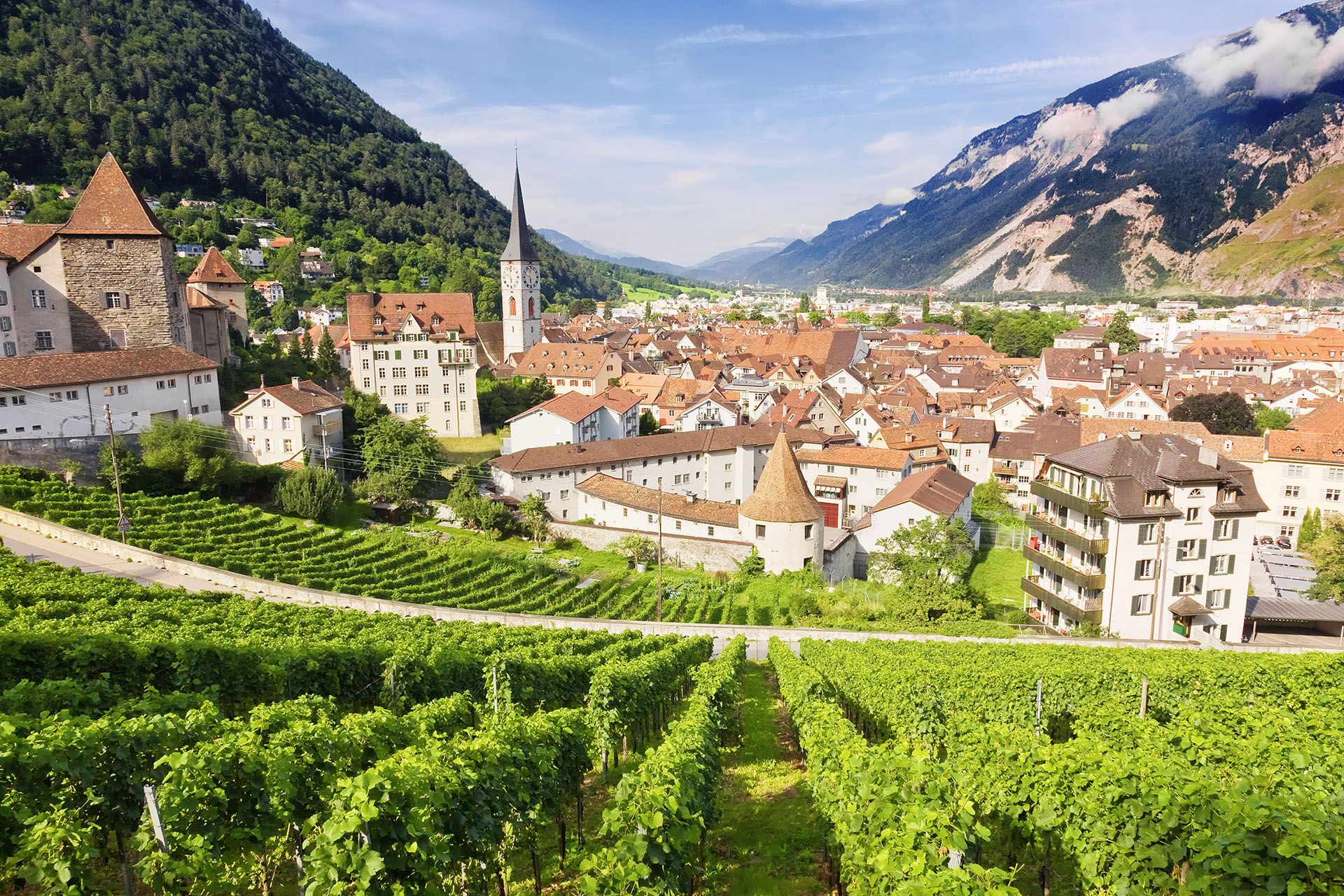
Swiss town Chur, vineyards and Alps mountains © Avatar_023/Shutterstock
How to spend 7 days in Switzerland
This week-long itinerary begins in Zurich, where you'll check in and have some leisure time. The next day , take a day trip to Lucerne for the Mt. Pilatus Golden Round Trip, featuring a cogwheel train, cable car, and panorama gondolas.
On day two , head from Zurich to Grindelwald via Interlaken, and visit Jungfraujoch, the 'Top of Europe', accessed by cogwheel train with stops at the Glacier Palace, Sphinx, and lookout platforms.
Take a scenic hike on day three to Bachalpsee and thrilling experiences on the First Cliff Walk, First Flyer, and First Glider. On the fourth day , transfer to Zermatt from Grindelwald, check in, and take a cable car to Matterhorn Glacier Paradise or Sunnegga. Then, transfer to Montreux for a tour of Chillon Castle. Spend day five wine tasting at Vinorama in Lavaux.
On day six , move on to La Gruyere, visiting the Cailler chocolate factory, cheese production in Pringy, Gruyeres medieval town, and the HR Giger Museum. Return to Lausanne for a Swiss fondue dinner. Conclude on day seven with a transfer to Geneva. Book this trip .

Old town of Ascona on Lago Maggiore lake, Locarno, Switzerland © Boris Stroujko/Shutterstock
How to spend 10 days in Switzerland
With ten days to spend in Switzerland, you have the chance to see even more of Switzerland. This itinerary starts on day one with a scenic train to Zurich where you will explore Bahnhofstrasse, Lake Zurich, St. Peter’s Church, and the Zurichberg district.
Day two includes a trip to Rhine Falls, Stein am Rhein, and the Abbey Library in St. Gallen. On the third day , you’ll travel by train to Interlaken for some leisure time. Day four features an excursion to Jungfraujoch, with a cogwheel train and Eiger Express ride, visiting the Sphinx Observatory and Aletsch Glacier.
En route to Lausanne on day five , explore Bern’s UNESCO Old Town, followed by leisure time in Lausanne. On day six , visit Chillon Castle in Montreux before a scenic train journey to Zermatt for more leisure.
Day seven takes you up to Matterhorn Glacier Paradise by cable car. On day eight , experience the iconic Glacier Express journey to St. Moritz, optionally in Excellence Class.
On day nine , transfer to Lucerne, including visits to Chapel Bridge, the Water Tower, Musegg Wall, Jesuit Church, Lion Monument, and KKL Culture and Convention Center. Book this trip .

Saentis (Santis) on the hiking path in summer, Canton of Appenzell, Switzerland © Peter Stein/Shutterstock
How to spend 14 days in Switzerland
With two weeks , you’ll have the opportunity to explore not just Switzerland but northern Italy as well.
This itinerary starts in Zurich with a visit to the Lindt Home of Chocolate upon arrival. On day two , take a scenic tour to Rhine Falls and Stein am Rhein. Head south on day three to Interlaken for a summer kayak tour on Lake Brienz.
Day four features a thrilling visit to Schilthorn and Piz Gloria’s renowned Thrill Walk. Continue to Mürren on day five for a guided Panoramic Via Ferrata and paragliding in Grindelwald.
Transition to Lucerne on day six for a Night Watchman Walk, and visit Mount Rigi on day seven , with a cogwheel train descent and boat cruise on Lake of the Four Cantons. Day eight brings a train journey to Lugano, where you'll visit a local wine and honey producer.
Day nine includes a guided walking tour of Gandria, a boat cruise on Lake Lugano, and an excursion to Monte Brè. Travel to Lake Como on day ten for a private tour, followed by exploration of Lago Maggiore and the Borromean Islands on day eleven.
Journey to Milan on day twelve for a Last Supper City Tour and Duomo exploration. Day thirteen offers a gelato and pizza making class, with free time to discover Milan on day fourteen . Book this trip .

Appenzell, Appenzellerland, Switzerland © Sina Ettmer Photography/Shutterstock
With your itinerary penciled in, all you need to do is pack and arrive.
Look for airport transfers
Zurich Airport has direct train connections to Zurich city center (Zurich Hauptbahnhof) via the Zurich Airport Railway Station (Zurich Flughafen). Trains are frequent and run approximately every 10-15 minutes. Geneva Airport is also well-connected by train with regular services to Geneva city center (Gare Cornavin).
For a door-to-door option, many airports in Switzerland offer shuttle services operated by private companies or hotels. These shuttles can take you directly to your accommodation or designated drop-off points in major cities.
What to pack
Switzerland’s weather can vary, so it’s wise to pack smartly with versatile clothing suitable for the ever fluctuating conditions. Layering is key to adapting to temperature changes throughout the day and between different regions.
Don’t forget to bring comfortable walking shoes, ideal for exploring cities on foot or venturing out on scenic hikes amidst Switzerland’s breathtaking landscapes.
Even if it's cool, the sun in the Alps can be intense. Don't forget to pack sunglasses, a hat, and sunscreen to protect yourself from UV rays.

Typical sales of huge chocolate bars at the store in Lugano. Famous Swiss chocolate on sale © KelaVi/Shutterstock
Arguably, above all else, this is our most important tip.
Don't over plan
Resist the urge to over plan your Swiss trip. While it’s tempting to schedule every minute, leave space for spontaneity and delightful surprises. There are some things in this country that can only be found in leisurely strolls through charming towns or along lakeshores.
Take time to try a Swiss pastry at a cozy café or join a spur-of-the-moment guided tour that catches your eye. Some of your best memories might come from these unplanned, organic experiences.
Plan some free days
The best itineraries are one that build in some free days. This allows you to be more flexible if for example, the weather doesn’t cooperate. But more than that, it allows you time to relax, find hidden gems, or revisit your favorite places.
When it comes to exploring Switzerland, why not let local travel experts tailor your journey for an authentic experience? Here's why choosing a tailor-made trip makes all the difference:
- Personalized itineraries: Picture each day of your trip designed around your interests—whether you're into scenic hikes, Swiss cuisine, or discovering historical gems, we’ve got you covered. Expect a journey that's uniquely yours.
- Insider knowledge: Local experts know the hidden spots and authentic experiences that often escape typical tourists. From charming mountain villages to the best spots for indulging in local delicacies, they'll take you beyond the obvious.
- Efficient planning: Navigating a foreign country can be daunting, but with local experts handling everything from transportation to accommodations, you can relax and enjoy Switzerland's beauty and culture without the stress.
- Cultural immersion: Dive deep into Swiss culture with insider tips on local traditions, seasonal festivals, and community events. It's the best way to truly understand and appreciate Switzerland's rich heritage.
- Support and safety: Traveling with local experts means having someone to turn to for advice and assistance, ensuring your journey is smooth and safe from start to finish, with support 24/7.
In short, a trip curated by local travel experts turns your Swiss vacation into a memorable, hassle-free adventure filled with authentic experiences. Ready to explore Switzerland like a local? See our existing Swiss trips for inspiration.
Dre Roelandt is originally from the United States but lives and works in Berlin, Germany. Dre is a freelance writer and artist with a passion for travelling. They are an in-house Content Editor at Rough Guides.
- Authentic Experiences
- Classic Highlights
- Switzerland
- Inspiration
- Travel Advice
- Travel Tips
Planning your own trip? Prepare for your trip
Use Rough Guides' trusted partners for great rates
Travel advice for Switzerland
From travel safety to visa requirements, discover the best tips for traveling to Switzerland
- Geneva travel guide
- Lausanne travel guide
- Zürich travel guide
- Basel Switzerland Travel Guide (2022 update)
- Bern Travel Guide
- Lucerne Travel Guide
- Lake Geneva Travel Guide
- Northeast Switzerland and Liechtenstein Travel Guide
- Sports and outdoor activities in Switzerland
- Bernese Oberland travel guide
- Jungfrau Region travel guide
- Valais travel guide
- Graubünden Travel Guide
- Zermatt and the Matterhorn travel guide
- Central Switzerland Travel Guide
- Ticino Travel Guide
- Best accommodation in Switzerland
- How to get to Switzerland
- Culture and Etiquette in Switzerland
- Eating and drinking in Switzerland
- Getting around Switzerland
- Switzerland travel tips
- Best time to visit Switzerland
- Festivals in Switzerland
Find even more inspiration for 51 here

Ready to travel and discover Switzerland?
Get support from our local experts for stress-free planning & worry-free travels.
- Where to stay
- Travel advice
- Itineraries

IMAGES
VIDEO
COMMENTS
Geneva will be a better choice compared to Zurich for visitors and couples looking to relax. It boasts a lovely, relaxing setting on Lake Geneva, close to Vevey and Montreux, as well as spectacular views of the Swiss Alps. The Lavaux Wine Terraces, for example, is also a good place to visit while in Geneva.
Zurich: The Activities. Just like Geneva, Zurich has a beautiful Old Town area to check out. There are lots of pretty churches in this part of the city, like the famed Fraumunster, the Romanesque Grossmunster, and the Gothic Predigerkirche. While here, be sure to check out the Niederdorf, home of galleries, restaurants, and fancy boutiques.
Although neither are the nation's capital, Zurich and Geneva are two of the most common destinations for visitors in Switzerland. In general, Geneva can be a good choice for those looking for a lively, international city to visit that may be slightly more affordable. On the other hand, Zurich is great for those looking for a typically ...
The cities' proximity to famous train rides. For most of Switzerland's famous scenic trains, Zurich is a bit more convenient than Geneva. For example, travel times from Zurich are shorter to: Zermatt and St. Moritz, between which the Glacier Express runs. Chur, where the Bernina Express starts.
The amount of time needed to visit Zurich is similar to Geneva. You can do the city in 2 days, but to do all the city and some of the surroundings, 4 days is best. Being a larger city than Geneva, to see all Zurich has to offer might take 3 days and then you can spend one day exploring the lake or the local mountains.
7. Lake Geneva is bigger then lake Zurich. Lake Geneva, or Lac Léman, is far bigger than Lake Zurich. In fact, Lake Geneva is one of the biggest in Europe. All along the shores of Lake Geneva, you'll be able to gaze in awe at the Alps in the distance and indulge in some water sports during the summer months. 8.
Like Geneva, Zurich offers numerous direct flight options from the UK, with a similar flight duration of about 1.5 to 2 hours from London. ... It covers unlimited travel in Switzerland by train, bus, boat, and public transportation. Plus, you get access to discounts of up to 50% on many mountain excursions and free entrance to over 500 museums.
Top things to do in Geneva. Walk the water's edge at Lake Geneva Top of the list has to be Lake Geneva (the largest freshwater lake in Switzerland) and its signature attraction, the colossal water jet (Jet d'Eau) that shoots vast quantities of water skywards to a height of 140 metres. Explore Geneva's old town There is a lot to see and do in Geneva's most historically interesting area ...
Paris, France to Zurich: 6 hours (approx) Milan, Italy to Zurich: 4 hours (approx) Brussels, Belgium to Zurich: 6 hours 40 mins (approx) Bern to Zurich: 1 hour 45 min (approx) Geneva to Zurich: 3 hours 45 min (approx) Note: Find out exact travel times on Google Maps.
Geneva is the 2 nd largest city in Switzerland with just over 200,000 residents. Most of Switzerland speaks German but since Geneva is so close to France, most of the locals speak French as their main language. Geneva is often referred to as the "Peace Capital" of the world because it hosts the most international organizations in the world. The United Nations and the Red Cross both have ...
Neither Geneva nor Zurich are tourist paradises. The rivers and lakes that run through each figure heavily into their appeal. Zurich's Grossmünster and Fraumünster churches sit on either sit of the River Limmat, which empties into Lake Zurich, a favorite place for sunbathers and pot smokers.In Geneva, meanwhile, you can marvel at La Jonction between the Rhône and Arve Rivers, or admire ...
As a US passport holder, you can travel to Geneva or Zurich for stays of up to 90 days without a visa. General Tips. Zurich and Geneva frown at littering. English isn't an official language in any of the cities. While it's common to find English-speakers, French and German are the predominant languages in Geneva and Zurich, respectively.
DAY 1: Geneva. DAY 2: Bern. DAY 3: Zermatt. DAY 4: Jungfraujoch & Interlaken. Day 5: Lucerne. DAY 6: Mt Pilatus. DAY 7: Zurich. Buy the ad-free PDF version of this Switzerland itinerary for offline use →. Planning a Switzerland itinerary: Things to know.
Itinerary across all of Switzerland from Lake Geneva to Lake Constance in eight days. Reiseroute 9: Genf - Lausanne - Bern - Schaffhausen - St. Gallen - Rapperswil - Zürich. Highlights on this itinerary: Discover the charming towns of Nyon, Lausanne and Montreux on Lake Geneva.
German speaking Zurich is the largest city in Switzerland. It's also a world capital when it comes to finance and banking. It's currently ranked as the city with the best quality of life in the world. Zurich has Alpine views, just like Geneva. As well as being famed for banking and finance, it's one of Switzlerand's cultural hubs.
4 years ago. In general, Zurich airport is surrounded by other Swiss Cantons, while Geneva has France on 3 sides. So Geneva can be used as a starting point.. Based on your itinerary wishes, Milan MXP can be an alternative. In practice, I prefer Zurich for efficiency. Report inappropriate content. Roland.
Geneva is the 2 nd largest city in Switzerland with just over 200,000 residents. Most of Switzerland speaks German but since Geneva is so close to France, most of the locals speak French as their main language. Geneva is often referred to as the "Peace Capital" of the world because it hosts the most international organizations in the world. The United Nations and the Red Cross both have ...
09/14/23 12:26 PM. 8585 posts. There are trains from Luzern to the Zurich airport rail station, a bit over 1 hour. Zurich and Geneva are both OK, but Luzern is better. Posted by Kathy. Kansas City. 09/15/23 06:44 AM. 270 posts. Between the two, I would favor Zürich because it IS more walkable.
In the autumn, Zurich often gets around the same amount of sunshine as Geneva. Zurich gets 120 hours of sunny skies this time of year, while Geneva receives 127 hours of full sun. Zurich usually gets less rain in October than Geneva. Zurich gets 70 mm (2.8 in) of rain, while Geneva receives 78 mm (3.1 in) of rain this time of the year.
I've been to both twice. I think Geneva is much more interesting from history and culture standpoint. Zurich is OK, but very business/banking oriented. However you can find great scenic destinations easily reachable by train from either. Posted by Rosalyn. Portland. 12/01/13 10:04 AM. 3614 posts.
I think Geneva has the edge on museums. They are about the same on lake access and sheer beauty of the towns. Zürich defintely has the edge for nightlife. Geneva has the best Indian restaurant in the country (Rasoï at the Mandarin Oriental). . Both are Protestant and both played a leading role in the Reformation.
Zurich Airport has direct train connections to Zurich city center (Zurich Hauptbahnhof) via the Zurich Airport Railway Station (Zurich Flughafen). Trains are frequent and run approximately every 10-15 minutes. Geneva Airport is also well-connected by train with regular services to Geneva city center (Gare Cornavin).
I'm visiting Switzerland in a couple weeks, finally got a hold of a digital copy of the related travel book by a well-known public television travel expert with two first names, and I was surprised to see he recommends skipping Geneva entirely, in favor of Lausanne or Gruyeres instead. Any thoughts/counter-opinions? Geneva (actually like most ...
Zurich on the other hand feels more Swiss. It's cleaner and safer and has more "big city" vibes than Geneva for sure. People are maybe a bit more conservative than in Geneva where the general attitude is more laid back. Zurich seems to developed more as well Eg. The development of Kreis 5 and Altstetten.
Much of the rest of the top 10 was taken up by Swiss cities, with Zurich, Geneva, Basel and Bern coming in third, fourth, fifth and sixth place respectively. Rising housing costs